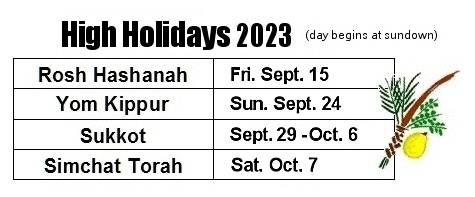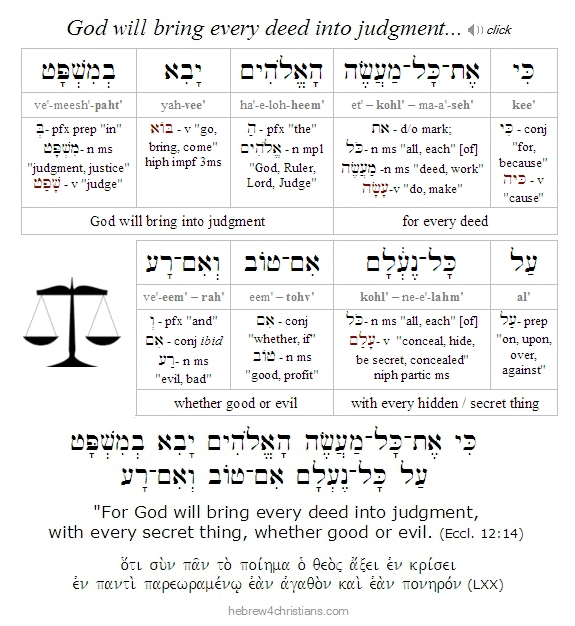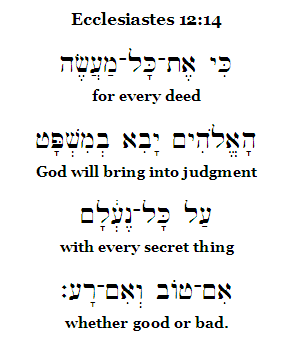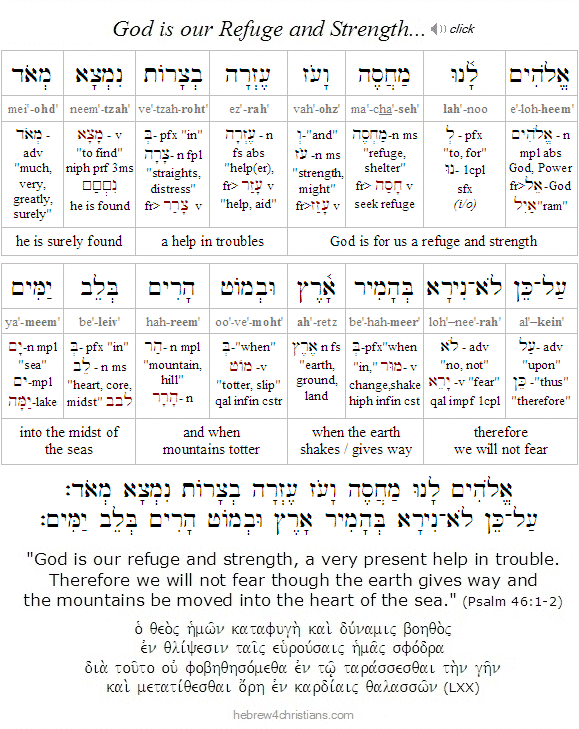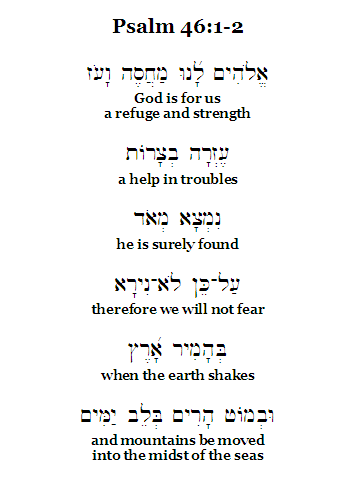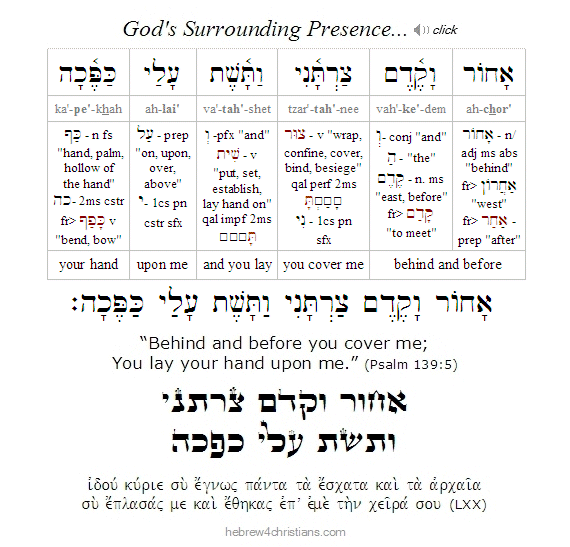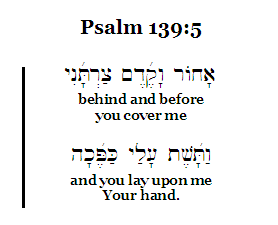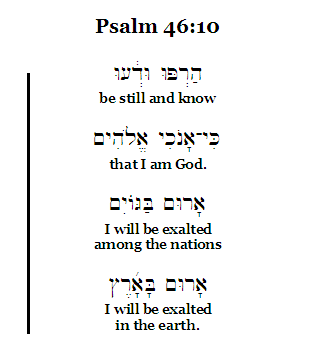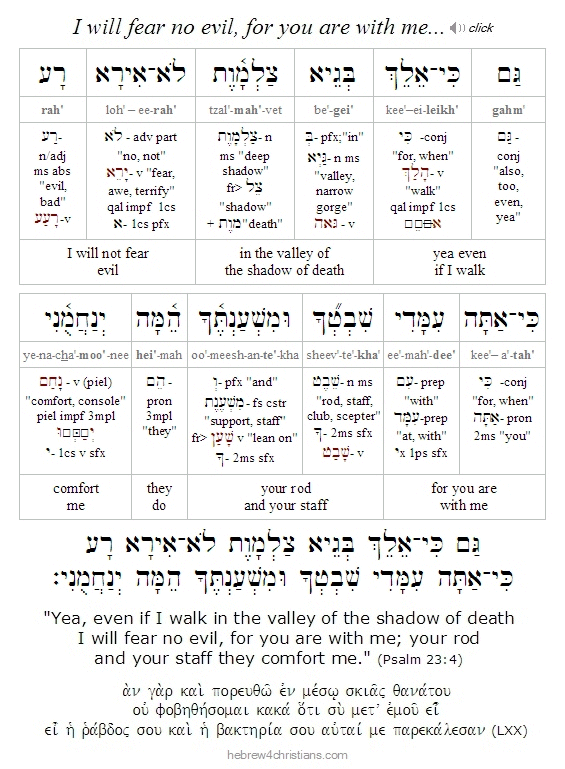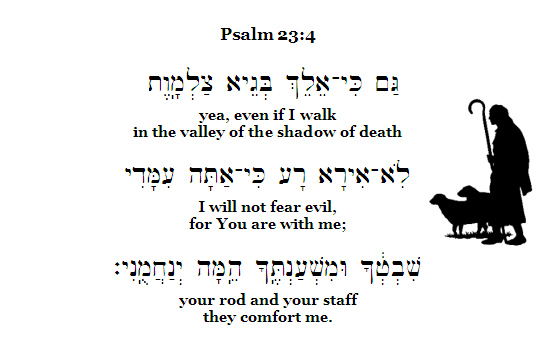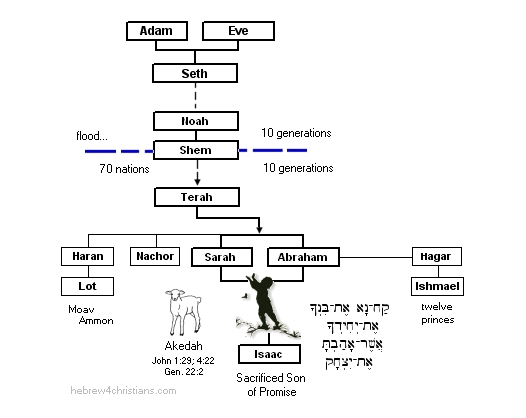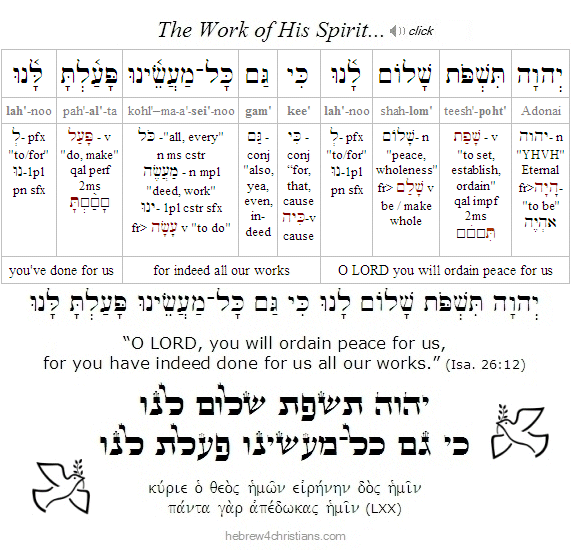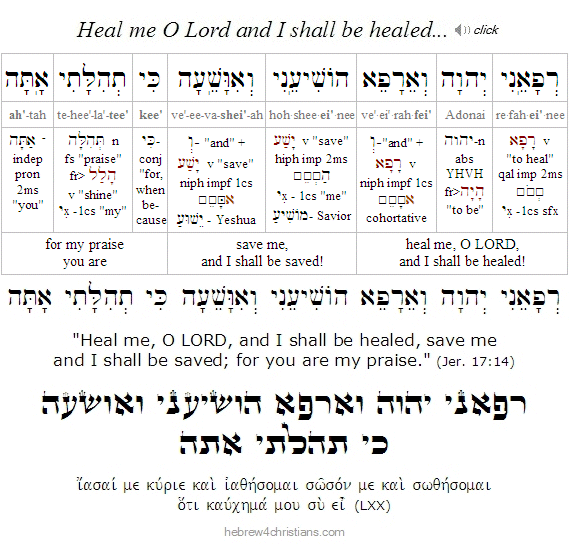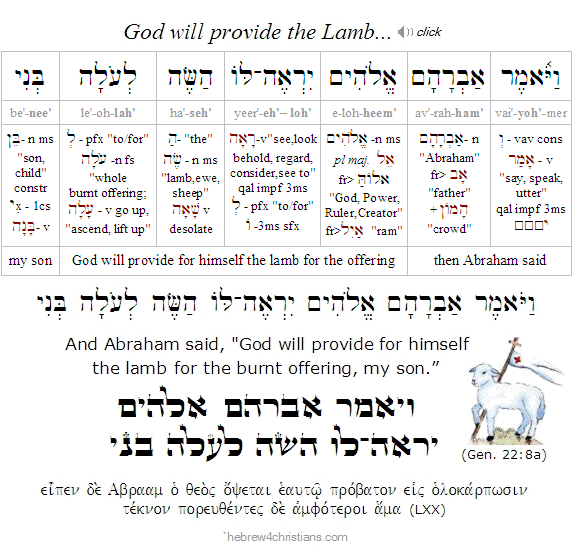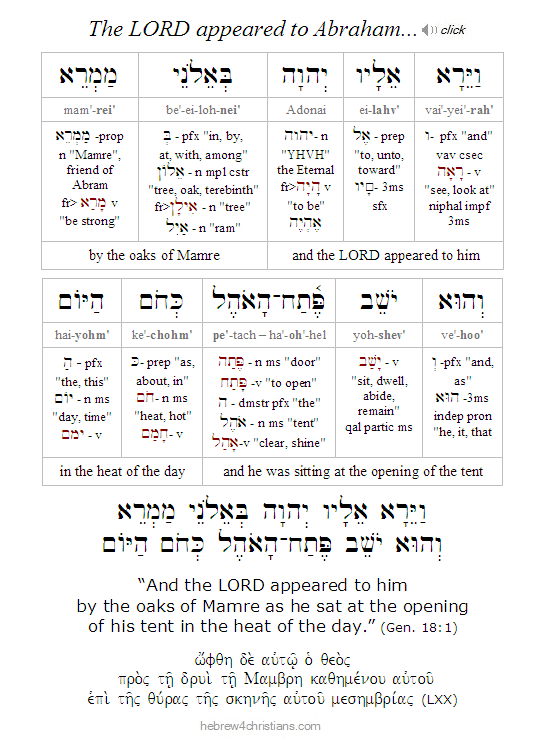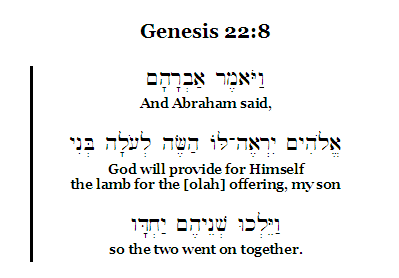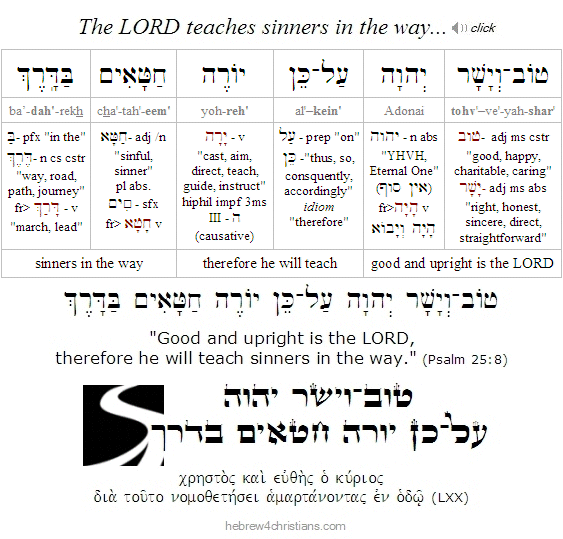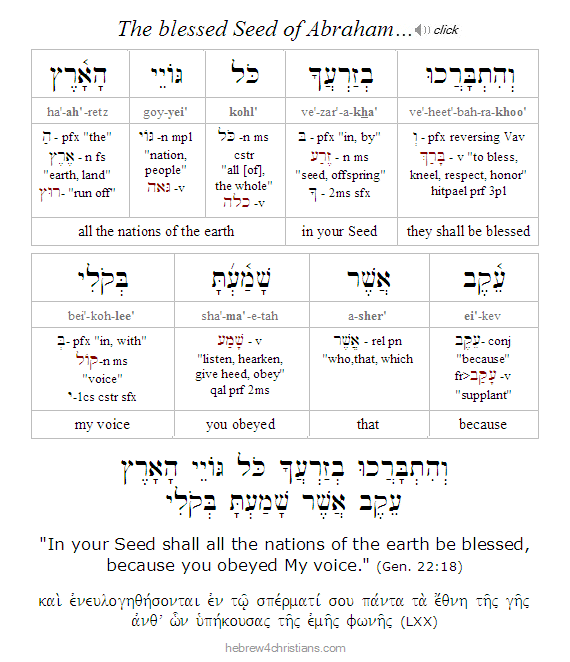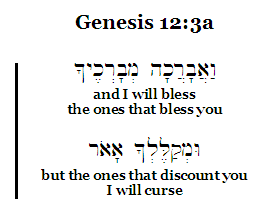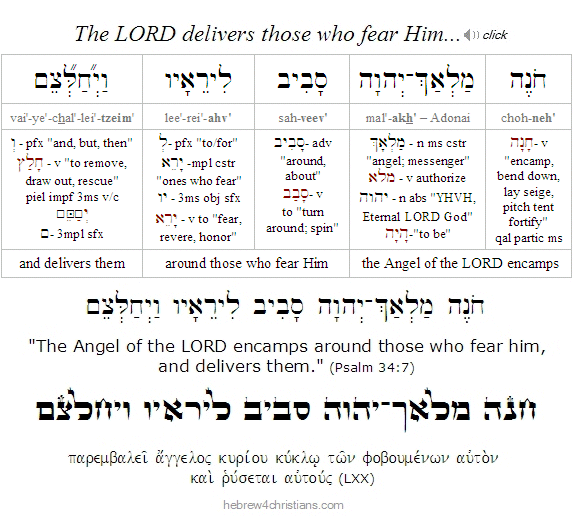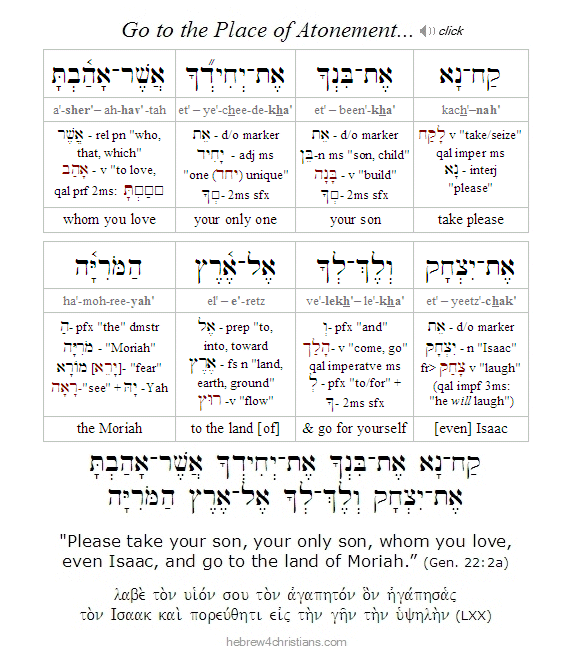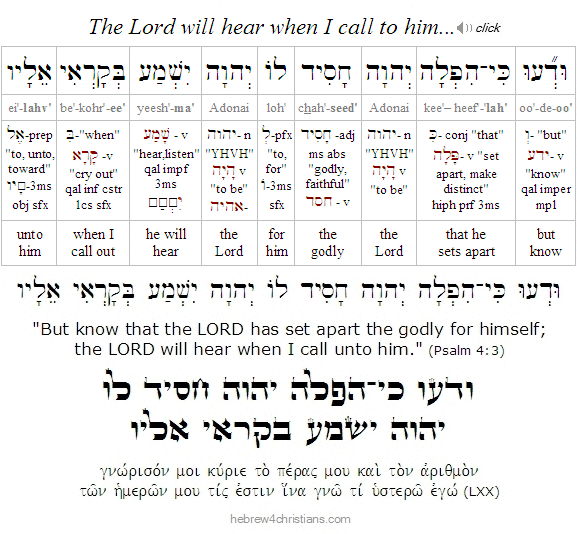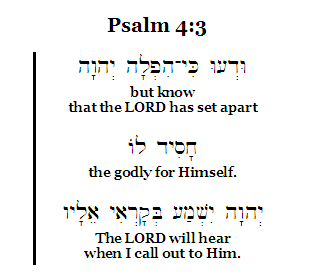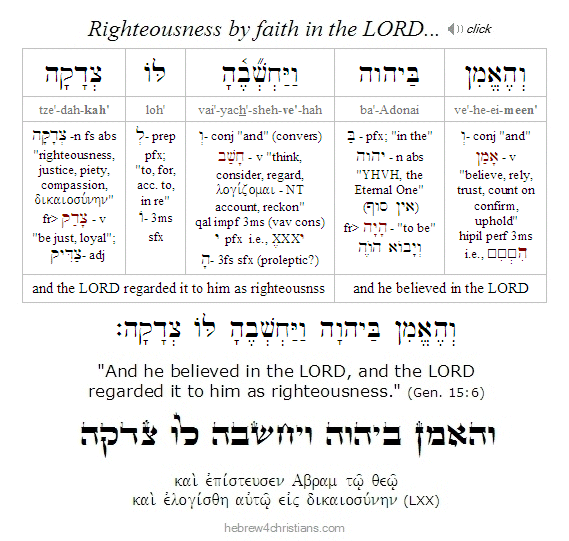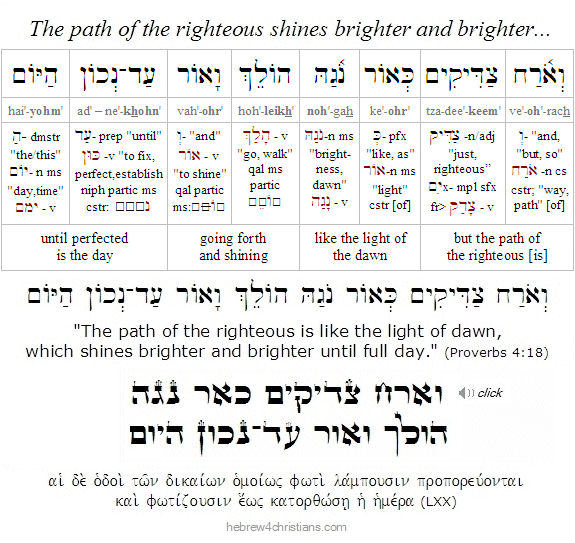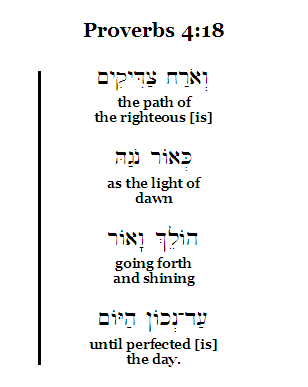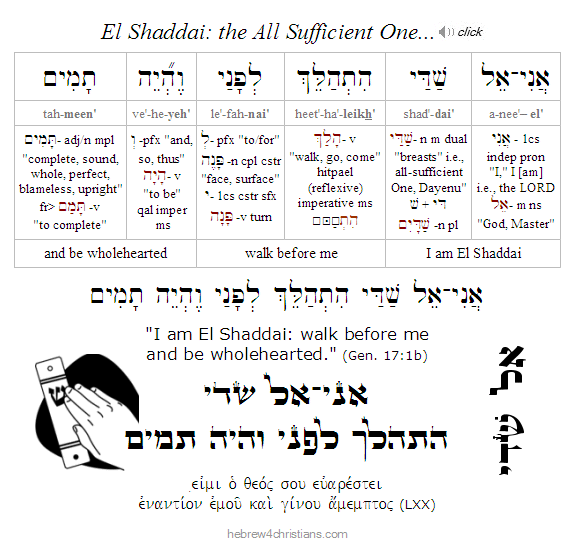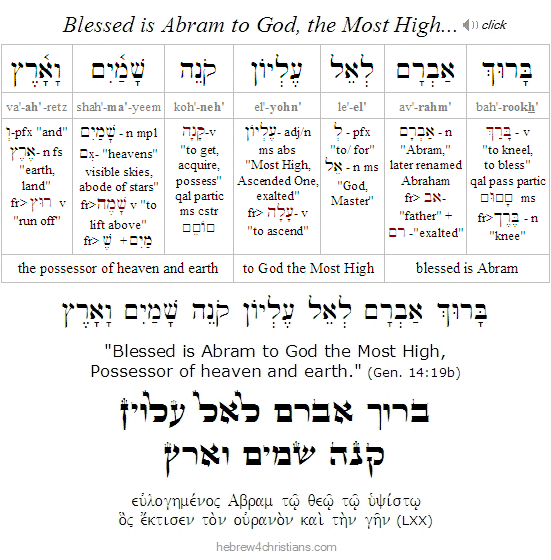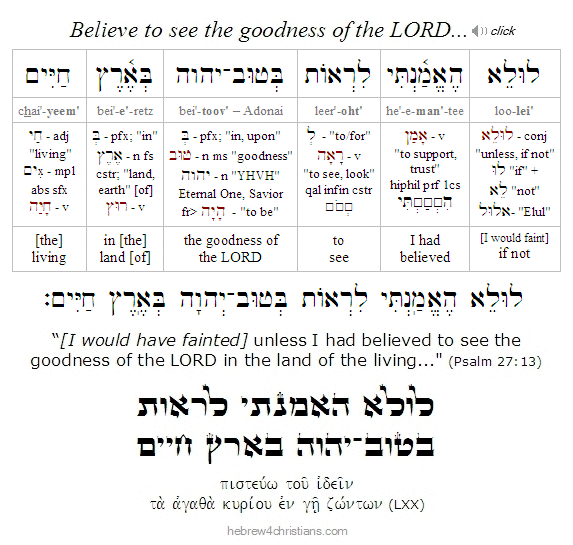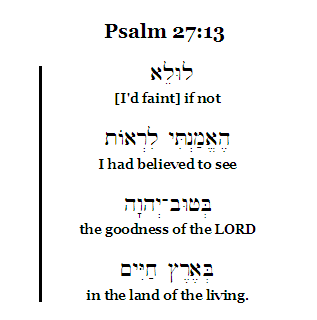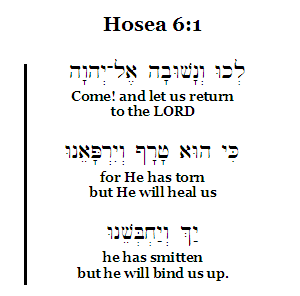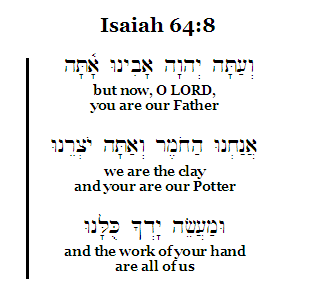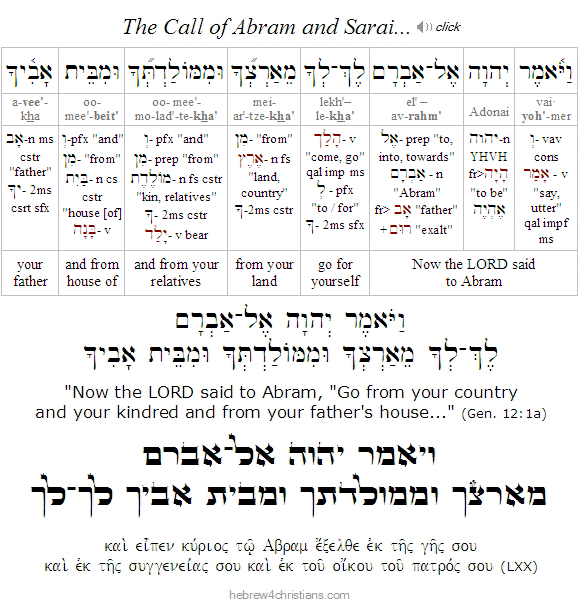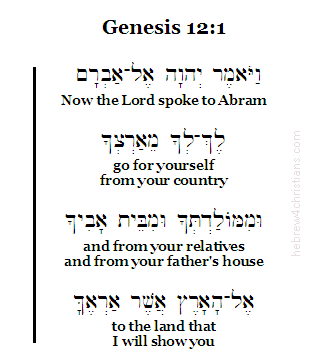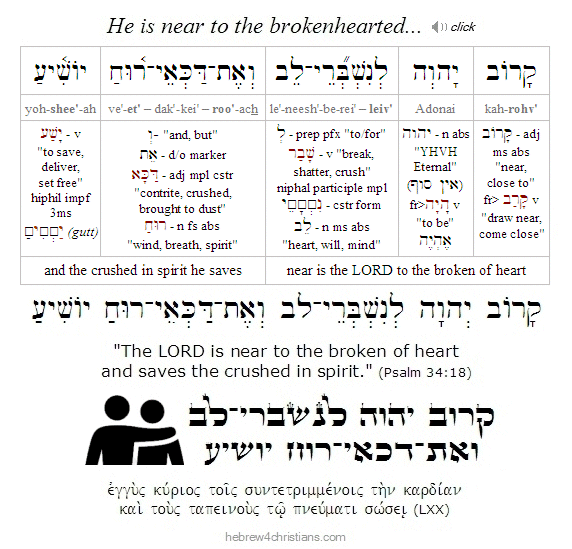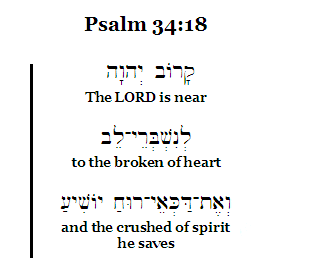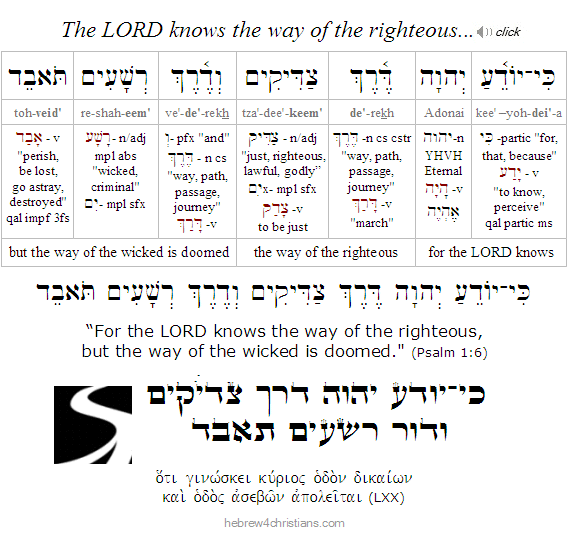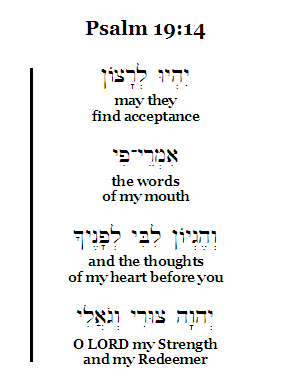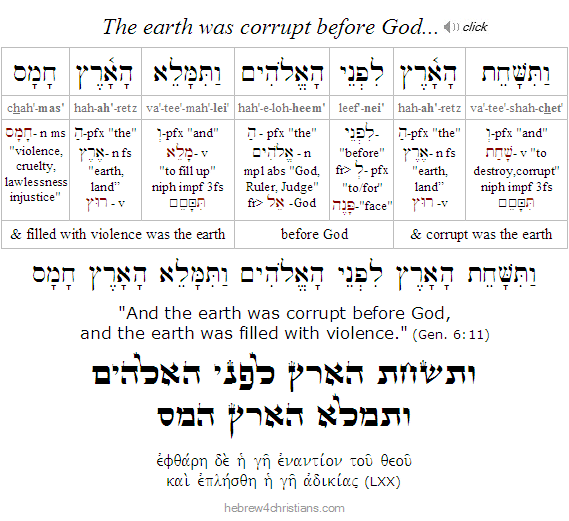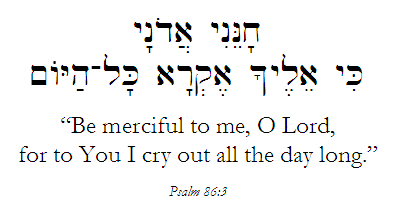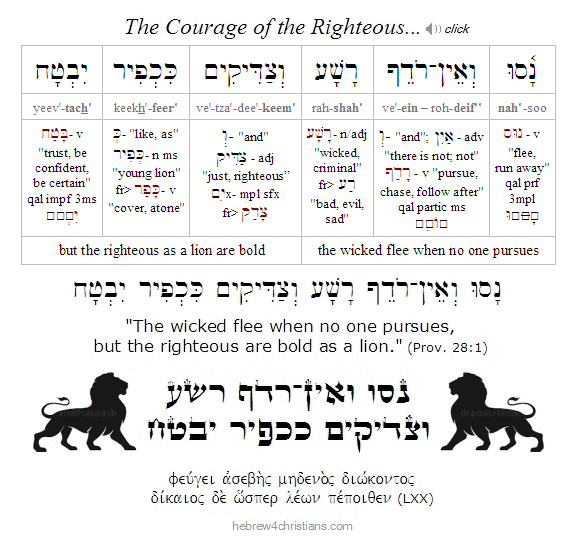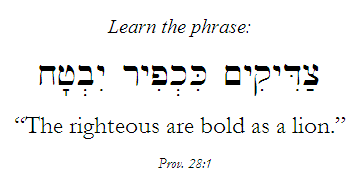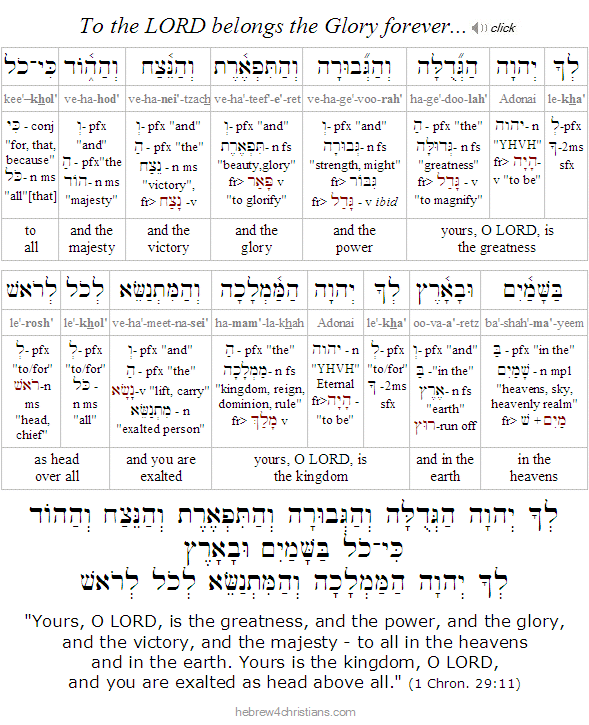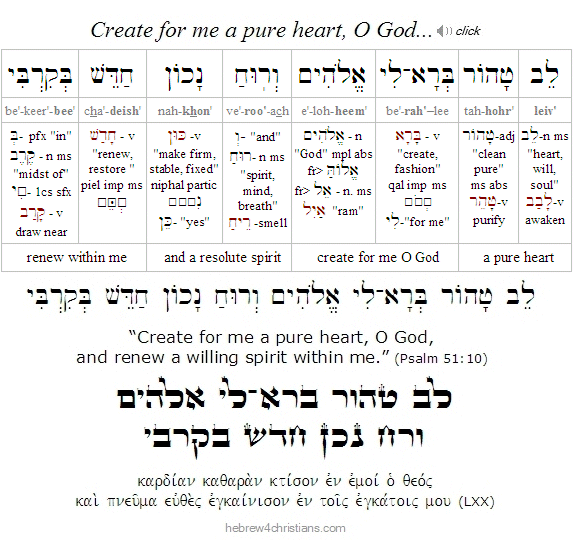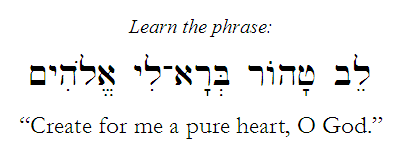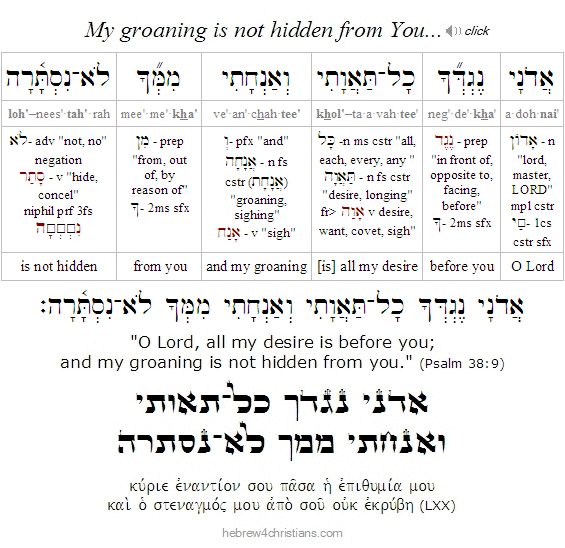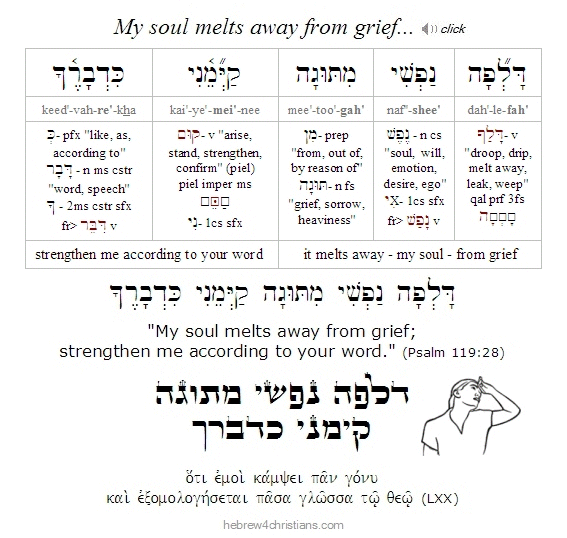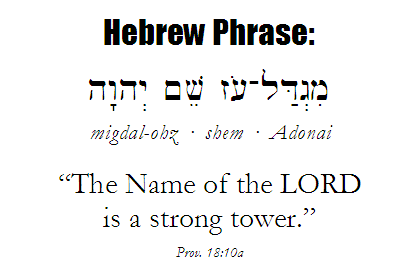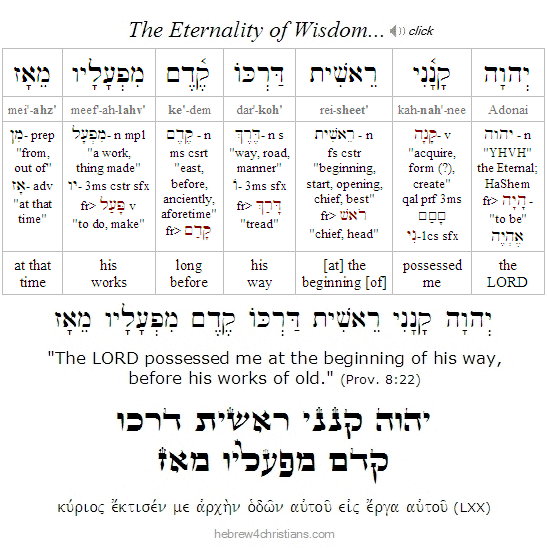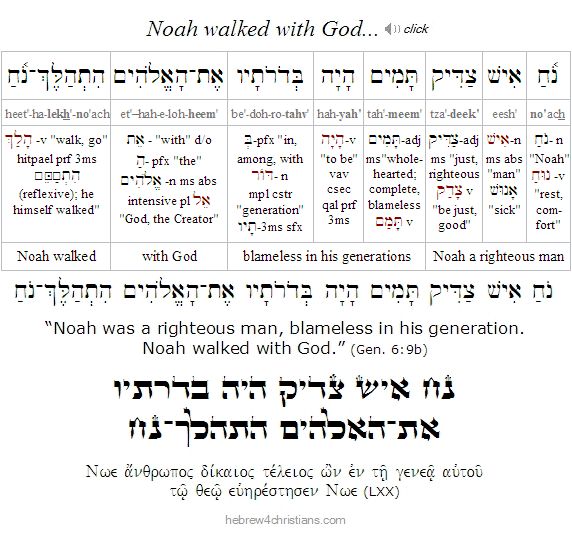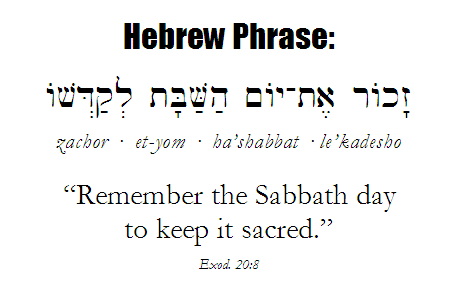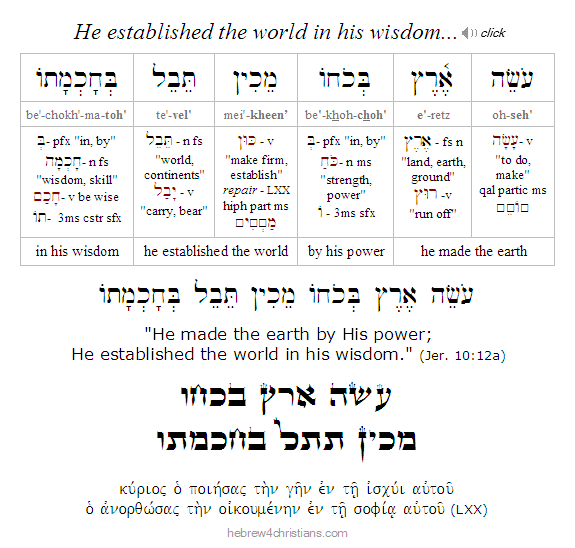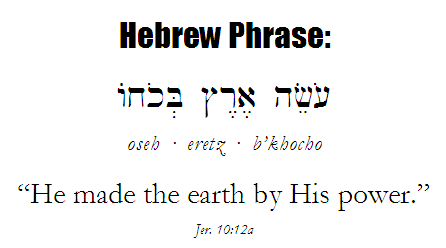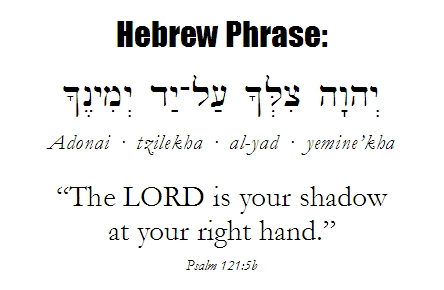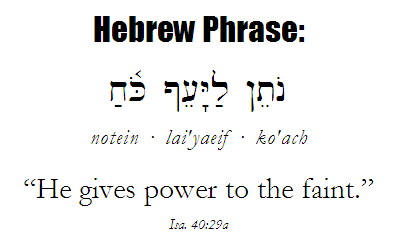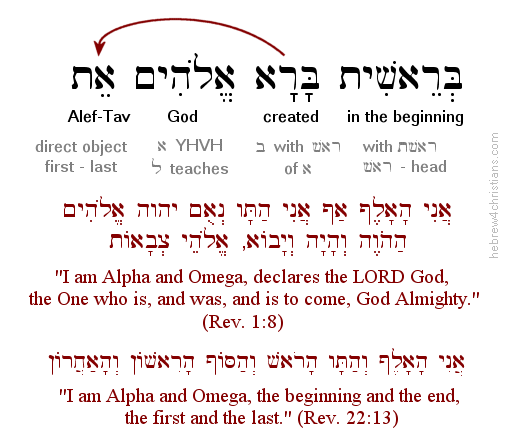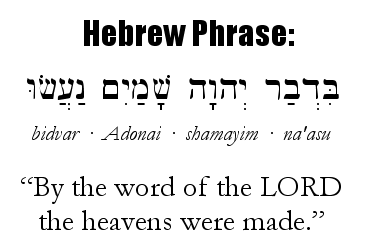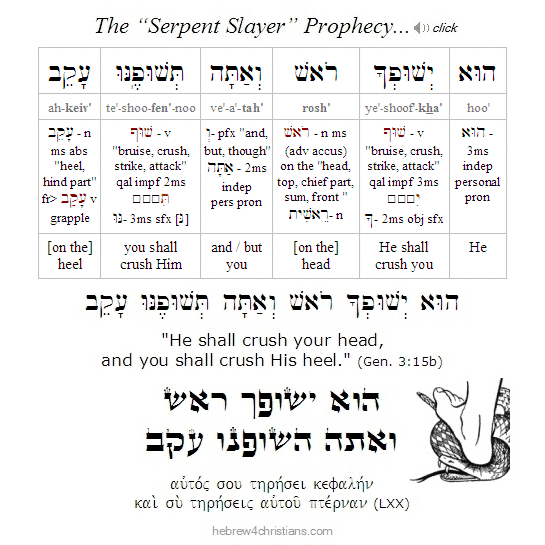|
Jewish Holiday Calendar
For October 2023 site updates, please scroll past this entry....
The Torah divides the calendar into two symmetrical halves: the Spring and the Fall, indicating the two advents of Messiah. The Biblical year officially begins during the month of the Passover from Egypt (called Rosh Chodashim, see Exod. 12:2), and the spring holidays of Passover, Unleavened Bread, and Firstfruits both recall our deliverance from Egypt and also our greater deliverance given by means of the death, burial, and resurrection of the Messiah, the great Passover Lamb of God. Yeshua was crucified on erev Pesach, buried during Unleavened Bread, and was resurrected on Yom Habikkurim (Firstfruits). The holiday of Shavuot (i.e., "Pentecost") both commemorates the revelation of the Torah at Sinai as well as the revelation of the Ruach HaKodesh (Holy Spirit) at Zion, in fulfillment of the promise given by our Lord....
The intermediate months of summer end with the advent of the sixth month of the calendar, called the month of Elul, which recalls the time Moses interceded on behalf of Israel after the sin of the Golden Calf. To commemorate this time of our history, we likewise focus on teshuvah (repentance) in anticipation of Rosh Hashanah and especially in anticipation of Yom Kippur, the great "Day of Atonement." In Jewish tradition the 30 days of Elul are combined with the first ten days of the seventh month (called the "Days of Awe") to set apart "Forty Days of Teshuvah" leading up to the Day of Forgiveness for Israel. Immediately following Yom Kippur, the mood changes as we begin preparing for a joyous week-long celebration called Sukkot (i.e., "Tabernacles") that concludes with the holiday of Simchat Torah.
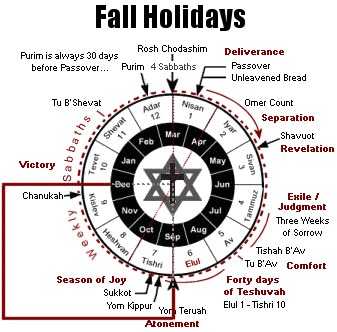 |
The Fall Holidays:

The fall festivals prophetically indicate the Day of the LORD, the second coming of Yeshua, the great national turning of the Jewish people, and the establishment of the reign of the Messiah upon the earth during the Millennial Kingdom in the world to come.
Note that in accordance with tradition, holiday dates begin at sundown. Moreover, some holidays may be postponed one day if they happen to fall on the weekly Sabbath:
1. Month of Tishri (Fri.. Sept. 15th [eve] - Sat. Oct. 14th [day])
3. Month of Cheshvan (Sat. Oct. 14th [eve] - Mon. Nov. 13th [day])
- Four Sabbaths: Noach, Lekh-Lekha, Vayera, Chayei Sarah
- Yom Ha'Aliyah - Honoring Israel's immigrants (Oct. 22nd; Cheshvan 7)
- Sigd - 50th day after Yom Kippur; Ethiopian Jewish holiday (Sun. Nov. 12th)
4. Month of Kislev (Mon. Nov. 13th [eve] - Tues. Dec. 12th [day])
- Four Sabbaths: Toldot, Vayetzei, Vayishlach, Vayeshev
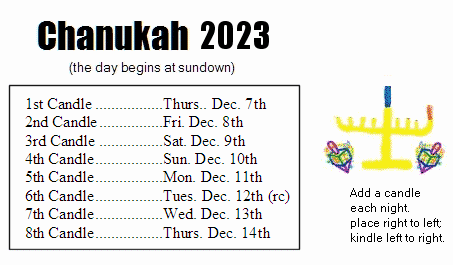
- Dates for Chanukah 2023 (5784):
- 1st Chanukah candle - Thurs. Dec. 7th [i.e., Kislev 25]
- 2nd Chanukah candle - Fri. Dec. 8th [i.e., Kislev 26]
- 3rd Chanukah candle: Sat. Dec. 9th [i.e., Kislev 27]
- 4th Chanukah candle: Sun. Dec. 10th [i.e., Kislev 28]
- 5th Chanukah candle: Mon. Dec. 11th [i.e., Kislev 29]
5. Month of Tevet (Tues. Dec. 12th [eve] - Wed. Jan. 10th [day])
- Four Sabbaths: Miketz, Vayigash, Vayechi, Shemot
- Dates for Chanukah (continued):
- 6th Chanukah candle: Teus. Dec. 12th [i.e., Kislev 30]
- 7th Chanukah candle: Wed. Dec. 13th [i.e., Tevet 1]
- 8th Chanukah candle: Thurs. Dec. 14th [Tevet 2] Zot Chanukah
- Winter Solstice: Wed. Dec. 21st (Tevet 9)
- Christmas - Mon. Dec. 25th (Tevet 13, 5784)
- Asarah B'Tevet - Thurs. Dec. 22nd (dawn), 2023; fast for Jerusalem
- Secular New Year: Mon. Jan. 1st, 2024 (Tevet 20, 5784)
 |
Note: For more about the dates of these holidays see the Calendar pages....
October 2023 Updates
Note: Please refresh the page (or press F5) to see the latest updates...
Extraordinary Ordinary...

[ "One must keep on pointing out that Christianity is a statement which, if false, is of no importance, and, if true, of infinite importance. The one thing it cannot be is moderately important" (C.S. Lewis: God in the Dock). ]
10.31.23 (Cheshvan 16, 5784) It is a sobering glory to understand that life is a miracle and nothing is trivial. In the world to come you will be shocked to understand that everything you thought, everything you said, and everything you did was given to you from above, and therefore has tremendous significance (Matt. 12:36-37). Therefore may it please the Lord to open our hearts and eyes to truly come alive...
If you belong to the Messiah you are not part of this world and its matrix of deception but instead serve the King of Kings (Col. 1:13; Acts 26:18; 1 Pet. 2:9). Therefore set your thoughts on things above, not on things of this world (Col. 3:2). In the end all things born of the lie will be exposed and forever put away from us (Eccl. 12:14). The great Day draws near. "For though the vision awaits its appointed time; it hastens to the end -- it will not lie. If it seems slow, wait for it; it will surely come; it will not delay" (Hab. 2:3). God will bring everything into judgment, with every secret thing, whether it be good or evil, which means that everything will become manifest and declared for what it truly is...
Hebrew Lesson
Ecclesiastes 12:14 reading (click):
Trust in Affliction...

10.31.23 (Cheshvan 16, 5784) Some of us seek "mountain top" experiences of God, but more often than not we learn "down in the valley," where the daily cares of life encroach upon our ideals and visions. Yet it is precisely there, in the "desert of the everyday," in the "testing of the tedious," in the "hazards of hopelessness," that we are enabled to elevate our consciousness to realize that God is "ezra ve'tzarot nimtza me'od" (עֶזְרָה בְצָרוֹת נִמְצָא מְאד) - a "very present help in our troubles" (Psalm 46:1).
Amen, God is aware of our frustration, our lowliness, our fear, our suffering... When God delivered his people by the miracle of splitting the sea (קריעת ים סוף), he closed off any way of escape apart from his direct intervention. The Egyptian army was behind them, the mountains hemmed them in, and the vast horizon of the sea loomed before their way. The only way of deliverance was from above, in the midst of our struggle, by God's own hand. Trust in God's healing and deliverance is the first step... The LORD is the Rock and all his ways are perfect (Deut. 32:4), and this must be affirmed especially if we cannot fathom the testing of our present circumstances...
Hebrew Lesson:
Psalm 46:1-2 Hebrew reading (click):
Surrounding Presence...
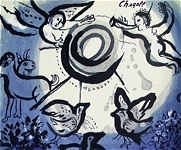
[ "The grace of God is something you can never get but can only be given. There's no way to earn it or deserve it or bring it about... People are saved by grace, yes, but like any other gift, it is yours only if you'll reach out and take it..." - Buechner ]
10.31.23 (Cheshvan 16, 5784) The Name of God, YHVH (יהוה), means "Presence" (Exod. 3:13-14), "Breath" (Gen. 2:7; Num. 16:22), "Life" (Deut. 30:20), and "Love" (Exod. 34:6-7), but it also means "I-AM-WITH-YOU-ALWAYS" (אני תמיד איתך), teaching us that God is an ever-present help for us (Psalm 46:1). The Name YHVH means that "God was (i.e., hayah: היה), God is (i.e., hoveh: הוֶה), and God always will be (i.e., veyihyeh: וְיִהְיֶה)," which implies that He is ever present and not restricted by time or space. Moreover, God is called havayah (הֲוָיָה), which means He is continually sustaining creation by the Word of His power: "In Him we live, move, and have our being" (Acts 17:28; Heb. 1:3). As it is poetically expressed in the Psalms, "Behind and before you cover me; You lay your hand upon me" (Psalm 139:5).
Note that in the wonderful verse the word "behind" translates the adjective achor (אָחוֹר), a word related to the word acharon (אַחֲרוֹן), "west," though it also refers to something later (אַחֲרֵי), such as a later place or time (אַחֲרִית). In Hebrew, the word generally means "backward" (לאחור) or "behind" (מאחור). God's got your back, friend... Note further that the word translated "before" is kedem (קֶדֶם), a preposition that means "east" but also refers to the primordial beginning, or the dawn. The root verb kadam (קָדַם) means to "meet" in initial contact. God is always present for you, friend, and that includes times and days that lie ahead, in the distant future... "As far as the east is from the west," so far does God's compassion and love cover you, surround you, and sustain you (Psalm 103:12).
Hebrew Lesson:
Psalm 139:5 Hebrew reading (click):
"You cover me." The verb tzartani (צַרְתָּנִי) comes from the root tzur (צור) that means to encircle, to press upon, to "pressurize," as by relentlessly attacking a stronghold. The image is that God "hems us in," that is, He surrounds us and shelters us with His Presence – so that we cannot escape: You are under God's supervision and protection, friend... And while the root tzur can imply tzuris (trouble, affliction), in this context it is used to picture the Lord securing our station, preserving, protecting, and defending our way. "You lay your hand upon me." God's personal and providential hand is at work in your life – He is HaMashgiach hagadol (הַמָּשְׁגִיחַ הַגָּדוֹל) - the Great Overseer of the universe, and that means your way is as sure and secure as the very power that God's own will affords. Amen.
Torah of Surrender...
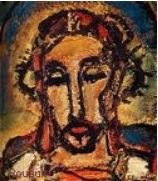
10.31.23 (Cheshvan 16, 5784) When we sincerely pray to God, "Thy will be done," are we not surrendering our desire for whatever might happen? Are we not confessing trust in His sovereign care as Ribbono shel olam (ריבונו של עולם), the Lord of the world? The prophet cries out: "Who has directed the Spirit of the LORD, or being his counselor has taught him?"(Isa. 40:13). He is our God, and we are his sheep, if we heed his voice (Psalm 95:7).
If we habitually complain or murmur about the course of our lives, are we not resisting his will? Indeed, is not such complaint a type of blasphemy before the Lord? Is it not an accusation that God is not to be trusted with whatever happens, whether good or bad? Is not such a complaint, in its essence, tantamount to the demand: "I want it my way"?
C.S. Lewis warned: "Hell begins with a grumbling mood, always complaining, always blaming others... but you are still distinct from it. You may even criticize it in yourself and wish you could stop it. But there may come a day when you can no longer. Then there will be no 'you' left to criticize the mood or even to enjoy it, but just the grumble itself, going on forever like a machine. It is not a question of God "sending us" to hell. In each of us there is something growing, which will BE hell unless it is nipped in the bud" (Great Divorce). "Perhaps my bad temper or my jealousy are gradually getting worse - so gradually that the increase in seventy years will not be very noticeable. But it might be absolute hell in a million years!"
There is a Torah of surrender we must offer: "Be still and know that I am God..." (Psalm 46:10). This is something you must do; you must quiet your heart to know the Divine Presence; you "set the Lord always before you" (Psalm 16:8) and refuse anxious thoughts that weigh in upon you, creating pressure and "dis-ease." Let go of your will. Confess your selfish desire; abandon the insanity of your self-rule. Quieting your heart allows you to hear the holy Spirit's whisper: "It is I; do not be afraid..." Once the storm of fear dissipates, you can access the truth of God. The Spirit asks us to do teshuvah: "In returning and rest you shall be saved; in quietness and in trust shall be your strength" (Isa. 30:15).
Worry is a place of exile and pain. Since God's Name (יהוה) means "Presence" and "Love," being anxious is to practice the absence of God's presence instead of practicing his presence... A divided house cannot stand. Where it is written, "cast all your anxiety on him because he cares for you" (1 Pet. 5:7), the word translated "anxiety" comes from a verb that means to divide into pieces. Bring your brokenness to God – including those distractions that make you ambivalent and afraid – to receive God's healing for your divided heart.
"Be still and know that I am God..." (Psalm 46:10). Note that the Hebrew verb translated "be still" (i.e., rapha: רפה) means to "let go," to stop striving, stop kvetching, and to surrender categorically everything to the care of God (Rom. 8:28). "Being still" means letting go of your supposed "need" to control the world. Relax your hold and rely on God's care for your life instead, without "taking thought" for tomorrow and its concerns (Matt. 6:34). The past is gone, after all, and the future is God's business: all you have is the present moment to call upon our Lord. Be faithful in the present hour, then, asking God for the grace and strength you need to endure yourself and engage the task at hand. In this way you will experience the peace of God "which surpasses all understanding" (Phil. 4:7).
Walking with God isn't just a matter of "head education," but also of "heart education," and these two must always go together as Spirit and Truth (John 4:23). Head education seeks knowledge primarily as a means of defining what you believe (emunah); heart education, on the other hand, centers on fear, or rather, on overcoming your fear by trusting in God's love and healing grace (bittachon). When you accept that you are accepted despite yourself, you are delivered from the need to defend yourself. You can let go, quit denying who you are, and accept God's unconditional care for your life – regardless of the state of the world. When your heart learns to "be still," you can know that the Lord your God reigns over all things! As Yeshua said: "Come unto me, all ye that labor and are heavy laden, and I will give you rest. Take my yoke upon you, and learn of me; for I am meek and lowly in heart: and ye shall find rest unto your souls. For my yoke is easy, and my burden is light" (Matt. 11:28-30).
"Be still and know that I am..." Prayer is a type of listening (shema), a turning back to know the message of God's love and hope in Messiah. The word "teshuvah" (תְּשׁוּבָה) means an answer or response to a question. God's love is the question, and the heart's repose is the answer. Some of us may find it difficult to trust, to open our heart to receive grace and kindness. For those wounded by abandonment, it can be a great struggle to hear the voice of God calling you "beloved," "worthy," "valued," and "accepted." When you find faith to receive God's word of love, however, your heart comes alive and you begin to heal... Yeshua speaks words of comfort: "Blessed are those who have not seen and yet still believe."
Hebrew Lesson:
Psalm 46:10 reading (click):
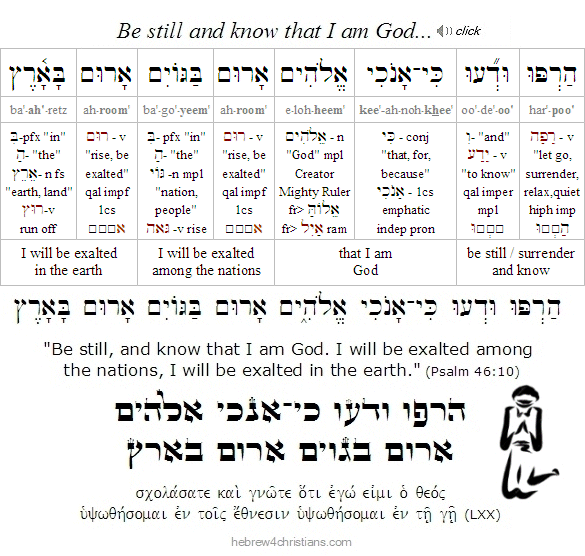 |
The Divine Presence...
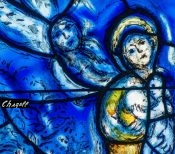
10.31.23 (Cheshvan 16, 5784) God told Moses that his Name means that He is Present (הֹוֶה) in every moment - past, present, and future (הָיָה וְהוֶה וְיָבוֹא). The Name YHVH (יהוה) is "shorthand" for "I AM with you always" (אָנכִי אֶהְיֶה עִמָּכֶם). There is no moment in time, just as there is no place, where God is not "there" for you. This includes times of testing, darkness, and even death itself (Psalm 23:4).
The LORD our God does not abandon us, even when He may seem hidden, powerless, or unwilling to intervene. Faith trusts that He is present just then - in moments when we are vulnerable, weak, afraid, and seemingly all alone, and yet affirms that somehow all things are bound up in his love and good will toward us... Faith receives God as near to us in our struggles, the loving One who is always with us, and the substance of all our hope for true healing and eternal life.
Hebrew Lesson
Psalm 23:4 reading (click for audio):
The Work of Faith...

10.30.23 (Cheshvan 15, 5784) Our Torah for this week (i.e., Vayera) gives the account of the terrible test given to Abraham when God asked him to offer up his son as a sacrifice (see Gen. 22). The apostle James later said that Abraham was "justified by works when he offered his son Isaac upon the altar" (James 2:21), whereas the apostle Paul seemed to say just the opposite, that Abraham was not justified by works (see Rom. 4:1-3). So is there a contradiction here in our Bibles regarding the idea of "justification"? To answer this first understand that when James said that Abraham was justified "by works" he was referring to the work of faith and certainly not to the works of the law (מַעֲשֵׂי הַתּוֹרָה), since the Torah explicitly prohibited human sacrifice (Gen. 9:5), and furthermore the Angel of the LORD restrained Abraham's hand during the great test of faith (Gen. 22:12) thereby indicating that it was not God's will (i.e., Torah). On the other hand, the apostle Paul's seemingly contrary statement that Abraham was not justified by works refers to Abraham's unwavering trust in God's promise that his descendants would be as numerous as the stars in the heavens (Gen. 15:1-6). There is no real contradiction, then, since the two apostles were referring to two different episodes in their discussion of justification. Faith and works are two sides of the same coin: true faith will show up in your life and character. As Yeshua said, "This is the work of God, that you believe in the One whom He has sent" (John 6:29).
The life of faith is inherently paradoxical, as Kierkegaard noted: "Ethically speaking, what Abraham planned to do was to murder Isaac; religiously, however, he was willing to sacrifice Isaac. In this contradiction lies the very anguish that can indeed make anyone sleepless. And yet without that anguish Abraham is not the one he is. Neither would faith be what it is." Although Abraham understood that God must be obeyed, he also understood that human sacrifice was immoral, and hence his struggle represented the collision between the imperative of reason and the imperative of faith. Choosing to heed the voice of reason (i.e., the "ethical," the "universal") over the personal voice of God created a state of "fear and trembling" and a sense of being unable to communicate his passion and mission to others.
"God cannot stand good works in the sense of earning merit. Yet good works are required. They shall be and yet shall not be. They are necessary and yet one ought humbly to ignore their significance or at least forget that they are supposed to be of any significance. Good works are like a child giving his parents a present, purchased, however, with what the child has received from his parents. All the pretentiousness which otherwise is associated with giving a present disappears when the child understands that he has received from his parents the gift which he gives to them." - Soren Kierkegaard (Fear and Trembling).
As Kierkegaard further commented: "Faith's conflict with the world is not a battle of thought with doubt, thought with thought. It is a battle of character. The person of faith is a person of character who does not insist upon comprehending everything. Now comes the conflict. The world insists that to believe what you cannot comprehend is not only blind obedience but obscurantism, stupidity, and so on. The world wants to alarm the believer against such foolishness. This is precisely why faith is a task for the person of character."
Hebrew Lesson
Isaiah 26:12 reading (click for audio):
Note: In the Book of Hebrews we read: "By faith Abraham, when he was tested, offered up Isaac, and he who had received the promises was in the act of offering up his only son, of whom it was said, "Through Isaac shall your offspring be named." Abraham considered that God was able even to raise Isaac from the dead, from which, figuratively speaking, he did receive him back" (Heb. 11:17-19). The Greek text for "from which, figuratively speaking, he did receive him back" (i.e., ὅθεν αὐτὸν καὶ ἐν παραβολῇ ἐκομίσατο; Heb. 11:19b) seems to suggest Abraham believed (beforehand) that God would do a miracle and bring his son back from the dead after being sacrificed, though, of course, saying this does not mean it was therefore "easier" for him to go through with the sacrifice or that it required anything less than a complete surrender of his will to do God's will... The key phrase in 11:19b, however, has to do with receiving Isaac back, and the language here means that he did receive him back from the dead "symbolically" or "figuratively" (i.e., as a "parable").
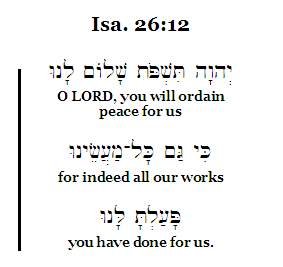 |
The Sins of Sodom...

[ As the days of Sodom... Insanity has become normative and ubiquitous; the whole head is sick; the whole heart is faint. Madness rages throughout the world. Jerusalem becomes a "cup of trembling." LOOK UP, your redemption draws nigh! ]
10.29.23 (Cheshvan 14, 5784) From our Torah this week (Vayera) we read: "And the LORD said, 'The outcry of Sodom and Gomorrah is indeed great, and their sin is exceedingly grave...'" (Gen. 18:20). But what was the grave sin of Sodom and Gomorrah? Why did God destroy the two cities? Was it because the people there refused to show hospitality to the angelic visitors (as claimed by some), or was it because of some ongoing sin of the people?
Though the sin of Sodom undoubtedly included practices of sexual perversion (called "strange flesh" (σαρκὸς ἑτέρας) in the Book of Jude), such behavior was symptomatic of a nihilistic culture that glorified violence, despised moral authority, perverted spiritual truth, and condoned the exploitation of others. Throughout the Scriptures "Sodom" symbolically represents gross immorality, depravity, and inevitable judgment from heaven. For example, the prophet Ezekiel later wrote of Judah: "Behold, this was the guilt of your sister Sodom: she and her daughters had arrogance, abundant food, and careless ease, but she did not help the poor and needy. Thus they were haughty and committed abomination (תּוֹעֵבָה) before me; therefore I removed them when I saw it" (Ezek. 16:49-50). The New Testament refers to the fate of Sodom as "a fearful example of the everlasting fire of retribution" (Jude 1:7) -- the destructive result of spiritual anarchy, lawlessness, perversion, and the violence of indifference (2 Pet. 2:6-10).
There is real hope for those who seek to escape from the wrath to come by turning to God and trusting in his healing power of salvation, though it is only a "remnant" that will genuinely seek such deliverance (Matt. 7:14). Speaking of the final salvation of Israel, the Apostle Paul quotes Isaiah: "If the LORD of Hosts hadn't left us a few survivors, we'd be as desolate as Sodom, doomed just like Gomorrah" (Isa 1:9; Rom. 9:29).
In this connection it should be noted that the word "sodomy" involves any form of violence, perversion, exploitation, or lawless expression of sexuality regardless of gender... In general, it is more helpful to think of it as a code word for egregious sin, "in-your-face" spite toward God, and defiant immorality that celebrates spiritual anarchy, moral nihilism, and death... Adultery, fornication, sexual perversions, viewing pornography (i.e., the lust of the eyes), covetousness, gluttony, arrogance (idolatry), unbridled anger (rage), sloth, worshiping the values and ideologies of this world (i.e., political activism, godless scientism, the world's value system), and so on, all may be called "sodomy." Whenever we consider such things, it is better to look at how we are healed rather than what makes us sick.... The answer to the trauma of a sinful heart is to turn to God and ask for deliverance in the name of Yeshua.
Hebrew Lesson
Jeremiah 7:14 Reading (click):
The world and its "group-think" always calls for the abolition of the individual conscience. Like the people of ancient Sodom that repudiated God's moral authority so that they would be "free" to their indulge their selfish desires and "autonomy," so the world system today repudiates a person of real conviction and conscience. Indeed, the only thing regarded as "intolerable" in the devil's world is the objection that people have the supposed "liberty" to sin in whatever way they please. This godlessness is anathema to one who truly fears God, of course, since tolerating sin in a world ripe for judgment is a cowardly form of "collaboration" with the enemy (James 4:4). "Woe to those who call evil good and good evil, who put darkness for light and light for darkness, who put bitter for sweet and sweet for bitter! Woe to those who are wise in their own eyes, and who are shrewd in their own sight!" (Isa. 5:20-21).
The "original sin," that is, eating from the Tree of Knowledge of good and evil, meant that man sought to transcend God's will to determine what is valuable, true, beautiful, and so on. Man became autonomous, "the measure of all things." Such was the "logical" method of the German idealism of Kant and Hegel, which led to way for Karl Marx, Friedrich Nietzsche, and Adolf Hitler (and some present day politicians) to unleash their nightmares upon the earth. Understand that the deep untruth that lies behind cynical "postmodernism" expresses little more than the godless desire to control the world... Today, more than ever before, the world is like "Sodom," and therefore ripe for judgment from heaven.
And the judgment of God indeed came upon the moral anarchy of that realm... After the angels rescued Lot (and his immediate family), we read "then the LORD rained on Sodom and Gomorrah sulfur and fire from the LORD out of heaven. And he overthrew those cities, and all the valley, and all the inhabitants of the cities, and whatever grew on the ground" (Gen. 19:24-25). The sages note the word translated "overthrew" is vayahafokh (וַיַּהֲפךְ), which means "overturned," suggesting that besides the fire and brimstone that rained down from the sky, an enormous earthquake engulfed the plain, forming a crater filled with salt that became known as the "Dead Sea" (ים המלח).
For more on this see, "The Sins of Sodom: Further thoughts on parashat Vayera."
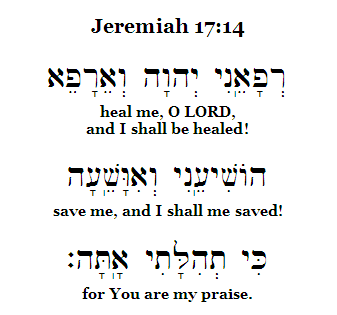 |
Parashat Vayera:
God Provides the Lamb...
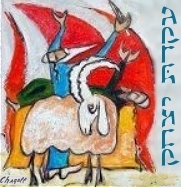
10.29.23 (Cheshvan 14, 5784) Our Torah reading for this week (Vayera) is very dramatic and extraordinarily prophetic. Among other things it includes what I have called the "Gospel according to Moses," that is, Moses' account of how Abraham was tested by God to offer his "only begotten son" (בֵּן יָחִיד) Isaac as a sacrifice on Mount Moriah -- the place of the future Temple. This famous story is referred to as the Akedah (עֲקֵדָה), or Akedat Yitzchak (עֲקֵידָת יִצְחָק) - the "binding of Isaac" (Gen. 22:1-18). At the very last moment, the Angel of the LORD stopped Abraham from going through with the sacrifice and provided a ram as a substitute. Abraham then named the location Adonai-Yireh (יהוה יִרְאֶה), "the LORD will provide/see" (from the 3ms imperfect of the verb ra'ah (רָאָה), "to see"). The binding of Isaac perfectly illustrates both the principle of sacrificial love and the principle that we must first unreservedly believe in that love in order to understand the ways of the LORD.
Those who believe in Yeshua understand the Akedah as a foreshadowing of the ultimate sacrifice the heavenly Father would give on our behalf. Unlike Abraham, God the Father actually offered His only begotten Son (בֵּן יָחִיד) at Moriah in order to make salvation available for all who will believe (John 3:16-18; 1 John 4:9). As Abraham himself confessed: אֱלהִים יִרְאֶה־לּוֹ הַשֶּׂה / Elohim yireh-lo haseh ("God will provide for himself the lamb").
Hebrew Lesson
Genesis 22:8a reading (click):
As I've mentioned over the years, the very first occurrence of the word love in the Scriptures (i.e., ahavah: אַהֲבָה) refers to Abraham's love for his "only" son who was to be sacrificed as a burnt offering on Moriah (the very place of the crucifixion of Yeshua), a clear reference to the gospel message (Gen. 22:2; John 3:16). Some scholars have noted that the word ahavah comes from a two-letter root (הב) with Aleph (א) as a modifier. The root means "to give" and the Aleph indicates agency: "I" give (i.e., the Father gives). Love is essentially an act of sacrificial giving... The quintessential passage of Scripture regarding love (αγαπη) in the life of a Christian is found 1 Corinthians 13: "Love seeks not its own..."
Whereas the Akedat Yitzchak foreshadowed God's provision for the coming Temple, the Akedat Yeshua (i.e., the crucifixion of Yeshua at Moriah) was the altar where the justice and chesed (love) of the Father fully met (Psalm 85:10). For more on this incredibly rich subject, please see the articles, "The Passion of Isaac" and "The Sacrificed Seed."
Hebrew Lesson:
Genesis 18:1 reading (click):
Father of the Faithful...

10.28.23 (Cheshvan 13, 5784) Abraham is the "father of all who believe" in the miracle of the Promised Seed (הזרע הבטיח), that is, in the Coming Deliver who would bring redemption and healing to the whole world (see Gal. 3:16; Rom. 4:1-5:1). The Torah states that God chose Abraham because he would faithfully teach his children to guard "the way of the LORD" (דֶּרֶךְ יְהוָה), by trusting in God's acts of "righteousness and justice" (צְדָקָה וּמִשְׁפָּט) that He would perform according to his promise (Gen. 18:19). God regarded Abraham as faithful to retain His promise, and therefore He would manifest salvation (יְשׁוּעָה) through his descendants. The "way of the LORD" refers to Yeshua, "the way and the truth and the life" (הַדֶּרֶךְ וְהָאֱמֶת וְהַחַיִּים), the Promised Seed that would crush the head of the serpent in the battle for our redemption (Gen. 3:15). Abraham's faith was directed toward the Deliverer to come, as Yeshua said: "Abraham rejoiced to see my day; and he saw it and was glad" (John 8:56). Likewise we guard the way of the LORD as our father Abraham did – namely, by trusting in God's promises given to us in Yeshua our Messiah.
We are chosen to embody the same heart, vision, and mission of Yeshua our LORD, to exist as "extensions of his presence" in this world, and therefore we are also called to walk uprightly, as he walked... Indeed, the Hebrew word derekh (דֶּרֶךְ), usually translated as "way," metaphorically refers to the journey, manner, or course of your life. Because God is tov v'yashar (good and upright), he teaches his children to be yesharim (יְשָׁרִים), i.e., those who walk uprightly. Indeed, the way of the LORD (דֶּרֶךְ יהוה) is "to do acts of charity and justice" (לַעֲשׂוֹת צְדָקָה וּמִשְׁפָּט) (Gen. 18:19). This is the "straight way" (derekh ha-yashar), or the "narrow path" that leads to life (Matt. 7:14).
טוֹב־וְיָשָׁר יְהוָה
עַל־כֵּן יוֹרֶה חַטָּאִים בַּדָּרֶךְ
tohv-ve·yah·shar · Adonai
al-kein · yoh·reh · chah·tah·eem · ba·dah'·rekh

"Good and upright is the LORD
therefore will he teach sinners in the way." (Psalm 25:8)

Hebrew Lesson
Psalm 25:8 reading (click):
Note that the verbal clause "he will teach" (i.e., יוֹרֶה) used in this verse comes from the root yarah (ירה) -- the same root used in the word "Torah" (תּוֹרָה). Because the LORD is good and upright, He gives us Torah (direction) for our lives. God educates us for eternity by imparting to us moral and spiritual truth. As King David taught, "Happy is the man who delights in the Torah of the LORD and meditates upon it day and night" (Psalm 1:1-2).
The Seed of Abraham...
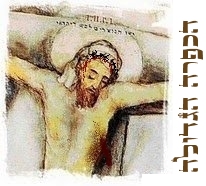
10.27.23 (Cheshvan 12, 5784) In the "Gospel in the Garden" I considered the very first prophecy given in the Torah, namely, God's promise that through the "seed of the woman" would come one who would slay the serpent and crush the kingdom of Satan (Gen. 3:15). This prophecy is sometimes called the proto-euangelion ("first gospel"), since it constitutes the starting point of all subsequent redemptive history revealed in the Scriptures. In a sense this promise forms the "womb" for the whole course of God's redemptive plan for the human race. The first prophecy of Torah clearly anticipated the coming of the Savior of mankind and a cosmic battle between good and evil: "... he (i.e., the Savior/Messiah) will crush your head (ראשׁ), and you (i.e., the serpent/Satan) will crush his heel (עָקֵב)."
It is likely that Eve initially believed that her firstborn son Cain (קַיִן) was the promised Seed himself. After all, the miracle of birth surely came as a great shock to her, and Eve's faith in God's promise that through her seed would come the deliverer was doubtlessly upon her heart at this time. When Eve called her son "Cain" (wordplay from the verb kana (קָנָה), "to get"), she was expressing her faith in God's promise: קָנִיתִי אִישׁ אֶת־יהוה / kaniti ish et-Adonai, "I have gotten a man - namely, the LORD" (Gen. 4:1). Eve's faith was obscured by the translators, however, who rendered the Hebrew as "I have gotten a man with the help of the LORD" (i.e., they inserted the idea of "help" and translated the particle et (את) as "with" rather than as the direct object marker for the verb). The ancient Jewish targums, however, agree with the original Hebrew. For example, Targum Yonatan reads: "I have gotten a man - the Angel of YHVH." Surely Eve, the first mother of humanity, was endowed with great wisdom from God, especially after she turned to Him in repentance after her disobedience. The straightforward reading of her words, then, expressed her hope that the LORD Himself would be made a man....
Despite her hope that Cain was none other than the God-Man and promised Deliverer, Eve's hopes were dashed when it became clear that her son was of the seed of Satan (1 John 3:12). His younger brother Abel (הֶבֶל) was a shepherd who evidenced faith in the promise of the coming redeemer by offering blood sacrifice (Gen. 4:3-5). Abel was persecuted and finally murdered by his brother Cain "because his own deeds were evil and his brother's righteous." Their spiritual conflict is indicative of the ongoing warfare between the "sons of darkness" and the "sons of light."
The murder of Abel necessitated that the coming seed would descend through another child, and therefore the Torah describes the birth of Seth (שֵׁת, lit. "appointed"), the third son of Adam and Eve. The Scriptures further state that it was the descendants of Seth who "began to call upon the Name of the LORD" (לִקְרא בְּשֵׁם יהוה), indicating that they had faith in God (אֱלהִים) as the Compassionate Covenant Keeper (יהוה) who would redeem humanity by means of the coming seed. Seth called his firstborn son Enosh ("man"), perhaps in the hope that his child would be the promised Savior (interestingly, bar enosh (בַּר אֱנָשׁ), or "Son of Man," is the name for the Savior (Dan 7:13).
The Torah then traces the genealogy (toldot) of Seth through ten generations (from Adam), until his descendant Noach (נחַ) is described as the only tzaddik (righteous man) remaining in the earth (for more on the genealogy, see parashat Noach). The promise of the coming seed would therefore come through Noah, since his family alone survived the great flood. Now Noah had three sons, but it was through Shem (שֵׁם) that the "line of the Messiah" would come. According to midrash, Noah announced his blessing near the end of his life. When he said, "Blessed be the LORD, the God of Shem" (בָּרוּךְ יהוה אֱלהֵי שֵׁם), he prophesied that the coming redemption would come through the line of Shem, not through Canaan or Japheth. Notice that the phrase, "he shall dwell (יִשְׁכּן) in the tents of Shem," is often thought to refer to Japheth, though the Hebrew grammar is ambiguous. Does the "he" in this case refer to Japheth or to the LORD? A viable translation would be "and He (i.e., the LORD) shall dwell in the tents of Shem," meaning that the LORD would dwell among the Shemites, and by extension, that the promised Seed would come from this line. In this sense, Noah's blessing to Shem was a prophecy of the coming Redeemer through Shem (similar to Jacob's blessing of Judah as the chosen tribe). Since the LORD is the "God of Shem" (יהוה אֱלהֵי שֵׁם), and the prophecy states that one day He (i.e., God) would "dwell in the tents of Shem," the Torah indicates that the coming Redeemer (הַגּוֹאֵל) would come from the Shemites, of whom the great patriarch Abram (אַבְרָם) descended.
The Torah identifies Abram as the tenth generation from Noah (including Noah), and therefore the twentieth from Adam. God called Abram out of Ur of Chaldea to begin a pilgrimage of faith to the land of promise (Heb. 11:8-10). The story of Abram is highly prophetic of the coming Messiah, and the promises given to him foretell of the advent of Yeshua in unmistakable ways. After the Akedah (i.e., the sacrifice of Isaac), God promised that "in your seed (זֶרַע) shall all the nations of the earth be blessed, because you have obeyed my voice" (Gen. 22:18). In light of the New Testament, the faith of Abraham - and especially the faith demonstrated by the Akedah - prefigured the justification of the nations through faith. Therefore we read: "And the Scripture, foreseeing (προοράω) that God would justify the nations by faith, proclaimed the gospel (προευαγγελίζομαι) beforehand to Abraham, saying, "In you shall all the nations be blessed" (Gal. 3:9). It is noteworthy that Abraham received this promise as a Gentile, since he was yet given the commandment of brit milah (circumcision) as a token of Jewish identity. Abraham was therefore uncircumcised when he believed the good news of the coming redemption of mankind (Rom. 4:10-12). Therefore the Apostle calls Abraham the father of faith for those Gentiles who would later believe the good news of redemption in Yeshua. "So then, those who are of faith are blessed along with Abraham, the man of faith" (Gal. 3:9; Rom. 4:16).
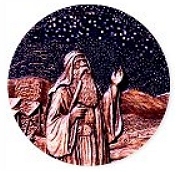
Genesis 22:18 clearly states that the blessing would come through Abraham's "seed" (זֶרַע). The Apostle Paul clearly identifies this seed with Yeshua: "Now the promises were made to Abraham and to his offspring. It does not say, "And to offsprings," referring to many, but referring to one, "And to your offspring," who is Messiah" (Gal. 3:16). In other words, the promises were made first to Abraham but also to the coming Messiah. This is yet another example of a "dual aspect" prophecy, since it pertains to Abraham and his chosen offspring (i.e., Isaac (not Ishmael), Jacob (not Esau), Judah (not Reuben), David (not Jesse's firstborn), Solomon (not Adonijah), etc.), but also to the coming Messiah who would redeem fallen humanity from the curse brought about through Satan (John 8:56). Abraham was chosen by God, in other words, to "deliver" the promised Savior to the world. "Salvation is from the Jews," of course (John 4:22), but the blessing of Abraham's promised Seed was ultimately meant to be bestowed upon all people, so that one day the Kingdom of God would be manifest within the sons and daughters of Adam (Gal. 3:14). This is also why Malki-Tzedek, the "priest of the Most High God," was the one who was appointed to bless Abraham, since he prefigured a priesthood that predated the one given later to the Levites through the office of Moses (Heb. 7:1-21).
The original curse of death and the division symbolized by Babel would be reversed through the sacrificial death, burial, and resurrection of Yeshua the Messiah: "And they sang a new song, saying, 'Worthy are you to take the scroll and to open its seals, for you were slain, and by your blood you ransomed people for God from every tribe and language and people and nation, and you have made them a kingdom and priests to our God, and they shall reign on the earth" (Rev. 5:9-10).
Hebrew Lesson
Genesis 22:18 reading (click for audio):
The Leper Messiah...
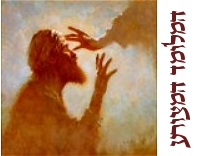
10.27.23 (Cheshvan 12, 5784) "The Messiah -- what is his name?... The sages say, the Leper Scholar..." (Sanhedrin 98b). But how was it that Yeshua was able to touch the metzora ("leper") and yet remain clean himself (Matt 8:1-4)? Only because He is the LORD (יהוה), the true Healer. Just as Yeshua spoke with greater authority than Moses (Matt. 5:21-48), so He was able to do what Moses (and those under the Levitical system of worship) could not do -- namely, reach down in compassion and take away the uncleanness from our lives.... Yeshua's blood creates the "waters of separation" (מֵי נִדָּה). He is the fulfillment of the "Red Heifer" sacrifice. Only Yeshua enters the "leper colony" of humanity and takes away our tzara'at (sin) by becoming ish machovot (אישׁ מַכְאבוֹת), a leper Himself, the Just for the Unjust, that He might make us acceptable before the LORD.
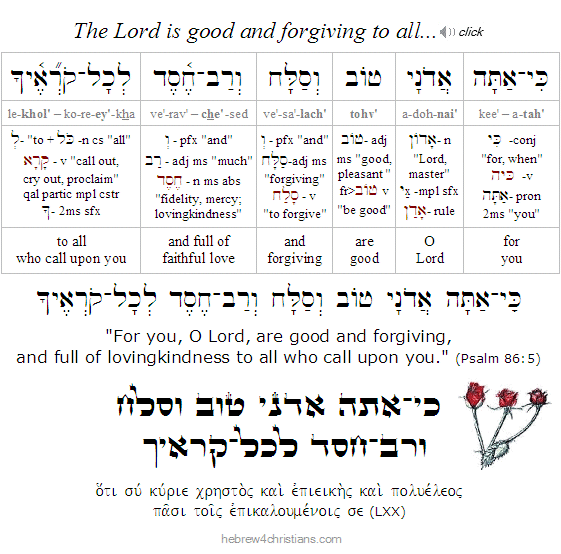 |
Just as a body can become sick with illness, so can the soul: "I said, 'O LORD, be gracious to me; heal my soul (רְפָאָה נַפְשִׁי), for I have sinned against you!'" (Psalm 41:4). If you feel your sins biting you, and your heart is wavering and beginning to tremble, take your place on the outside of the camp, where the lepers are standing, for they are the ones for whom the Gospel is intended.... Yeshua enters the leper colony to touch the leper. He seeks and saves the lost. The message of God's love and forgiveness is received only by those who understand how much they need it, to the self-confessed lepers of the soul... The gospel is sure remedy for the sick, not the healthy; it is for the sinner, not the saint. For those who accept Yeshua as their Redeemer, sin is turned right through the pain He bore on the cross, and forgiveness is a matter of sheer grace, not merit. There is joy in heaven for one sinner who turns to God in repentance, and this implies that every time you go to the LORD in your brokenness, in the truth of your need for Him, He will receive you with divine happiness.
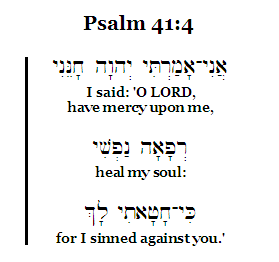 |
 |
O Blessed Fault...
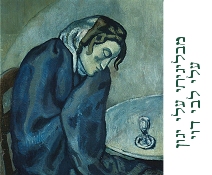
10.27.23 (Cheshvan 12, 5784) "O LORD, is it possible to really change? There is so much of me that is in need of help, I know not where to begin. Not just my past, O God, but my present hour is haunted by frailty and failure. Is there any likelihood that tomorrow will find me stronger, more righteous, or more reconciled with you? No, for you won't love me any more that you do right now... Help me, then, to abide in your love, trusting that you will do within my heart what I am unable (or unwilling) to do for myself. And even if tomorrow I should repeat the same old sins, help me understand that you love me just the same, and that you will never give up on me; you will never repudiate me. Help me to know that your love is stronger than the sickness of my sin. Amen."
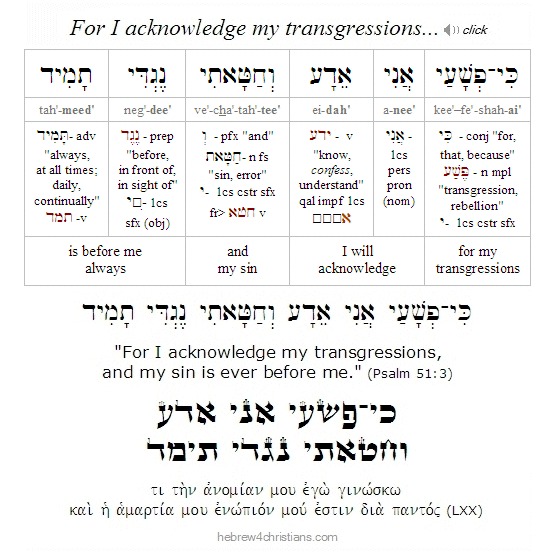 |
O blessed fault - the dread sin that breaks my heart before the LORD... Were it not for anguish of heart, how would I have sought the solace and healing of my Savior? Sorrow was God's messenger to my need. The fault of my sin occasioned God's mercy and grace, "for where sin abounded, grace did much more abound" (Rom. 5:20). The law was given by Moses, but love and faithfulness (חֶסֶד וֶאֱמֶת) come through Yeshua our Messiah (John 1:17).
In tears a man once confessed a sin to the Rabbi of Apt and told him how he atoned for it. The tzaddik laughed. The man went on to tell what more he intended doing to atone for his sin, and the rabbi kept on laughing. The man wanted to continue, but the laughter robbed him of the power to speak. He stared at the tzaddik in horror. And then his soul held its breath, and he heard a voice deep within. He realized how trivial all his fuss about atoning had been, and instead he turned to God...
Because Yeshua sacrificed Himself for our sins on the cross, the question no longer concerns what we must do to find atonement through religious rites or acts of penitence -- as if these might somehow assuage or propitiate God's disappointment over our sin. No, the remedy is far more profound and costly, and only God Himself could pay the price for our atonement. But because of Yeshua, we now may simply turn to God for the love and healing we so desperately need... This is the meaning of teshuvah. God has made the way for us to be received, loved, and accepted - despite the stain of our sins (Heb. 9:11-28). Jesus paid the penalty for your sins, and the only real question remains: Will you believe it? Will you accept that you are accepted by the love of God?
The Name YHVH means "God is Present" and near, as close as your heart. The LORD is near, even when you feel lost and far away. Turn away from any evil you have done: do not keep it in mind, but instead see it in light of the greater good of God's love, patience, and forgiveness for you... See your sin only in relation to the cross. Resolve today by the power and truth of God's very love to turn away from darkness to His marvelous light.
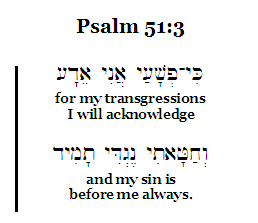 |
 |
The Angel of the LORD...
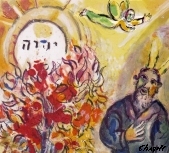
10.26.23 (Cheshvan 11, 5784) In Hebrew, an "angel" is called malakh (מַלְאַךְ), a word that basically means "messenger" or representative (from the root לאך, meaning "to send"). God created many angels, of course (Psalm 68:17, 103:20), but there there is one malakh who stands out from all the rest of the malakhim (angels) as a King stands above his subjects. This "King of Angels" is called Malakh Adonai (מַלְאַךְ יהוה), or "the Angel of the Lord." Unlike the other angels that function as emissaries of God, Malakh Adonai is the supreme representation or Message of God Himself. His Word/Voice is "one" with the Person of God, just as the Spirit of God is "one" with the Person of God. Since the glory and power of God's infinite Being is incomprehensible to finite creatures, the Angel of the LORD is a form of God's condescension in a visible or audible manner so that an angel or a human being can apprehend His message. This is sometimes called a "theophany" in theological jargon.
This unique King of the Angels (מלך המלאכים), or "Angel of the LORD," is named in about 50 verses of the Tanakh (i.e., "Old Testament"), though he is alluded to in various other places as well (e.g., Gen. 18:1-ff; Gen. 48:16, Exod. 23:20-23, etc.). He is first mentioned in our Torah portion for this week (Lekh-Lekha) where He is clearly called God (Gen. 16:7-13). After he spoke with Hagar in the desert, she called him "the LORD" (יהוה) and identified Him as El-Roi (אֵל ראִי) -- the "God who sees me" (Gen. 16:13). He later appeared to Abraham in the grove at Mamre (Gen. 18:1-ff) to reaffirm the promise of his coming heir, and later still, during the most terrifying moment of the sacrifice of Isaac, he cried out to stop Abraham from bringing down the knife upon his son (Gen. 22:11, see also Gen. 22:15-ff). And note further that it was the "Angel of the LORD" who appeared to Moses in the "burning bush" and identified himself as YHVH, the "God of Abraham, Isaac, and Jacob" (see Exod. 3:2-ff).
Other examples from the Tanakh should be noted. The Angel of the LORD helped Gideon deliver Israel from Midian (Judges 6:11-13); He prophesied regarding the birth of Samson (Judges 13); He led Elijah to Mount Horeb (1 Kings 19); He commanded David to build an altar which later became part of the Holy Temple (1 Chron. 21:18), and he is mentioned in Psalm 34:7 ("The Angel of the LORD camps around those who fear him") as well as in Psalm 35:6-7. In light of all this, it is clear that that Malakh Adonai is nothing less than a manifestation of the LORD Himself. Indeed, the prophet Isaiah calls him the "Angel of His Face" (מַלְאָךְ פָּנָיו, Isa. 63:9). And since Yeshua is the "radiance of the glory of God and the exact imprint of his nature, who upholds the universe by the word of his power" (Heb. 1:3), it is clear that He is the Angel of God's face -- the "Message of God" -- that was "sent" (לאך) in human flesh (John 1:1,14). Yeshua is the one and only "King of Angels" (מלך המלאכים), the LORD God who assumed angelic form, the theophany to man called "the Angel of the LORD." Amen! Yeshua is none other than Melekh Ha-kavod (מֶלֶךְ הַכָּבוֹד) the King of God's Glory (Psalm 24) and Adonai Tzeva'ot (יהוה צְבָאוֹת), the LORD of the heavenly host.
Hebrew Lesson
Psalm 34:7 Hebrew reading (click):
Meeting at Moriah...
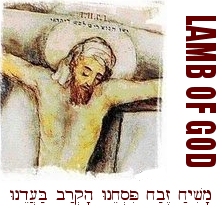
[ The following entry is related to this week's Torah reading, parashat Lekh-Lekha.... ]
10.26.23 (Cheshvan 11, 5784) The phrase "lekh-lekha" (לֶךְ־לְךָ) is used in two places in the Torah: first, when God asked Abraham to leave everything behind to go (lekh-lekha) to a land where he would become a great nation that would ultimately bless the world (Gen. 12:1-3); and second, when God later asked Abraham to go (lekh-lekha) to the land of Moriah to offer up his beloved son as a burnt offering sacrifice (Gen. 22:2). There is a connection.
In the first case note that after Abraham left his homeland God led him to land of Canaan, directly to a "teaching tree" (אֵלוֹן מוֹרֶה) in Shechem (see Gen. 12:6). Some have said this "teaching tree" symbolizes the wisdom of Torah, the tree of life (עֵץ־הַחַיִּים) that brings happiness to those who take hold of it (Prov. 3:18), though it also symbolizes the cross of Yeshua, as we shall see.
In the second case note that "Moriah" (מֹּרִיָּה) means either the "Awe of the LORD" (i.e., מוֹרָא + יָהּ), the "Vision of the LORD" (i.e., רָאָה + יָהּ), or the "Teaching of the LORD" (i.e., מוֹרֶה + יָהּ) regarding the cross, or "the tree of atonement" (עֵץ־הַכַּפָּרָה), given in Yeshua our Messiah (the site of the Temple in Jerusalem was also called Moriah; see 2 Chron. 3:1). The Akedah, or the offering of Isaac, exemplified the meaning of sacrificial love, and indeed the word "love" (i.e., ahavah: אַהֲבָה) is first used in the Torah in this connection (Gen. 22:2). The offering of the lamb that God provided in exchange of Isaac (Gen. 22:13) pictures Yeshua the Passover Lamb of God (שֵׂה הָאֱלֹהִים) who was offered by the Father for the healing and deliverance of the world. And just as Isaac pictured the surrender of the son to the will of his father, so Abraham's willingness to give up his beloved son (בְּנוֹ יְחִידוֹ) reveals the passion of the Father's heart to give up everything for the sake of our salvation (John 3:16). So "lekh-lekha" - go for yourself - and receive the love of God given in Yeshua!
Hebrew Lesson
Genesis 22:2 Hebrew Reading (click):
Teshuvah of Abraham...

10.26.23 (Cheshvan 11, 5784) I had mentioned that "lekh-lekha" (לך־לך) can be understood as a command to "come to yourself," that is, to turn and reconnect to your spiritual essence, though it can also be understood as a command to "go out of yourself," that is, to escape from the bondage of your carnal ego... This corresponds to teaching in the New Testament where we are commanded to both "put on" our new spiritual identity as God's beloved, and to "put off" the old self by being revived in our minds (Eph. 4:22-24). Both "movements" are the heart are necessary: we must turn to the Lord and receive his blessing (inward), and we must turn away from what has previously defined us (outward). We die to ourselves and come back to life; we cross out the old and walk into the new...
The Jewish philosopher Emanuel Levinas said that the reason it is hard to "go out of yourself" has to do with an overwhelming sense of inertia that collapses into passivity of the soul. We get "comfortably numb" and resist waking up. When the heart miraculously becomes "elected," however, as when Abraham heard and believed God's promise, it comes alive before the Divine Presence, and by extension, it is empowered to go out of itself in blessing others. The process of sanctification puts away the old self that is lost within itself by consciously turning to spiritual reality and truth.
There has to be a starting point, however, a "conversion" of the heart that marks the transition from old to new. Abraham is our model. He did not simply make a journey away from home that eventually circled back to what he knew before - the security and history that had defined him. No, his break from his former life was radical and changed his direction forever. It was a "crossing over" into newness of life. Beyond the dimension of the physical world, Abraham's journey was one of inner transformation, and therefore it was a journey into the unknown. He was made a "stranger" and a sojourner in this world. Unlike the Aristotelian view that sees an "end" or telos (purpose) embedded within natural processes, God revealed to Abraham the glory of the transcendental world, incalculable in its beauty, depth, goodness, and holiness. Being "elected" or "chosen" by God is to bear witness of the sanctity of life by "forgetting what lies behind and straining forward to what lies ahead," striving to attain the high calling of God in the Messiah.
Hebrew Lesson
Psalm 4:3 reading (click):
Who before Why...
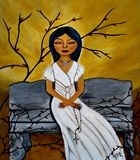
[ "God is too good to be unkind and He is too wise to be mistaken. And when we cannot trace His hand, we must trust His heart... The sweetest prayers God ever hears are the groans and sighs of those who have no hope in anything but his love." - Charles H. Spurgeon ]
10.26.23 (Cheshvan 11, 5784) While I don't understand why God allows terrible suffering to occur, I find it essential to remind myself who God is -- lest I fall into utter despair...
When you're convinced that the Lord is your Good Shepherd who faithfully guides your way, you can trust in his good will for you, even if you are in darkness and have no light (Isa. 50:10; Prov. 3:5-6).
Who before why... First know God's heart and then (perhaps) you will be able to seek understanding. In cases of great tragedy and loss, however, no rationalization or explanation will likely suffice, and we are therefore left with the raw decision of whether we will trust in God, even in our darkness, and in our sorrows, and apart from understanding...
Thomas Aquinas once wrote: "To one who has faith, no explanation is necessary; to one without faith, no explanation is possible." This is because, as Blaise Pascal said, "the heart has its reasons that reason knows not. " Amen, seek first the Kingdom of God and then you will know. We must believe in God's heart first of all...
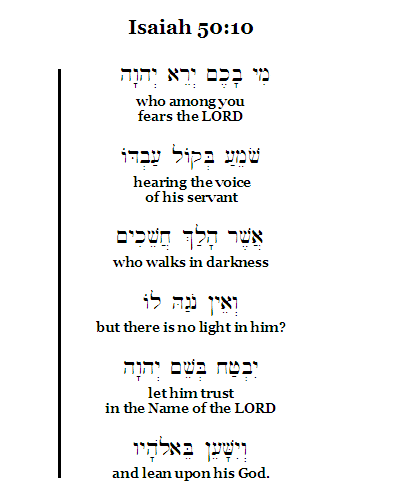 |
Righteousness of Heart...
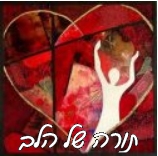
10.26.23 (Cheshvan 11, 5784) From our Torah reading for this week (Lekh-Lekha) we learn about the resolute faith of Abram who, despite his old age, trusted that God would make his descendants as numerous as the stars in the night sky: "And the LORD brought him outside and said, "Look toward heaven and count the stars, if you are able to number them." Then the LORD said to him, "So shall your offspring be. And he trusted in the LORD, and He regarded it to him as righteousness" (Gen. 15:6).
Abram "staggered not" at the promise of God, and therefore God imputed to him righteousness (צְדָקָה), a term understood here to be divine esteem and grace. After all, what could Abram do in the face of seeming impossibility? There was nothing he could do to bring about the miracle. The New Testament comments: "He did not weaken in faith when he considered his own body, which was as good as dead (since he was about a hundred years old), or when he considered the barrenness of Sarah's womb" (Rom. 4:19). It was in a state of utter powerlessness and complete helplessness that Abram retained hope and thereby received the promise by faith. "For he was beyond hope, yet in hope he trusted that he would indeed become a father to many nations, in keeping with what he had been promised, 'so shall your offspring be'" (Rom. 4:18).
Understand that 400 years before the law was given at Sinai, the LORD regarded the faith of Abram as the heart of the righteousness later prescribed by the Torah. Therefore the very First Commandment of the Ten Commandments is simply: Anochi Adonai Elohekha (אָנכִי יְהוָה אֱלהֶיךָ): "I AM the LORD your God" (Exod. 20:2), which repeats the call to trust God before everything else, since it is complete surrender to the love and grace of God that justifies us, as it is written: "to the one who does not work but trusts in the One who justifies the ungodly (i.e. the helpless), his faith is counted as righteousness" (Rom. 4:5).
Where the LORD says "Look toward heaven and count the stars, if you are able to number them," we note the Hebrew word "count" (סָפַר) may also mean "recount," "interpret," or "explain"... This is the same word used in the famous verse, "The heavens declare (מְסַפְּרִים) the glory of God" (Psalm 19:1). The idea here would be not merely that Abram would have lots of descendants, but they would shine in brilliance against the backdrop of the darkness. Abram's children would be lights upon the earth, declaring the truth of God and enlightening the darkness of mankind. "And those who are wise shall shine like the brightness of the sky above; and those who turn many to righteousness, like the stars forever and ever" (Dan. 12:3). In the same way, "let your light shine before others, so that they may see your good works and give glory to your Father who is in heaven" (Matt. 5:16; 13:43).
Hebrew Lesson
Genesis 15:6 reading with commentary (click):
The Journey of Faith...
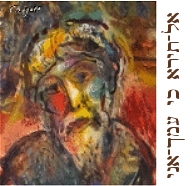
10.26.23 (Cheshvan 11, 5784) Each of us has been created by God for a sacred purpose. There is a deep reason why you were born. This explains why we sometimes feel lost and alone in this life. Our discontent, the fracture we sense both within and around us, our sorrows, suffering, and inevitable losses, all of it together, presents a "message" to our souls, a "basso profundo" groan of the heart, a visceral yearning for healing, for eternal life, for heaven... God has created us for himself, yet we find no lasting peace apart from him (Eccl. 3:11). Or as Augustine of Hippo famously put it: "Thou hast made us for thyself, O Lord, and our heart is restless until it finds its rest in thee" (Confessions). Therefore our Lord cries out to those who are hurting, troubled, and afraid: "Come to me, all who labor and are heavy laden, and I will give you rest. Take my yoke upon you, and learn from me, for I am gentle and lowly in heart, and you will find rest for your souls" (Matt. 11:28-29).
Our Torah portion for this week is called "Lekh-Lekha," which can be translated as "come to yourself," that is, turn and reconnect to your spiritual essence, your identity, your heart. We have to start the journey there, because ultimate reality is intensely personal, being grounded in the "who-ness" of God. It is within the consciousness of our own "I am," our deepest identity as a personal, thinking, and feeling being, that we are able to relate to the person and heart of the great "I AM" of the LORD.
Abram is an exemplar of faith for us; he is called the "father of faith" (Isa. 51:1-2; Rom. 4:16; Gal. 3:29). Abram courageously searched for God in his emptiness, and God graciously answered the cry of his heart. He left everything behind as he journeyed into the realm of promise - regarding himself as someone chosen to know God's blessing and grace. Abram was able to walk by faith because he stopped listening to the voices of the ego - the worldly and unbelieving parts of himself - and therefore was able to hear God's truth.
According to the classical sages, Abram was tested ten times in the course of his life. In the first test, Abraham was asked to "go to a land that I will show you" only to find it a place of famine and trouble. In the last of the tests, Abraham was asked to "go to the land of Moriah, to the place that I will show you," and there to offer up his promised son Isaac as a burnt offering... In each case the temptation was to give up hope in God's promise, since at the time of each test Abram did not know the outcome as a foregone conclusion. Nevertheless Abram walked in faith, in fear and trembling, yet fear contextualized by the deeper strength found in God's love and presence. Abraham had to close his eyes to this world and walk in the darkness of faith to see the divine light that transcends this realm; he had to "believe to see" that God's promise was sure.
So the journey is one of faith and the inner transformation that comes from trusting in God (בִּטָּחוֹן). "Go from your country and your kindred and your father's house to the land that I will show you" is the call of teshuvah - turning away from enslaving habits that deaden our consciousness - and to come alive by believing that which transcends own understanding. The Greek word for repentance, "metanoia" (μετάνοια) describes the process well, since it means going beyond ("meta") the habitual categories of the mind ("nous") to believe and apprehend the miracle of God. Faith discerns the unseen good that is at work behind the realm of appearances. God is the "Father of Lights" who supervises the ebb and flow of creation. He is always working to direct all things according to his purposes and will. This is the "land that I will show you," that is, the realm of blessing and eternal life.
Hebrew Lesson
Proverbs 4:18 reading (click):
God as El Shaddai...
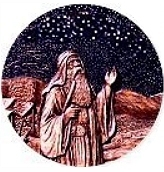
10.25.23 (Cheshvan 10, 5784) In this week's Torah (Lekh Lekha), the LORD described Himself using the Divine Name El Shaddai (אֵל שַׁדַּי), often mistranslated as "God Almighty." In Genesis 17:1, YHVH said to Abram: "I am El Shaddai. Walk before me and be perfect." But why did the LORD choose to reveal Himself using this distinctive name to Abram?
Most English translations render El Shaddai as "God Almighty," probably because the translators of the Septuagint (i.e., the ancient Greek translation of the Old Testament) thought Shaddai came from a root verb (shadad: שָׁדַד) that means "to overpower" or "to destroy." The Latin Vulgate likewise translated Shaddai as "Omnipotens" (from which we get our English word omnipotent). In other words, the translators regarded this term to suggest that God is so overpowering that He is considered "Almighty."
אֲנִי־אֵל שַׁדַּי
הִתְהַלֵּךְ לְפָנַי וֶהְיֵה תָמִים
a·nee · El · shad·dai
heet·ha·leikh · le·fa·nai · ye·he·yeh · ta·meem

"I am El Shaddai:
walk before Me and be wholehearted." (Gen. 17:1)

Hebrew Lesson:
Gen. 17:1b reading (click):
According to the Jewish sages, however, Shaddai is a contraction of the phrase, "I said to the world, dai (enough)" (as in the famous word used in the Passover Haggadah, Dayeinu -- "it would have been sufficient"). God created the world but "stopped" at a certain point. He left creation "unfinished" because He wanted us to complete the job by means of exercising chesed (love) in repair of the world (tikkun olam).
Jacob's blessing given in Genesis 49:25, however, indicates that Shaddai might be related to the word for breasts (shadaim), indicating sufficiency and nourishment (i.e., "blessings of the breasts and of the womb" (בִּרְכת שָׁדַיִם וָרָחַם)). In this case, the Name might derive from the contraction of sha ("who") and dai ("enough") to indicate God's complete sufficiency to nurture the fledgling nation into fruitfulness. Indeed, God first uses this Name when He refers to multiplying Abraham's offspring (Gen. 17:2).

Understood in this light, the name El Shaddai provides a picture of God's nurturing love for our lives... God sustains us and loves us, like a mother loves her newborn child...
El Shaddai is used almost exclusively in reference to the three great patriarchs: Abraham, Isaac, and Jacob, and (according to Exodus 6:2-3) was the primary name by which God was known to the founders of Israel (the name YHVH given to Moses suggests God's absolute self-sufficiency, whereas the name Elohim suggests God's soverign power). The word "Shaddai" (by itself) was used later by the prophets (e.g., Num. 24:4; Isa. 13:6, Ezek. 1:24) as well as in the books of Job, Ruth, and in the Psalms. In modern Judaism, Shaddai is also thought to be an acronym for the phrase Shomer daltot Yisrael - "Guardian of the doors of Israel" - abbreviated as the letter Shin on most mezuzot:
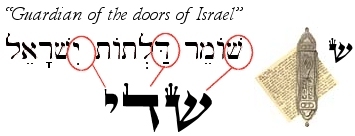 |
In connection with the Name El Shaddai (אֵל שַׁדַּי), we note that Abraham has more identifiable descendants than any other person in history... From the line of Isaac would come the twelve tribes of the Jewish people (as well as all those Gentiles who have been grafted into the covenantal blessings of Israel, i.e., the "church"), and from Ishmael would come the twelve tribes of the Ishmaelite people. Abraham also later married Keturah who bore him six more sons that became founders of six other nations of the Arab world, including the Midianites. To signify Abram's status, God changed his name from Avram ("exalted father" [from אָב, "father," + רָם, "exalted"]) to Avraham ("father of a multitude," a homonymic wordplay from אָב, "father" + המוֹן, "crowd"). Notice that some regard Avraham's name to mean "father of mercy" (from אָב, "father" + רחם, "womb").
Note: While the name El Shaddai presents a "feminine image" of the LORD, this is assuredly appropriate, since God created both genders as a reflection of His image, as it is written: "God created man in his own image, in the image of God he created him; male and female (זָכָר וּנְקֵבָה) he created them (Gen. 1:27). However, some people have made the dubious suggestion that El Shaddai should further be translated as "the many breasted One," even though such language suggests the abominable practices and idols common in various ancient fertility cults - customs that were later subject to the most severe judgment of God upon the seven Canaanite nations. It should be clear, in light of the overall context of the revelation given in the Torah, that the name El Shaddai is directly connected with the sanctity of the promise given to Abraham regarding the future growth of his family, and ultimately of the coming of the promised Seed, the Messiah...
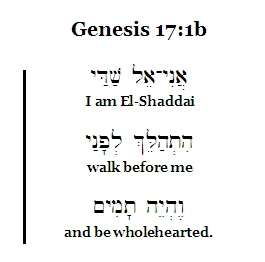 |
The Original Priesthood...
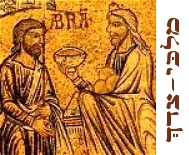
[ The following entry is related to this week's Torah reading, parashat Lekh-Lekha.... ]
10.25.23 (Cheshvan 10, 5784) Our Torah reading this week reveals that the very first "priest" (i.e., kohen: כּהֵן) was neither a Jew nor a Levite nor a descendant of Aaron, but rather Someone who is said to have "neither beginning of days nor end of life" but was made like (ἀφωμοιωμένος) the Son of God, a priest continually (Heb. 7:3). This priest, of course, was Malki-Tzedek (מַלְכִּי־צֶדֶק), the King of Shalem (מֶלֶךְ שָׁלֵם) to whom Abraham offered tithes after his victory over the kings (see Gen. 14:18).
The author of the Book of Hebrews makes the point that the priesthood of Malki-Tzedek is greater than the Levitical priesthood and is therefore superior to the rites and services performed at the Tabernacle (Heb. 7:9-11). It was to Malki-Tzedek that Abraham (and by extension, the subsequent Levitical system instituted by his descendant Moses) gave tithes and homage -- and rightly so, since Yeshua is the great High Priest and Mediator of the ultimate covenant based on God's eternal life (Heb. 8:6).
Hebrew Lesson
Genesis 14:19b reading (click):
For more on this subject, see the article, "Exploring the Identity of Malki-Tzedek."
Are you Born from Above?
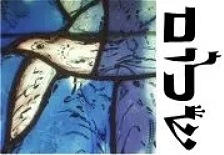
10.24.23 (Cheshvan 9, 5784) The gospel is divine power for those who believe and walk the truth of Yeshua. It is "whole-life" transforming. Knowing about God is dangerous if it does not genuinely change you. The blessing of salvation is not about becoming "well-adjusted," or happy, or made prosperous; nor is about promoting social justice or "changing the world." No, salvation is about personally receiving a radically new type of being. It's not about being "religious" or trying to be a "good person" but dying and being brought back to life by the power of the Holy Spirit.... The truth will set you free, Yeshua said, but the truth requires every bit of you. It is a process of change but it is a real one. So the question is whether you are truly being transformed by the Spirit or if you are still living like the devil? We must soberly judge ourselves lest we are found to be spiritual impostors (1 Cor. 11:31).
"Therefore, if anyone is in Christ, he is a new creation (בְּרִיאָה חֲדָשָׁה); old things have passed away; behold, all things have become new" (2 Cor. 5:17). You must be "born again," that is, have a new nature imparted to you that marks the divine regeneration (John 3). Can you honestly say: "I have been crucified with Christ; it is no longer I who live, but Christ lives in me, and the life which I now live in the flesh I live by faith in the Son of God, who loved me and gave Himself for me" (Gal. 2:20)? This is a matter of life and death, dear friend, and there nothing is more important than whether Yeshua indeed lives within your heart and soul... In the end this is the essence of genuine faith.
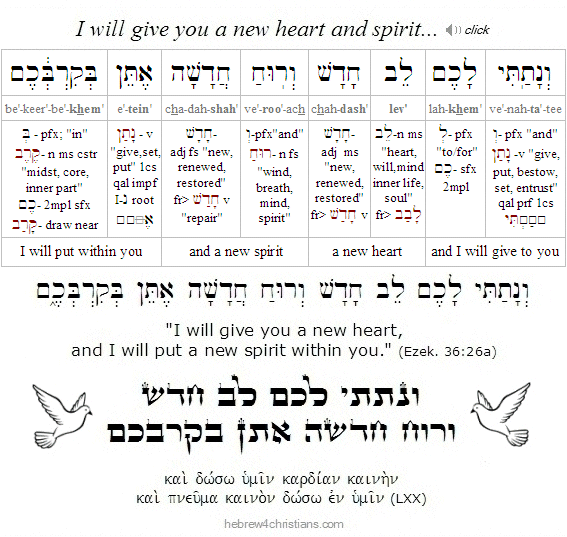 |
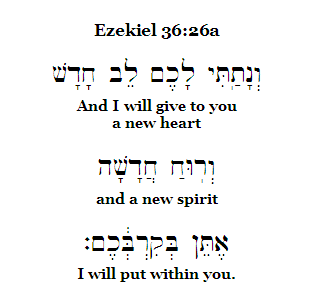 |
Our time in this world is the "Valley of Decision"; this is the place and the time for the choice to be made. So many sleepwalk their days and only wake up after they have died and realized that they had sold their soul through vanity at the cost of their eternal destiny....
I should add that the walk of faith is an ongoing concern, since there is an inner war within each of us -- the Spirit strives against the flesh and the flesh strives against the Spirit, so that "we cannot do the things we would do" (Gal. 5:17). As Yeshua said. the spirit is willing but the flesh is weak. We are a bundle of inner conflicts, ambivalence, half-heartedness, cowardice, and so on, and yet God loves us and helps us. The battle is not indicative of the absence of divine life within us, but may on the contrary indicate its presence. We always are doing teshuvah, always turning to God for life. Nevertheless, transformation is a "slow motion" process that occurs as we begin to hate sin in our lives and grieve over ourselves. Sanctification is a process, and we are still "on the Potter's Wheel." Over time we are trained in righteousness by means of God's chastisement and our self-induced sorrows. The LORD is faithful, however, and he will help us persevere as we look to Him in hope...
 |
The Meaning of "Hebrew"...
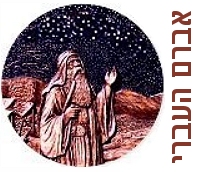
[ The following entry is related to this week's Torah reading, parashat Lekh-Lekha.... ]
10.24.23 (Cheshvan 9, 5784) In our Torah for this week (Lekh Lekha) Abram, the great patriarch of faith, is called ha-ivri (הָעִבְרִי) - "the Hebrew," a term that means "one who has crossed over" (עָבַר) from another place. Rashi literally identifies this "other place" as Ur Kasdim (אוּר כַּשְׂדִים), located east of the Euphrates River, though the midrash (Genesis Rabbah) spiritually identifies it as the realm of idolatry: "The whole world stood on one side, but Abram crossed over to the other." Abram separated himself from a world steeped in idolatry and polytheism by worshiping One God who is the sole Creator of all things.... Understood in this way, being "Hebrew" means being regarded as an "other," a "stranger," or an "outsider" to idolatrous worldly culture. That's the true meaning of the word...
Various midrashim tell the story about how Abram came to understand the truth that there is only one God who is Creator of all. For instance, when he was born, Abram's mother hid him in a cave. She was afraid that the evil king Nimrod would kill her son because prophets had warned that he would triumph over Nimrod. Guarded by the angel Gabriel, young Abram first worshiped the stars as gods until they were obscured by the Sun. Then he declared that the Sun was god until it set and the Moon took its place. Clouds then covered the Moon, showing Abram that the Moon was not a god either. At last, Abram understood that there was one supreme God would ruled over all the forces of the universe. (Later, after the danger had passed, young Abram rejoined his family.)
A midrash relates that Abram's father Terach sold idols for a living in the city of Haran. But Abram had long since realized that idol worship was foolishness. One day when he was asked to watch his father's store, Abram took a hammer and smashed all the idols - except for the largest one. His father came home and demanded to know what happened. Abram explained that the idols all got into a fight and the biggest idol won. When his father objected that this was impossible, Abram said, "Aha! So you agree with me that idols are powerless! My father, there is only one true God, and this God cannot be shaped with human hands..." Terach was angry but understood that his son had discovered the great truth of ethical monotheism.
Lekh lekha (לך־לך) literally means "go for yourself" (lit. "walk [הָלַךְ] for yourself [לְךָ]"). Rashi states that it means "Go for your own benefit," though the Chassidic teachers interpret it as "Go to yourself" (i.e., begin your own journey back to God). At any rate, it's clear that the phrase is an invitation by God to venture ahead -- to go forth in faith... Go forth and risk everything for the sake of God's promise.
"Go forth ... I will show you" (Gen. 12:1). Note that the LORD spoke to Abram and invited him to forsake his ancestral homeland for the promise of God. But note further that it was only after Abram made the long journey to the unknown land of Canaan that God appeared to him to him by the oaks of Mamre saying, "To your offspring I will give this land" (Gen. 18:1). Abram did not believe the promise because he saw God; he was only able to see God after he had walked in faith. First Abram heard the message, and later -- after he acted on his faith -- was he enabled to see more... מַעֲשֵׂה אֲבוֹת סִימָן לַבָּנִים / ma'aseh avot siman labanim: "The deeds of the fathers are signs for the children." The pattern is therefore given: First Abram heard the message, and later - after he acted on his faith - was he enabled to see more. This is the deeper meaning of being "Hebrew," one who crosses over from the realm of the dead to the realm of the Living God...
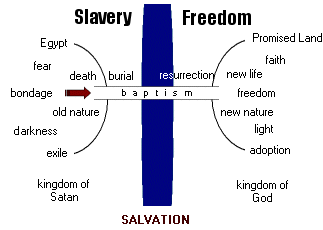 |
As a matter of textual gematria, regarding the promise to make Abraham's name great (Gen. 12:2), the sages note that the total number of Hebrew letters in the names of the three patriarchs Abraham (אברהם), Isaac (יצחק), and Jacob (יעקב) is 13. Likewise the total number of letters in the names of the three matriarchs Sarah (שׁרה), Rebecca (רבקה), Leah (לאה), and Rachel (רחל) is 13. Furthermore 13 is the numeric value for the word echad (אחד), a word that means "unity" and represents the 13 attributes of God's Mercy (Exod. 34:6-7). The combined letters of the patriarchs and matriarchs therefore totals 26, the same numeric value (in gematria) as that for the Name of God (i.e., YHVH: יהוה).
Hebrew Lesson:
Psalm 27:13 reading (click):
Do not Drift Away...

10.24.23 (Cheshvan 9, 5784) We are living in an age of peril, and for all the more reason we must "pay more careful attention to what we have heard so that we do not drift away" (Heb. 2:1). We must be anchored to the truth lest we become shipwrecked in our faith. Drifting is often imperceptible, and occurs slowly, though the end result is as deadly as openly turning away from God in outright apostasy. As C.S. Lewis once wrote, "The safest road to hell is the gradual one - the gentle slope, soft underfoot, without sudden turnings, without milestones, without signposts." The grave danger today is to quietly and invisibly give up hope, to unconsciously "go with the flow," to become comfortably numb, to fall asleep, and therefore to die inside... It is far more dangerous to ignore God's mercy, or to make a pretense of knowing God's grace, than it is to blatantly break his law. Therefore the urgent need is to remember, to hear, and to awaken the soul to face the truth about reality. We must focus the heart, concentrate the will, and consciously "set" the Lord always before us (Psalm 16:8). Each day we must awaken from our emptiness to reaffirm the central truth: "Shema Yisrael, Adonai Eloheinu, Adonai echad; and you shall love the LORD your God with all your heart and with all your soul and with all your might" (Deut. 6:4-5). "Awake, you who sleep, Arise from the dead, And Christ will give you light" (Eph. 5:14).
We must press on to secure our high calling in Messiah: "Let us know; let us press on to know (i.e., נִרְדְּפָה, "pursue after") the LORD; His going out is sure as the dawn; He will come to us as the showers, as the spring rains that water the earth" (Hos. 6:3). May God help us pursue him be'khol levavkha - with all our heart - because He has promised, "You will seek me and find me, when you seek me with all your heart" (Jer. 29:13). And may the love of the LORD indeed be upon us, even as we put our hope in Him (Psalm 32:22).
Hebrew Lesson
Psalm 33:22 Hebrew reading:
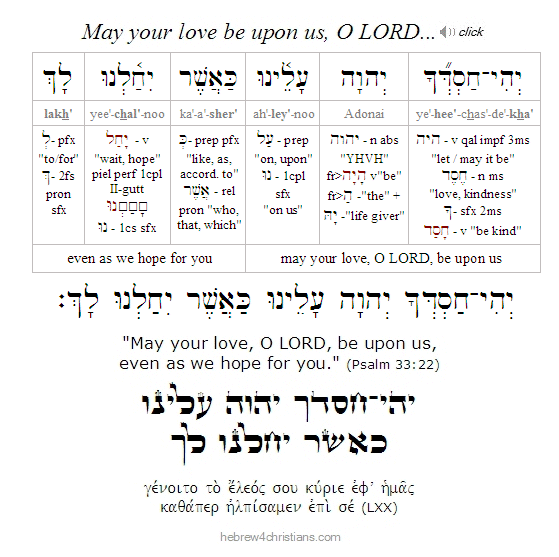 |
Smitten of Grace...
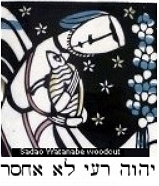
[ The most important questions probe the depths... "out of the depths I cry out..." In your struggle to understand, allow faith its space. If your conclusion leads you to obvious error (e.g., God failed me), then back up and get your thinking right about your assumptions... ]
10.24.23 (Cheshvan 9, 5784) The Lord is likened to a potter and we are as clay in his hand (Isa. 64:8). Life on the "potter's wheel" can be messy, unsettling, and sometimes excruciatingly hard, but it is God's sovereign work to form your life according to his design and purposes... (I am still on that wheel; it feels like a whirlwind within my anxious heart as I close my eyes, trusting His hands are somehow shaping me into his design and pleasure.)
Contrary to the assumption that the life of faith should always be triumphant, we all inevitably will experience various setbacks, pratfalls, troubles and sorrows in our lives. This does not mean that God does not care for us however, because on the contrary, this is by his design; a plan supervised by God's love and blessing, and the afflictions we therefore encounter are part of his work for our good (Rom. 8:28; Heb. 12:6). A principle of spiritual life is that we descend in order to ascend, or the "the way up is the way down." It make seem counterintuitive, but the heart of faith gives thanks for all things - the good as well as the evil (see Job 2:10). We affirm: "This too is for the good," yea, even in the midst of our struggle, no, even more -- precisely in the midst of our struggle -- for this, too, is for our good. Faith is the resolution to trust in the reality of God's goodness even during hard times when we feel abandoned or lost (Isa. 50:10). God uses the "troubles of love" (יִסּוּרֵי אַהֲבָה) for our good - to wake us up and cling to him all the more, since this is what is most essential, after all...
The difficulty of personal suffering is intensely intimate: how do you keep hope in the midst of this tension? "Lord I believe; help my unbelief" (Mark 9:24). How do you affirm that your heavenly Father will heal you but at the present hour you must endure suffering? Do you devise a "soul-building theodicy" seeking to explain your struggle – providing an answer about the "why" of your suffering – or do you attempt to sanctify suffering as a means of healing others by the grace of the Messiah (Col. 1:24)? Or do you wither in your despair? As Soren Kierkegaard said, "It is one thing to conquer in the hardship, to overcome the hardship as one overcomes an enemy, while continuing in the idea that the hardship is one's enemy; but it is more than conquering to believe that the hardship is one's friend, that it is not the opposition but the road, is not what obstructs but what develops, is not what disheartens but ennobles" (Four Upbuilding Discourses, 1844).
When Yeshua victoriously proclaimed, "It is finished" just before he died on the cross, he foreknew that his followers would experience a "purging process," a "refining fire," and time on the "potter's wheel" to perfect their sanctification. At the cross of Yeshua death itself was overcome – and all that it implies – and yet it is nevertheless true that we will suffer and die and that death persists an enemy (1 Cor. 15:26). While we celebrate the reality of the final redemption, the "instrumentality of our sanctification" needs to be willingly accepted and endured. I say "endured" here because I don't think we will ever have a complete answer to the question of "why" we undergo the various tests we face in this life. Our disposition in the midst of this ambiguity, in the midst of seemingly unanswered prayers, is where our faith is disclosed: will we despair of all temporal hope or not? Will we console ourselves with the vision of a future without tears and loss – a heaven prepared for us? Will we trust God with our pain and submit to his will, or will we "curse God and die" inside – losing hope and despairing of all remedy?
God forbid we should give up now, friends! Faith "sees the unseen" and believes that the day of our ultimate healing draws near. You are in good hands as the Lord forms your soul for the glory of his purposes... Stay strong and keep your hope alive (Psalm 27:14).
Hebrew Lesson
Isaiah 64:8 Hebrew reading:
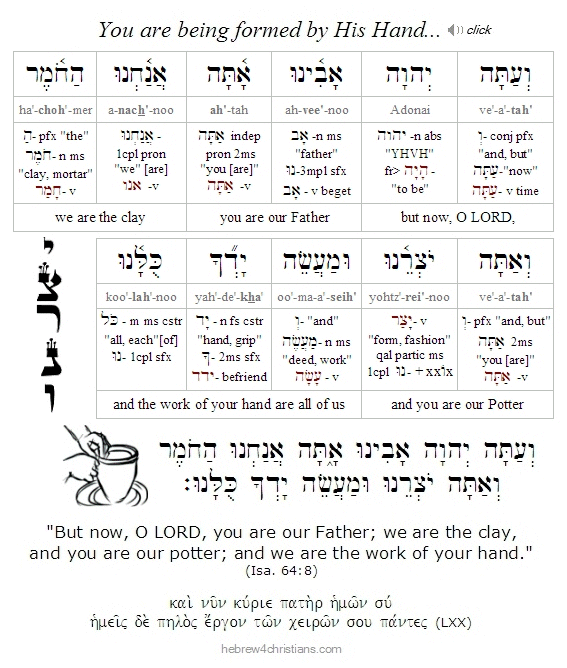 |
Health Update: I went to the hospital yesterday for help with an eye infection (one eye completely shut). I am still suffering and have a lot of discomfort. Sleep is difficult but I am trusting in God's providential hand and healing in all things. Thank you for your prayers.
Living in Yeshua's Heart...

10.23.23 (Cheshvan 8, 5784) Yeshua likened His relationship with his followers in terms using the metaphor of a vine and its branches: "I am the true Vine (הַגֶּפֶן הָאֲמִתִּית), and you are the branches" (see John 15:1-5). We derive our identity, life and strength from being made part of His life...
The purpose of the branch is to be a conduit of the life of the vine. Vine branches by themselves are of little value, apart from the manifestation of fruit; they cannot be used for building things and otherwise are regarded as bramble (Ezek. 15:2-4). Notice further that the vine branch cannot bear good fruit while it remains on the ground: it must "climb" upward and be elevated. And if you look closely at a vine, it is often difficult to see where the vine ends and the branches begin. The life of the branch becomes "entangled" in God's love as it bears spiritual fruit from the sustenance of the True Vine (הַגֶּפֶן הָאֲמִתִּית). When we abide in, or are truly connected with, Yeshua as the Source of life, we bear the fragrance and sweet-smelling savor of heaven itself...
"I am the vine; you are the branches. Whoever abides in me and I in him, he it is that bears much fruit, for apart from me you can do nothing" (John 15:5). Note that the expression "apart from me" (χωρὶς ἐμοῦ) means being in a state of separation from Yeshua, which is likened to spiritual death... It is the death of possibility, the absence of power to yield true good to the world, and so on. This is what is meant by "you can do nothing" (οὐ δύνασθε ποιεῖν οὐδέν), that is, you can do nothing of any lasting significance or worth... There is simply no true life apart from the Savior who is the Source of divine life.
Whatever you might be going through, friend, may you find your true life and peace in Yeshua's heart. Amen.
Hebrew Lesson
Matthew 11:28 Hebrew reading:
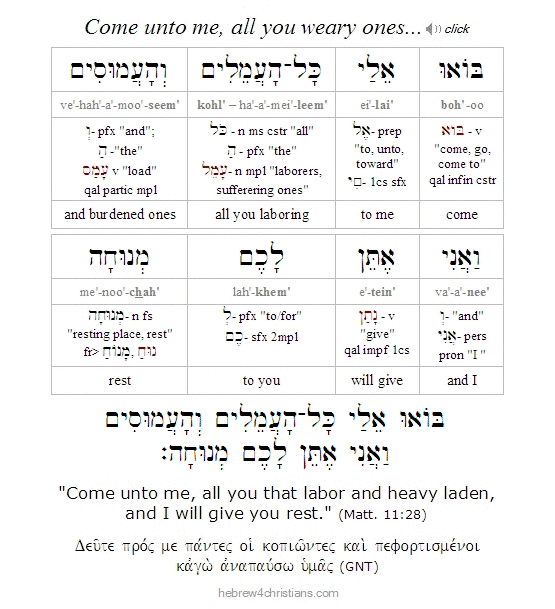 |
Parashat Lekh-Lekha...
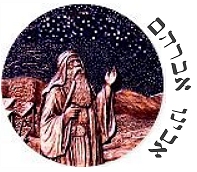
10.22.23 (Cheshvan 7, 5784) Shavuah tov, chaverim. Last week's Torah portion (i.e., parashat Noach) introduced us to Abram (אַבְרָם), the descendant of Noah's son Shem, who was the great-grandson of the patriarch Methuselah - a man who who personally knew Adam and Eve and upheld the original promise of redemption given in the Garden of Eden. Just as there were ten generations from Adam to Noah, so there were also ten generations from Noah to Abram (see Gen. 11:10-32). And just as Noah became the father of 70 nations, so Abram (through Shem) would become the father of the Jewish people, through whom the Promised Seed - the Messiah and Savior of the world - would eventually come.
In our Torah portion for this week (Lekh-Lekha), we read that Abram was 75 years old, married to (his half-sister) Sarai, and guardian of his nephew Lot (his deceased brother Haran's son) when he received the promise of divine inheritance: "And the LORD said to Abram, "Go from (i.e., lekh-lekha: לך־לך) your country and your kindred and your father's house to the land that I will show you. In Hebrew, the phrase lekh lekha means "go for yourself" (lit. "walk [הָלַךְ] for yourself [לְךָ]"), though it can be interpreted it to mean "go to yourself," that is, "look within yourself" in order to begin walking out your own journey into the promises. The realm of divine promise is only attained when we venture out in faith. Like our father Abraham, we are called to "cross over," leave everything behind, and take hold of God's glorious promise for our lives.
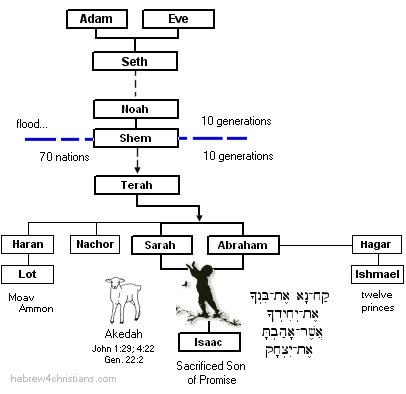 |
Hebrew Lesson:
Genesis 12:1a reading (click):
Health Update: I've been sick with the flu lately, but last night I developed an eye infection complication: my left eye is now nearly swollen shut. I have contacted a health care provider for an office visit but I am unsure when that will be scheduled. Please pray that my eye is healed quickly, as it is difficult to work with only one eye functioning. Thank you. - John
Broken and Remade...

[ "Our life is a short opportunity to say 'yes' to God's love. Our death is a full coming home to that love." - Henri Nouwen ]
10.22.23 (Cheshvan 7, 5784) In the 2004 Israeli movie "Ushpizin," a poor baal teshuvah (returning Jew) named Moshe Belanga and his wife Mali pray to have enough money to build a sukkah in order to observe the holiday of Sukkot ("Tabernacles"). Their prayers were answered when they received a mysterious gift of money, though the blessing initiated a sequence of mishaps that tested their patience to the breaking point...
Upon building their sukkah and purchasing an exceptionally beautiful etrog (one of the four species required for the holiday), Moshe and Mali got ready for their first meal of Sukkot. However, they were unexpectedly visited by a pair of escaped convicts, one of whom had known Moshe in his old days, when Moshe was not practicing the faith. The convicts become guests (ushpizin) in the sukkah, creating a "balagan" (mess) and straining Moshe and Mali's relationship. After making a noisy scene in their neighborhood one day during the holiday, Mali discovered that the two men were escaped convicts wanted by the police, and she decided to leave Moshe, despite his heartfelt appeals for her not to go.
After his world had fallen apart, Moshe went to see his rabbi who listened to his plight and then offered him counsel by reading to him from a holy book: "When a man changes something within himself he progresses, right? He thinks he has earned some rest. But it's just then that he's given a harder test.... There is no rest in this world, no rest..." He then goes on to say, "Above all, Moshe, don't get angry! Don't get angry. Ribbono shel olam (Master of the universe), save us from anger! Save us from anger!"
After this meeting with the rabbi, Moshe was tested yet again when he learned that his two guests had unwittingly destroyed his beloved etrog - a symbol of his hope. Moshe then began to burn with anger, but ran away groaning and in agony of heart.
When he finally reached an isolated place, he began frenetically pacing back and forth, repeating crying out to God: "Ani loh mavin!" I don't understand! I don't understand! He then asked God: "What do you want from me? I just don't get it! Have mercy; explain it to me! I don't want to be angry, God Almighty, I don't want to be angry! Have mercy upon me..." In brokenness of soul he repeatedly muttered "have mercy upon me..." Moshe left the place in silence, shattered, broken, a "klume" (nothingness), empty, devoid of everything.
And it is then, in this place of utter helplessness that his wife Mali returned to him and told him that she was pregnant with his child. This was their deepest hope, symbolized by the etrog which was thought to portend fertility and blessing, and it was realized despite all their troubles. Paradoxically it was from the loss of his hope that his hope was found, and God brought good out of all his suffering. It's a happy ending. Moshe is delivered from his pain when he surrendered everything to God. His wife Mali also is restored to her love and would bear the blessing of an heir for the family.
Yes, it's a happy ending. God works all things for the best: "gam zu l'tovah!" We get angry, then, when we lose sight of the big picture. What we sometimes interpret as evil or suffering is a means to the greater end of happiness and fulfillment. That sounds good, but let's ask a serious question: Do we need an explanation to exorcise our anger? Does "understanding" why suffering and troubles occur deliver us from the inner rage of our hearts? Or put another way, is evil really a form of ignorance of the hidden good?
Psychologically considered, we may experience anger when we do not get our own way, especially when we believe we have a right to our expectation... We are treated unfairly; someone deliberately hurts us; we are abused, and so on, and our anger cries out for justice to be done and for the vindication of our will. Sometimes such anger may be justified, but often it goes astray because it is centered on the ego. Understood this way, anger becomes a form of idolatry: "My will be done; My kingdom come." Sin makes fools of us all, for the fool says in his heart there is no God (Psalm 14:1).
How do we overcome anger then? How can we escape from our own inner torment of heart? Only by a miracle. When we turn away from ourselves in brokenness, when we deny ourselves in surrender to God, we are transformed, and we are set free.
And yet it is a struggle to truly surrender. Though we have faith that God is somehow for us and with us in all things, there are moments, perhaps born of temptation, in which we feel utterly alone, lost in the abyss of sorrow, and haunted by profound regret over our lives. In our frailty we wonder how we will make it to our heavenly home, especially when the dark moment in the desert arises - this wilderness of temptation - so that even if we were to shout over the whole world, we fear no voice would answer to comfort us...
And should we seek solace from others, we soon realize the private language of our pain; we sense that others ought not be roused by our grief, for they are powerless to balm our wound, and therefore we drift away into inner silence, alone with the groan of our heart. In a moment of grace we may "come to ourselves" and realize there is nowhere to go but to God who is always present, and it is God alone who can comfort us in the depths of our hearts. His assurance comes as we turn to him, away from the pain of our lonely exile.
All of us suffer in this life; each experiences heartache that is unique to their own personal story. But what is the meaning of our pain? What are we to learn from it? For some, the lesson is that they were wronged and they seek restitution for their suffering. Focusing on the specific circumstances of the hurt, however, leads to anger and vindictive feelings.
Healing comes when we begin to understand that our personal pain connects us to the suffering inherent in the human condition. It then becomes a matter of indifference regarding the reasons for our wounds when we begin understand that we all bear woundedness that affects the lives of others. "Hurt people hurt people" -- until they learn to surrender their sickness of heart. "Father forgive them, for they know not what they do," said Yeshua from the cross (Luke 23:34). Yeshua suffered the weight of the greater wound of sinful humanity, and it is through his suffering we are made whole.
When you feel oppressed by sorrow or fear, say with assurance "the Lord cares for me." Cast your burden on him and he will sustain you. Refuse to stagger beneath the weight of earthly fear... Yes, God cares for you. This is the message of the gospel, after all; this is the heart of the cross: God himself cares for you. Consider the one who personally bore your shame and sin and suffered such anguish for you to be healed. He will never leave nor forsake you; he ever lives to make intercession for you (Heb. 7:25).
The Lord has not forgotten you who mourn and are poor of spirit. He who feeds the sparrows and tends the lilies of the field will provide for your needs. Resist the whispers of despair: affirm again the greatness of God who tenderly watches over you as a good shepherd cares for his sheep. Even if you are in distress, affirm the greatness of God. Trust that he will bind up your wounds and make whole your broken heart. Do not countenance the thought his grace is not sufficient for all your troubles. God is forever faithful; he promises are sure; the one who has begun a good work in you will complete it. Press on in the confidence of God's unfailing love given to you in Yeshua. Amen.
Hebrew Lesson
Psalm 34:18 reading (click for audio):
The Way of the Righteous...
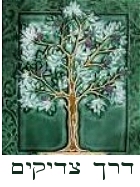
[ I've been sick with a fever, cough, and body aches the last few days. Your prayers for this ministry and for my healing are sincerely appreciated, chaverim. - John ]
10.21.23 (Cheshvan 6, 5784) How we think about things matters. Our thoughts determine how we see, feel, interpret, reason -- and choose. In a sense, our thoughts express who we really are: they are "inner verbalizations" that reveal our character. And since our thoughts lead to feelings that are inevitably expressed in actions, our actions ultimately express what we believe (at least at any given moment in time). To change undesirable behavior, we often need to back up and detect erroneous assumptions that underlie and justify our choices. Often these assumptions operate on a "pre-conscious" level of awareness. We must slow down and ask ourselves what we are really thinking and believing whenever we consider the choices we are making. But the two are inextricably linked together: our thoughts determine our actions and our actions express our thoughts...
Psalm One stands as a sort of "preface" to the entire Book of Psalms (ספר תהילים) by first of all extolling the way of the righteous (i.e., derekh tzaddikim: דֶּרֶךְ צַדִּיקִים) in contradistinction to the way of the wicked (i.e., derekh resha'im: דֶרֶךְ רְשָׁעִים). It is therefore a foundational Psalm that is intended to encourage us to separate ourselves from the ways and customs of the prevailing godless insanity and culture (2 Cor. 6:17).
Notice that the very first verse of the very first Psalm declares that the happy or fortunate person (ashrei ha-ish) neither "walks" (הָלַךְ) in the counsel of the wicked, nor "stands" (עָמָד) in the way of sinners, nor "sits" (יָשָׁב) in the seat of the scornful: "Blessed is the man who does not walk in the counsel of the wicked, nor stand in the way of sinners, nor sit in the seat of the scornful" (Psalm 1:1).
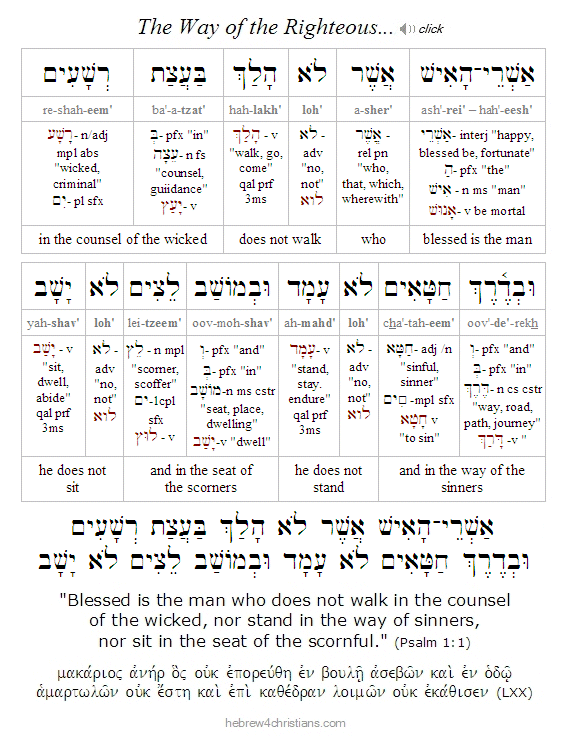 |
Although King David used parallelism in this verse, we note that the verbs "walk," "stand," and "sit" mark an unmistakable progression -- or rather a regression away from the upward walk of the righteous to a place of murky despair, cynicism and bitterness.... Looked at from the reverse perspective, the ungodly first heed wicked counsel and then walk in its doctrine and presuppositions. This causes them to slow down and "stand" in a sinful state (i.e., to dwell/abide in a state of ignorance). The sense of life's urgency is lost to them: there is no place to "go," no development, no "goal" or purpose to life... Finally, the wicked decide to "sit" down, or "dwell" in their misery with an abiding scorn.
Note that the righteous - the tzaddikim (הַצַּדִּיקִים) - do not "walk" in the "counsel of the wicked." In other words, since they live by a different set of axioms, they realize that the thoughts of the wicked are grounded in fallacious assumptions about reality. And since thought ultimately determines action, the repudiation of the assumptions of the wicked inevitably leads to a different lifestyle or "walk" for the righteous. This is the collision of faith between the righteous and the world system I've written about elsewhere.
Second, since the righteous man walks according to a different set of principles (i.e., the counsel of the godly), he will not be found "standing" in the way of sinners. Since the "way of sinners" (דֶרֶךְ חַטָּאִים) is essentially one of ignorance (i.e., sin [חֵטְא] is "misses the mark"), the righteous soul actively discerns and walks by the truth about reality. Such discernment often means rejecting the status quo and therefore standing apart from the crowd. This is suffering "outside the camp" of the world, the lonely place of faith that leads the righteous to separate themselves from the "groupthink" and self-deception of the crowd.
Third, because the righteous walk differently - away from the crowd - they will not be found "sitting" with the scorners. The word translated "sits" (יָשָׁב) can also be translated as "dwells." The word translated "scorner" is leitz (לֵץ), a cynic who mocks (yalitz) everything in a show of superficial superiority. The leitz is unteachable and arrogantly considers himself as better than others. The Book of Proverbs (ספר משלי) regards him as an incorrigible fool. The way of the righteous is one of humility and genuine love for others created b'tzelem Elohim (in the image of God). Sanctified speech upbuilds others and expresses good will.
We depart from the way of the righteous whenever we heed of the counsel of the wicked -- whenever we begin making their words our own by uncritically listening to them.... When we attend to various news reports from the mass media, or when we unthinkingly accept the prevarications of politicians, for example, and passively accept their distorted versions of reality, we are "taking counsel of the wicked." The same can be said regarding heeding the messages of the advertisers, of television shows, movies, popular music, medical "experts," and so on. Often the messages are subliminal and attempt to cajole us to accept alternative versions of reality... Is it any wonder that television is referred to as "programming"? Advertisers, politicians, educational psychologists, sociologists, social engineers, etc., all understand that manipulating how people think determines what they will eventually do... Getting you to uncritically accept their messages is the first step to entrapping you.
If we are not careful, we might find ourselves believing the twisted versions of reality that are passed off as being "true" in the world. If we find ourselves complaining, murmuring, or despairing over things of this world, we are seeing the evil that we are "scripted" to see, and therefore we become wicked ourselves. The "counsel of the wicked" is assimilated into our thoughts, our words, and our actions... Whom we listen to is of vital importance!
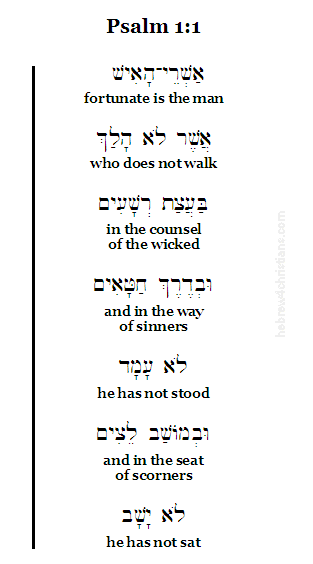 |
The way of the righteous is "faith, hope, and love" (1 Cor. 13:13). Hakarat tovah (הַכָּרַת טוֹבָה) is a Hebrew phrase that means "recognizing" or "receiving" the good, i.e., gratitude. Hakarat tovah is one of the middot ha-lev (qualities of heart) that should mark the lives of those who are grace-based and focused. Gratitude is the product of joy (i.e. chara: χαρα) obtained from the gift of being conscious of God's grace (i.e., charis: χαρις). Faith accepts that all things work together for good - gam zu l'tovah ("this too is for the good") and therefore rejects assumptions that create bitterness and anger.
The sages note that Psalm 1:1 could have been written as, "Cursed is the man who walks in the way of the wicked, who stands in the way of sinners, and who sits in the seat of the scornful," but King David took a healing approach by stating positively what needs to be corrected in our lives. Positive criticism focuses on the potential for good we see in others. Using harsh words of rebuke leads to pain and misunderstanding. Our speech needs to be sanctified -- edifying and building up hope in others (Eph. 4:29). The essence of Torah is mercy, and therefore we should always judge others (including ourselves) in the best possible light. Hakarat tovah means recognizing the good in others and choosing to see with ayin tovah (עין טובה) a "good eye."
Focusing on God - elevating our thoughts - delivers us from the path of the wicked to the realm of divine happiness. God has told us that we can escape from the pervasive counsel of the wicked by finding delight (חֵפֶץ) in the "law" (i.e., Torah, תּוֹרָה) of the LORD:
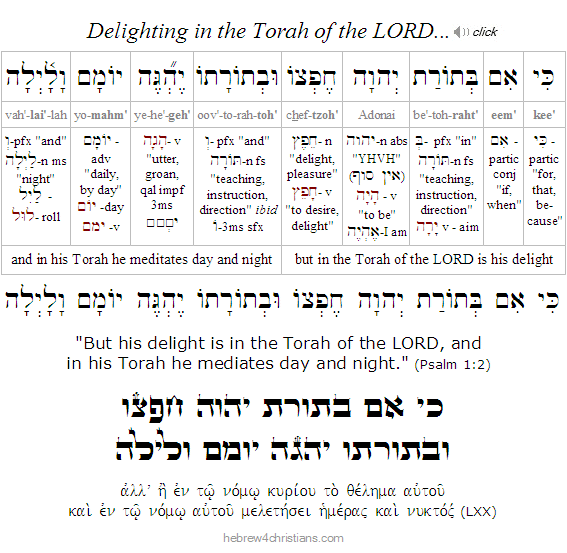 |
The truly happy person - ashrei ha-ish (אַשְׁרֵי־הָאִישׁ) finds delight in the Torah of the LORD. Note that the Hebrew word asher (אָשֵׁר) means to go straight, to walk or press on, or to make progress. Pressing on in righteousness leads us to true happiness, a state of blessedness. The "happy man" represents the ideal man of God who is not ensnared by the ways of the wickedness that surrounds him. His victory over the world is found in his faith (1 John 5:4). The way forward is the Torah-perspective.
Note further that the word "delight" is linked with the use of our tongues, which is of course directly connected with the words that verbalize our thoughts... מִי־הָאִישׁ הֶחָפֵץ חַיִּים אהֵב יָמִים לִרְאוֹת טוֹב׃ / "Who is the man who is eager for life, who desires days of good?" נְצר לְשׁוֹנְךָ מֵרָע וּשְׂפָתֶיךָ מִדַּבֵּר מִרְמָה׃ / "Guard your tongue from evil, your lips from deceitful speech" (Psalm 34:12-13). Again, our thoughts/words determine our character, which in turn are expressed in our actions. Listening to the truth, filling our hearts with God's word, setting our affections on heavenly reality, thinking on worthy things -- all are remedies for the clamor and chatter and fallacies so prevalent in our world today. Consciously heeding to the message of God's truth elevates us from the morass of disinformation, propaganda, and deception that is used to control and manipulate the crowd.
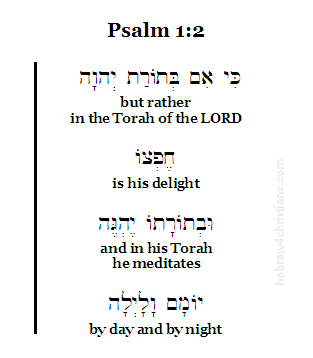 |
Psalm One closes with a great prophecy: כִּי־יוֹדֵעַ יהוה דֶּרֶךְ צַדִּיקִים וְדֶרֶךְ רְשָׁעִים תּאבֵד / "For the LORD knows the way of the righteous, but the way of the wicked is doomed":
Who we listen to matters; how we think matters. Many of us have become so conditioned and influenced by the world that we don't even realize we are under its spell! Refuse the counsel of the wicked; do not heed the propaganda and messages of those who attempt to instill fear within you. There is no fear in God's love, and God's love and glory fills the earth (Isa. 6:3)! Take every thought captive to the obedience of Messiah. Walk in His love (Eph. 5:2); stand in His truth (Eph. 6:14), and dwell in His promises (Eph. 1:20; John 15:4-10). For the LORD is our Teacher and we are his students. So let us work hard to obtain a Torah perspective on life! Amen v'amen!
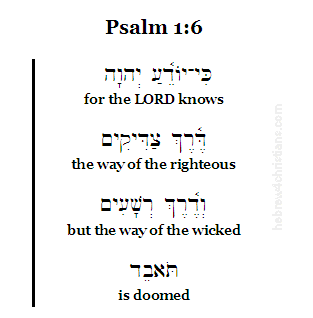 |
Psalm 1 Hebrew Study Reader
I have written a Psalm 1 study page for students of Biblical Hebrew that I hope will be helpful. The Hebrew text is given for each verse, with Hebrew grammatical helps listed as footnotes (see reader link below). A separate table is provided at the end listing the Hebrew vocabulary used in the Psalm. My goal is to help people learn to fluently read the Hebrew text without relying on interlinear helps...
The Last Word of Truth...

10.20.23 (Cheshvan 5, 5784) Though people assume they are "free to believe" whatever they want about the meaning and purpose of life, Ultimate Reality will always have the last word... Our Scriptures clearly teach that people ignore God at their own peril, and that we are therefore responsible to believe the truth and to reject what is false (1 John 4:6). This implies that we have a moral and spiritual duty to think clearly and not abuse our minds (Phil. 4:8; Rom. 12:2). God made us so that we could discern truth about reality. The mind functions according to logical laws because it is made in the image and likeness of God Himself... God Himself is the ground of all logic, since He created reality and structured the world to be knowable according to its laws. As it is written: "In the beginning was the word/logic (ὁ λόγος), and the λόγος was with God, and the λόγος was God" (John 1:1). God created a world that exhibits order and great beauty. And since human beings were created b'tzelem Elohim (בצלם אלוהים), in the image of God, our thoughts (and the words used to formulate our thoughts) as well as our actions are intended to exhibit order and beauty. It is written in our Scriptures that people perish because "they refuse to love the truth and so be saved" (2 Thess. 2:10-12). Therefore the issue of truth - physical, moral, aesthetic, spiritual, etc. - is central to salvation itself...
No one "invented" the laws of logic, but logical inference is presupposed in any form of declarative utterance (the denial of this axiom is self-stultifying and self-refuting). Since therefore the use of language presupposes the truth and validity of logic, every utterance we make is grounded in transcendental (i.e., non-empirical, intuitional, revelatory) meaning and significance (Psalm 19:2-3). In the world to come you will be shocked to understand that everything you thought, everything you said, and everything you did was given to you from above, and therefore has tremendous significance. Therefore, let us pray as dear King David prayed: "Let the words of my mouth and the meditation of my heart be acceptable in your sight, O LORD, my Rock and my Redeemer" (Psalm 19:14).
Hebrew Lesson:
Psalm 19:14 Hebrew reading:
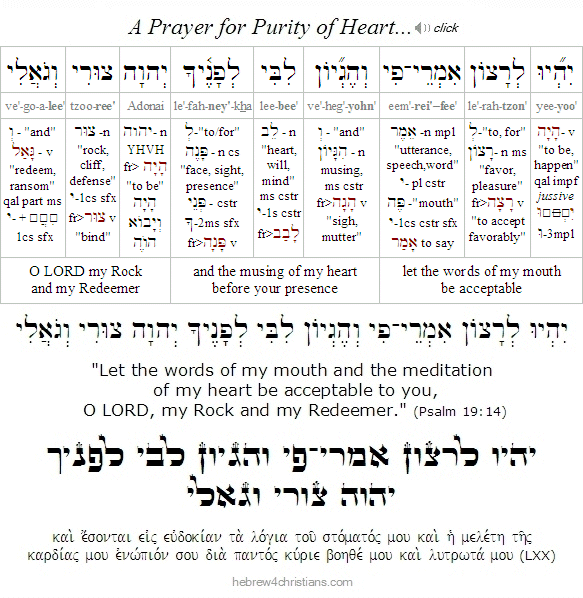 |
May it please God to help us use our words for the purpose of strengthening and upbuilding (οἰκοδομὴν) one another (Eph. 4:29). May our words always be gracious and "seasoned with salt" (Col. 4:6). Dear Lord, awaken our hearts. As it is written: "Whoever keeps His word, in him truly the love of God is perfected" (1 John 2:5).
As the Days of Noah...

[ The following is related to our Torah reading for this week, parashat Noach... ]
10.19.23 (Cheshvan 4, 5784) "For as were the Days of Noah (ימֵי נחַ), so will be the coming of the Son of Man. For as in those days before the flood they were eating and drinking, marrying and giving in marriage, until the day when Noah entered the ark, and they were unaware until the flood came and swept them all away" (Matt. 24:38-9). Yeshua told us that the "Days of Noah" were marked by people who were asleep, blind, and unaware (ἔγνωσαν, "agnostic") of spiritual truth. They lived their days oblivious to Reality. They "forgot" who God was, who they were, why they existed, and where they were going. They engaged in deception, violence, theft, and rampant promiscuity. Such is our world today...
The deadening effects of sin leads to moral and spiritual blindness that leads to corruption and unthinking brutality and violence. Of Noah's generation it was written "The LORD saw that the wickedness of man was great in the earth, and that 'every intention of the thoughts of his heart was only evil continually' (כָּל־יֵצֶר מַחְשְׁבֹת לִבּוֹ רַק רַע כָּל־הַיּוֹם). And the LORD regretted that he had made man on the earth, and it grieved him to his heart... the whole earth was corrupt before God, and filled with violence" (Gen. 6:5-6, 11). Rashi understood the word "corrupt" (i.e., shachat: שָׁחַת) to primarily refer to sexual immorality (i.e., idolatry) and "violence" (i.e., chamas: חָמָס) to primarily refer to theft and robbery. In general, however, the sages regarded the word chamas to refer to lawlessness, that is the denial of moral reality, and consequently the benighted condition of living without yirat ha'shamayim (the fear of heaven). When people are spiritually dead, they are unconscious of the wonder of God; they are oblivious to what is real; and consequently they are debased into animals...
Hebrew Lesson:
Gen. 6:11 Hebrew reading (click):
The Days of Creation...

10.19.23 (Cheshvan 4, 5784) Jewish tradition has long held that human history (olam hazeh) would endure for 6,000 years - from the time of the impartation of the neshamah (soul) to Adam in the Garden of Eden to the coming of the Messiah. There were two primary arguments for this view of history. First, the sages argued that a "divine day" (יוֹם) equaled 1,000 years based on Psalm 90:4: "A thousand years (אֶלֶף שָׁנִים) in your sight is as a day (i.e., ke'yom: כְּיוֹם)." They reasoned that since man was made in the image of God, and the Torah describes six days of creation followed by a day of divine rest, mankind (as a whole) was therefore allotted 6 x 1,000 years (i.e., 6,000) for "works" to be established in the world, followed by a 1,000 year Shabbat (Sanhedrin 97a, Rosh Hashana 31a). The ancient Seder Olam Rabbah catalogs historical events from the start of Creation according to the 6,000 years of history. Humanity will have its time of reign on earth for 6,000 years and then the Messiah will begin his reign in the 7th millennium, a "Sabbath" of sacred history. Later midrash goes along with this basic outline: "Six eons for going in and coming out, for war and for peace. The seventh eon is entirely Shabbat and rest for life everlasting" (Pirke de Rabbi Eliezer). The Apostle Peter may also have had this in mind when he wrote, "With the Lord one day is as a thousand years, and a thousand years as one day" (2 Pet. 3:8).
Second, the Jewish mystics argued that there are six letters in the first word of the Torah, bereshit (בראשׁית), and since there are six Alephs (א) in the very first verse of the Torah, and that each Aleph (אלף) represents 1,000, there must be 6,000 years of human history. The Zohar states, "The redemption of Israel will come about through the mystic force of the letter "Vav" [the sixth letter of the Aleph-bet, corresponding to the sixth Aleph] in the sixth millennium. Happy are those who will be left alive at the end of the sixth millennium to enter the Shabbat, which is the seventh millennium; for that is a day set apart for the Holy One to effect the union of new souls with old souls in the world" (Zohar, Vayera 119a).
So according to both the sages and the mystics, human history will persist for 6,000 years - 1,000 years for each day of creation - followed by a 1,000 year "Shabbat" that represents the Messianic Age of global and universal peace. After the Messiah appears, there will be peace on earth, and all the promises of God given through the prophets will be fulfilled. It is worth noting that in the discussion from the Talmud, the 6,000 years of human history are divided into three epochs of 2,000 years (i.e., two days) each. The period of "tohu" (ימי טוהו) occurred from the time of the fall of Adam until the call of Abraham; the period of "Torah" (ימי תורה) occurred from Abraham until the time of the destruction of the Second Temple, and the period of the "Messiah" (ימי המשיח) refers to the time when the Messiah could appear to Israel before the Kingdom is established in Zion.
Note that the time immediately preceding the appearance of the Messiah will be a time of testing in which the world will undergo various forms of tribulation, called chevlei Mashiach (חֶבְלֵי הַמָּשִׁיחַ) - the "birth pangs of the Messiah" (Sanhedrin 98a; Ketubot, Bereshit Rabbah 42:4, Matt. 24:8). Some say the birth pangs are to last for 70 years, with the last 7 years being the most intense period of tribulation -- called the "Time of Jacob's Trouble" (ימי צרת יעקב, from Jer. 30:7). The climax of the "Great Tribulation" (הצרה הגדולה) is called the great "Day of the LORD" (יוֹם־יהוה הַגָּדוֹל) which represents God's wrath poured out upon a rebellious world system. On this fateful day, the LORD will terribly shake the entire earth (Isa. 2:19) and worldwide catastrophes will occur. "For the great day of their wrath has come, and who can stand?" (Rev. 6:17). The prophet Malachi likewise says: "'Surely the day is coming; it will burn like a furnace. All the arrogant and every evildoer will be stubble, and that day that is coming will set them on fire,' says the LORD Almighty. 'Not a root or a branch will be left to them'" (Mal. 4:1). Only after the nations of the world have been judged will the Messianic kingdom (מלכות המשיח) be established upon the earth. The remnant of Israel will be saved and the 1000 year reign of King Messiah will then commence (Rev. 20:4).
 |
As for the exact timing of these events, "no one knows the day or hour." In fact, various Jewish sages have argued for "missing years" in the prophetic calendar (due to periods of exile or other factors) and therefore they say that the Day of the LORD may be delayed on account of national sins. For example, based on the gematria of the first two words of a verse from the Torah (i.e., וְהָיָה עֵקֶב, Deut. 7:12) Rashi explained that the 2,000 years of the Days of Messiah actually began 198 after the destruction of the Second Temple. "198 years after the destruction of the Temple the bells of the Messiah will be heard" (i.e., the days of the Messiah would begin). According to Rashi, the delay was the result of Israel's sin. (On the other hand, many ultra-Orthodox Jews believe they can "hasten" the Messiah's appearance through special acts of teshuvah: "Mashiach Now!").
Since the sages of Jewish tradition state that the "days of Messiah" (ימי המשיח) began after 4,000 years of history (i.e., after four "days"), we can understand the fervent Messianic expectation among the Jewish people during the first century in Judea. The Essenes were eagerly awaiting the advent of the "Teacher of Righteousness" and the "Zealots" wanted to establish the Kingdom of God by force of arms. if necessary. Even the common people of Israel expected that the Messiah would come soon appear to ransom captive Israel. It was in this context, then, in the "fullness of time" (Gal. 4:4), that our Lord Yeshua began His earthly ministry as the Suffering Slave (העבד הסובל) who redeemed us from the "tochechah," or the judgment of the law that held us captive (see: Lev. 26:14-45; Isa. 52:13-53:12; Gal. 3:13, Col. 2:14; 1 Pet. 2:24).
Hebrew Lesson
Psalm 90:4 reading (click):
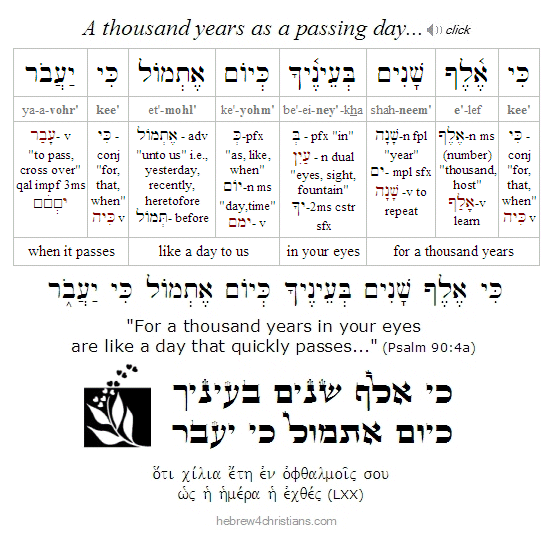 |
So to quickly review what has been said, both Jewish tradition (i.e., masorah: מָסוֹרָה) and ancient Jewish commentary (i.e., midrash: מִדרָשׁ) say that the six days of creation described in the Torah parallel six millennia of human history. The first day (היום הראשון) God created light which stands for the first thousand years that Adam lived: "He was the light of the world because he recognized his Creator." On the second day (היום השני) God separated the sky and the seas, which foretold when Noah was separated from the world of men at the time of the great flood. The sages here note that the Torah does not say "it was good" on the second day because of the great judgment upon the earth.
On the third day (היום השלישי) the earth became fertile and the first fruits were created, foretelling the time of Abraham and his descendants who accepted God's commandments. The fourth day (היום הרביעי) God created the sun and the moon, symbolizing the light of the two Temples and the anticipation of the coming of the Messiah. On the fifth day (היום החמישי) the birds and fish were created, picturing the advent of Messiah and his followers who would fill heaven and earth. The six day (היום השישי) God created Adam, for within six thousand years the Messiah, the "Second Adam," would come to judge the nations and to restore Israel.
Finally, the seventh day (היום השביעי), or the Sabbath, represents the 1,000 year period of peace of the Kingdom of Zion, as foretold by the prophets. We rest on this day in honor of Messiah's finished work and his reign as King over all the earth during the Millennial Kingdom. Note that this overall view of human history is consistent with the Christian eschatology of classical "dispensationalism," a theological framework that helped the Zionist movement establish the modern State of Israel.
Addendum:
What about the "Gap Theory"?
Some people have postulated a "gap" of indeterminate time between the first two verses of the Book of Genesis, namely: "In the beginning God created the heavens and the earth" (Gen. 1:1) ... [gap] ... "and the earth was without form and void, and darkness was upon the face of the deep. And the Spirit of God moved upon the face of the waters" (Gen. 1:2). The implicit hermeneutical assumption is that God created the heavens and earth but then something catastrophic happened: Satan rebelled, the earth became a realm of chaos, "without form and void," and darkness was over the face of the deep."
Instead of reading the opening verse as a grammatical summary statement of what is to follow, the "gap" theory reads the subsequent verse as a description of a cataclysmic state of the earth that resulted from divine judgment. In other words, the original earth was created before the description of the subsequent "creation week." This is supported because at the beginning of the narrative the earth is described as formless and empty (הָאָרֶץ הָיְתָה תֹהוּ וָבֹהוּ), darkness was upon the "face of the abyss" (חֹשֶׁךְ עַל־פְּנֵי תְה֑וֹם), and the Spirit of God hovered over the face of the waters (רוּחַ אֱלֹהִים מְרַחֶפֶת עַל־פְּנֵי הַמָּיִם). When God therefore said, "Let there be light" (יְהִי אוֹר), He was recreating the heavens and earth, and the subsequent "days" of the creation narrative therefore pertain to this remade world.
The motive for the gap theory is to harmonize the biblical account of creation with modern scientific theories and presuppositions. The "gap" allows the earth to be billions of years old, subject to evolutionary biological processes, and to account for modern cosmological reasoning that vast amounts of time were required for light from the stars to reach the earth. In other words, the gap theory attempts to synthesize the claims of modern physical sciences such as geology, biology, and astrophysics, with the idea that the earth is only several thousands of years old (the age of the earth being derived from a literal reading of the creation account combined with the earliest genealogies presented in the Bible).
Most of the early parshanim (Jewish commentators) believe God created the universe "yesh me'ayin, or "ex nihilo" (out of nothing), but some (e.g., Rashi, Nachmanides, etc.) entertained the possibility that raw materials preexisted (e.g., earth, fire, water, and air) before this world began... Later kabalistic mystics, influenced as they were by pagan neo-Platonic Greek philosophy, taught that the world was created by "divine emanations" and that there were earlier forms of creation that God had dissolved in his quest to "perfect" the creation and make it just as he wanted... Some midrashim (traditional Jewish commentaries) say that these early worlds were rejected by God because the man did not eat the forbidden fruit and therefore did not need redemption and sanctification, and because of this God started over. In this connection it should be noted that even if there were any pre-Adamic people, it would have no bearing on the message of the Scriptures given for the generation of the heavens and earth today. In other words, it is irrelevant from a soteriological point of view, since the essential message of the Bible is how fallen humanity may be saved from sin and spiritual death by the salvation given in Yeshua.
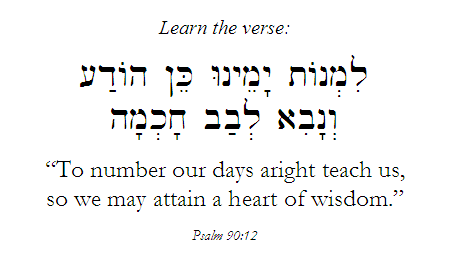 |
 |
Damnable Indifference...

10.19.23 (Cheshvan 4, 5784) What do you think, is it worse to ignore or to defy God? The Torah portion this week (Noach) states that the generation of the Flood regularly ignored God, while the builders of the Tower of Bavel defiantly sought to overthrow His authority. On the surface it might seem that the latter were more sinful than the former, but it was the generation of the Flood that was utterly destroyed, while the generation of the Tower were merely thwarted in their plans...
The sages address this in one place as follows: "...Who is worse, the one who says to the king, 'Either you are in the palace, or I am,' or the one who says, 'I am in the palace, and you are not'? Certainly, the one who says, 'I am in the palace, and you are not'! This is what the generation of the Flood said, 'Who is the Almighty that we should serve Him? And what will we gain if we implore Him?' (Job 21:15). The generation of the Tower said, 'It is not fair that He should choose the upper worlds for Himself and give us the lower worlds. So, come let us make ourselves a Tower and place an idol at the top with a sword in its hand appearing to go to war against Him'" (Bereshit Rabbah 38:6). Though they were certainly wicked in their defiance, they still believed in God and wanted to argue their case with Him.
The generation of the Flood was said to be "filled with violence" (Gen. 6:13) caused by ignorance -- literally the "state of ignoring" moral and spiritual truth. Because they willingly disregarded God from their midst, they (humanistically) arrogated to themselves divine prerogatives: "every man did what was right in his own eyes" (אִישׁ כָּל־הַיָּשָׁר בְּעֵינָיו). The resulting moral corruption and anarchy led to divine and catastrophic judgment: when God destroyed them with water, they return the world to its original state of tohu va'vohu ve'choshekh (תֹהוּ וָבֹהוּ וְחֹשֶׁךְ): "confusion and emptiness and darkness" (Gen. 1:2).
The generation of the Tower, on the other hand, overtly rebelled against God. Instead of obeying God's command to fill "all the earth" after the Flood (Gen. 9:1; 10:32), the descendants of Noach said, "Come, let us build us a city and a Tower (מִגְדָּל) with its top in the heavens, and let us make a name for ourselves, lest we be dispersed (נָפוּץ, "overflowed") across the face of the whole earth" (Gen. 11:4). The rise of the Tower (ziggurat) became symbolic of their quest to "make a name" for themselves -- a "collective name" decreed by the hand of arbitrary human tyranny (i.e., Nimrod). The individual was regarded as subservient to the collective good of the State. Only the State could guarantee human safety and perpetuity in light of the possible hostility that might descend from heaven itself... Therefore the Tower was set up to circumvent the threat of further judgment from heaven. God's judgment on the generation of the Tower was confusion, the destruction of their hubris (i.e, the Tower), and the forcible fulfillment of His commandment to replenish the earth by means of a global dispersion.
So while it is certainly wicked to either ignore or defy God, it is apparently worse to disregard His presence and live as if He were not really there at all. And this, in part, explains the rampant wickedness of our age, an epoch very similar to the "Days of Noah." The great preponderance of people in the world have become so dull of hearing, so numb, so insensate, so indoctrinated, so propagandized, etc., that they are simply indifferent to the truth status of religion. We are not faced so much with rebels who wish to argue about the truth of faith than we are faced with a "zombie" culture that is incapable of comprehending the issues (for more about this, see "The Days of Noah").
In this connection, the sages note that divine censure would come if the people "forgot" about God or otherwise became careless in their observance of His laws. They point out that the refrain "if you walk contrary to me" (והלכתם עמי בקרי) - which occurs several times during the great rebuke of Torah (see Deut. 28:15-68) - really means "if you walk carelessly (i.e., keri: קרי) with me." Rashi notes that the verb קָרָה means "to befall" or "to happen" and therefore suggests a sense of randomness (the related word mikreh [מִקְרֶה] means "coincidence"). If people regarded the events of life as "random," then God would reciprocate by bringing senseless trouble into their lives... For this reason the sages regard a careless attitude about God's will as the very first step to inevitable apostasy. In other words, regarding whatever happens in life as mere "coincidence" essentially denies God's Presence (hashgachah pratit), and this attitude will eventually call for God's corrective intervention. People may be "hot or cold" regarding their relationship with Him, but God will never give the option of affecting indifference toward Him (Rev. 3:15-16). Indeed, God often brings hardship into our lives to regain our attention and cause us to return to Him. As C.S. Lewis once said, "God whispers to us in our pleasures, speaks to us in our conscience, but shouts in our pains: It is His megaphone to rouse a deaf world."
Prophetically, the "days of Noah" are a picture of the idolatrous conditions of the world that prevail just before the calling up of the followers of Yeshua before the time of Great Tribulation upon the earth: "As were the days of Noah, so will be the coming of the Son of Man" (Matt. 24:37). There is hope, chaverim. Despite the depravity of the generation of the Flood, we understand Noach to be a picture of Yeshua our Messiah and Savior (for more about this, see "Noah and Jesus").
Hebrew Lesson:
Matthew 24:37 Hebrew reading (click):
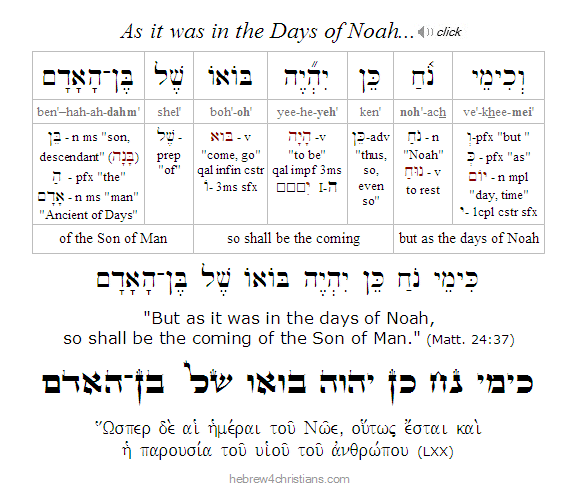 |
The Fight of your Life...
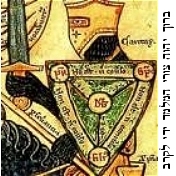
10.18.23 (Cheshvan 3, 5784) Because we are in the midst of a raging spiritual war, it is imperative to gird your mind and heart with truth... Keep yourself armed for the battle and be aware of the common strategies of the enemy of your soul (2 Cor. 2:11). Trust in God's power to deliver you from evil (1 Cor. 10:13). Be resolute in your convictions, refusing to yield to worldly pressures to compromise your faith in the name of supposed "tolerance." It is not loving to suppress the truth of Yeshua or to minimize the truth claims of our Messiah's vision of reality. Fight the good fight of faith, and take hold of those spiritual weapons that are "mighty through God to the pulling down of strongholds" (2 Cor. 10:4). Always be ready to yield every thought to the obedience of your LORD (2 Cor. 10:4). Know that this is the fight for your life, friend. The Prince of Peace (שַׂר־שָׁלוֹם) came to make peace between God and sinners through his sacrificial blood, but he did so by means of a terrible conflict with the powers of darkness, and his message still offends those enslaved by pride and fear...
The devil provides weapons for those in his service, namely voilence, the lies of darkness, the impudence of pride, and the vain seductions of this world, and therefore it behooves us to avail ourselves of the weapons of faith received by the agency of the Spirit of God (see Eph. 6:11-18). Be sober and vigilant because your adversary (ἀντίδικος) the devil prowls about like a roaring lion, seeking someone to devour. Resist him, firm in your faith, knowing that the same experiences of suffering are being accomplished by your brethren who are in the world" (1 Pet. 5:7-8). Yield yourself to God, resist the devil and he will flee from you (James 4:7). The end of all things draws near: be awake; call upon the Name of the LORD....
Hebrew Lesson
Proverbs 28:1 reading (click for audio):
Mystery of Creation...
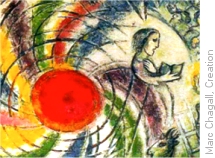
10.18.23 (Cheshvan 3, 5784) Why is there something rather than nothing? Why does anything exist at all? These are basic questions about the meaning of life. Where do we come from? What are we? Where are we going? "God created the universe," you say, yes, but exactly why did He do so? What purpose did he have in mind? In particular, why were you created? What is the purpose of your life? What do you hope to achieve with the limited amount of time you have on this earth? Such questions brood within the soul, even if they are hidden from consciousness by various forms of busyness and distraction. At the outset of serious thinking about anything at all we are confronted with such ultimate questions. What is real? Why are we here? Where are we going? What does God want from us?
The Torah begins: "In the beginning God created..." (Gen. 1:1). No explanation is given, simply the mysterious declaration that God's eternal power is behind the realm of the world of appearances. We only begin to get some idea of God's hidden purposes as he reveals his design in Scripture. There we learn that God chose to create the universe yesh me'ayin, "out of nothing," in order to share his wisdom, glory, and love with other beings He created. "You created all things, and for Thy pleasure they are and were created" (Rev. 4:11). All this was for the sake of the Messiah, who built the world in chesed (חֶסֶד) and who forever reigns as the King of eternal life and love. "For from him and through him and to him are all things." The purpose of your life is to learn that you are beloved by God, to know and receive the infinite worth you have in his eyes, and to share that love with others. You were created to be made part of God's great family, the Kingdom of Love.
The purpose of God's creative activity was the building of a kingdom based on divine love (מַלְכוּת הָאֱלהִים). As King David wrote, עוֹלָם חֶסֶד יִבָּנֶה / olam chesed yibaneh: "The world is built with chesed" (Psalm 89:2). The world itself is to built on the foundation of God's love (חֶסֶד, chesed) as it is expressed in the life Yeshua the Messiah (1 Cor. 3:11). Indeed, the very first mitzvah (commandment) given to mankind was simply פְּרוּ וּרְבוּ / p'ru ur'vu: "be fruitful and multiply" (Gen. 1:28). Ideally speaking, the family, then, is a picture of a nurturing community based on chesed. For the Christian, this "family building" is centered on Yeshua the Messiah, the true King of the kingdom and the rosh pinnah (ראשׁ פִּנָּה), or "corner stone" of the Temple of God (see Heb. 3:1-6).
Hebrew Lesson
1 Chron 29:11 reading (click):
Instead of regarding the Bible as a "Book of Answers" for our questions, it is worthwhile to think of it as a "Book of Questions" for our answers. As we listen, God questions us so that we can know him by means of the dialog within our hearts. As any good teacher knows, when a student earnestly wrestles with a question he learns more than if he were given a straightforward answer. Similarly, the Lord gives us permission to be without answers so that we will be free to seek, to struggle, and to "own" what we come to understand through our relationship with him... That way our learning will be real, substantive, and born from the urgency our own inner need. Indeed, God's very first question to man is always, ayekah: "Where are you?" (Gen. 3:9), which appeals for us to acknowledge how we hide from the truth. "Where are you?" is the poignant call of the Seeking Father for his lost child, and the question only becomes "our own" when we are willing to look at how we've come to be at this place in our lives. God's question to our heart is meant to lead us out of hiding to respond to his loving call...
Everything is inherently mysterious, since everything ultimately expresses the inscrutable will and decrees of God.... Ask yourself with earnestness of heart: Where do I come from? Who am I? Where am I going? For what reason was I created? The first step is to wonder, to ask the searching questions, and to seek God's wisdom... The LORD is faithful and will reveal truth to the heart that seeks.. It is too easy to be preoccupied with everyday concerns and to miss the marvel and sheer wonder of existence itself. If you will approach these questions with humility and reverence, you will be filled with wonder, your heart will be filled with greater fervor, and you will hunger more than ever for God's Presence.
 |
The Power to Change...
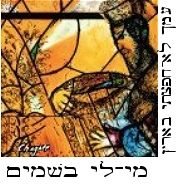
10.18.23 (Cheshvan 3, 5784) When King David cried out, lev tahor bera-li, Elohim: "Create in me a clean heart, O God" (Psalm 51:10), he did not use the Hebrew word yatzar (יָצַר), which means to "fashion" or "form" something from preexisting material, but he instead used the word bara (בָּרָא), a verb exclusively used to refer to God's creation of the cosmos (Gen. 1:1). David understood that no amount of reformation of his character would be enough, and instead appealed to that very power of God that created the worlds yesh me'ayin (יֵשׁ מֵאַיִן), "out of nothing." Such was the nature of the remedy required...
Yeshua taught, "Blessed are the pure in heart, for they shall see God" (Matt. 5:8). The Greek word translated "pure" is katharos (καθαρός), sometimes used describe the cleansing of a wound (catharsis), or to describe the unalloyed quality of a substance revealed through refining fire. Metaphorically, then, purity of heart refers to separation from the profane - singleness of vision, wholeheartedness, passion, and focused desire for the sacred. As we center our affections on Yeshua, we become pure in heart -- i.e., unified, made whole, and healed of our inner fragmentation. We see the Lord both in this world, through his effects, and then panim el panim (פָּנִים אֶל־פָּנִים), "face to face," in the world to come. Our hope purifies us for that coming great day of full disclosure (1 John 3:2-3; Heb. 12:14).
If we are impure of heart, we will be inwardly divided, unfocused, fragmented, filled with destabilizing anxiety, envy, unresolved hurt, anger, and so on. More tragically, because we seek to escape ourselves, we will be devoid of a true center, without a focal point or abiding purpose, and therefore we will be lost to ourselves, wandering and without rest...
Hebrew Lesson
Psalm 51:10 Hebrew reading:
Revival of Heart...

[ "The whole world groans and travails in pain..." (Rom. 8:22 ). ]
10.17.23 (Cheshvan 2, 5784) God understands the ache of your heart: "O Lord, all my desire is before you; my groaning is not hidden from you" (Psalm 38:9). This is a hidden blessing, a severe mercy, a cry for God's Presence. Be encouraged: If you ask for bread, your Heavenly Father will not give you a stone. Until the Master of the Universe helps, the Master of the Universe will help... Amen. God will help us, and he will help us before we even know that he is helping us! Therefore do not be anxious, and do not fear, for "your heavenly Father knows what you need before you ask Him." God will make everything new, in the name and for the sake of his great love... Meanwhile relax, because nothing is in your control anyway...
It is written, "The world is built in chesed," olam chesed yibaneh (עוֹלָם חֶסֶד יִבָּנֶה), which means that our inner life is being built by God's love... Indeed, "we are His workmanship, created in the Messiah Yeshua for good works" (Eph. 2:10). "So do not lose heart. Though our outer self is wasting away, our inner self is being renewed day by day. For this light momentary affliction is preparing for us an eternal weight of glory (αἰώνιον βάρος δόξης) beyond all comparison, as we look not to the things that are seen but to the things that are unseen. For the things that are seen are transient, but the things that are unseen are eternal" (2 Cor. 4:16-19). We must trust in God's unseen hand for our good.
The word was given for our upbuilding and edification: "Let him who walks in darkness and has no light trust in the Name of the LORD (יִבְטַח בְּשֵׁם יְהוָה) and rely on his God" (Isa. 50:10). Trusting in God (i.e., bittachon - בִּטָּחוֹן) does not mean that we are obligated to affirm that this is "the best of all possible worlds," though it does mean we believe that eventually God will wipe away every tear and make all things right.. O Lord, make everything new, revive the hurting, in the name and for the sake of thy love, Amen...
Hebrew Lesson
Psalm 38:9 Hebrew reading (click):
Torah of Sorrows...
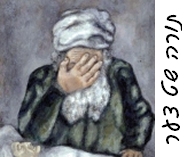
10.17.23 (Cheshvan 2, 5784) The Scriptures are filled with desperate cries of the heart... "How long, O LORD? Will you forget me forever? How long will you hide your face from me? How long must I take counsel in my soul and have sorrow in my heart all the day?" (Psalm 13:1-2). "Make haste to help me, O LORD, my salvation!" (Psalm 38:22). "My soul melts away from grief; strengthen me according to your word" (Psalm 119:28). "Answer me quickly, O LORD! My spirit fails! Hide not your face from me, lest I be like those who go down to the pit" (Psalm 143:7). God know that "hope deferred makes the heart sick" (Prov. 13:12), so there can be no turning to God, no teshuvah, apart from the presence of real hope (תִּקְוָה). Indeed, as the Apostle Paul wrote: "We are saved by hope" (Rom. 8:24).
The late Henri Nouwen wrote, "I am beginning to see that much of praying is grieving." Contrition, grief, and regret for our sins is at the heart of genuine teshuvah. Crying is a expression of utter humility, helplessness, and need. In this life we weep over many things, but we inwardly cry for our Abba, our heavenly Father's love... "Whenever you find tears in your eyes, especially unexpected tears, it is well to pay the closest attention. They are summoning you to where you should go next" (Frederick Buechner).
"Whenever you find tears in your eyes, especially unexpected tears, it is well to pay the closest attention. God is speaking to you through them of the mystery of where you have come from and is summoning you to where you should go to next. (Frederick Buechner, Whistling in the Dark: 1988).
An old Jewish prayer, uttered somewhat wistfully, begins, "O Lord, I know that Thou wilt help us; but wilt Thou help us before Thou wilt help us?" It's not always easy to wait for God, especially when we are in pain, sorrow, or anxiety, but we must never, ever, give up; we must never ever, abandon our heart's longing for ultimate healing. Faith exercises hope in the Reality, Substance, and Being (ὑπόστασις) of the Invisible and is made captive to undying hope (Heb. 11:1). Therefore the Spirit cries out: "Hope to the LORD; be strong and strengthen your heart; and (again) hope to the LORD" (Psalm 27:14). "Blessed are you, O LORD, who walks with the wounded of heart".
Hebrew Lesson:
Psalm 119:28 Hebrew Reading (click):
Shelter of Light...
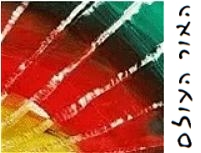
10.17.23 (Cheshvan 2, 5784) The sages say, "in the world to come (הַעוֹלָם הַבָּא), God will bring the sun out of its sheath to burn the wicked; they will be judged by it, but the righteous will be healed by it' (Shemot Rabbah). Amen. Yeshua is compared to the "Sun" because as the Sun is the central luminous body of our world, so Yeshua is called the "Light of Life" (אוֹר הַחַיִּים). Yeshua is melech ha'kavod (מֶלֶךְ הַכָּבוֹד), "the King of Glory" -- and no one can stand before the blinding power of His countenance (Psalm 27:4; Rev. 1:8-19). His is the "Fountain of Light" for all of creation, the Source and End of all life: "For by Him all things were created, in heaven and on earth, visible and invisible, whether thrones or dominions or rulers or authorities -- all things were created through Him and for Him. And he is before all things, and in him all things hold together... that in everything He might be preeminent" (Col. 1:16-18). Yeshua is the "Sun of Righteousness" (שֶׁמֶשׁ צְדָקָה) who comes "with healing in his wings" -- that is, in healing radiance, with rays and beams, which metaphorically describe His influence over the hearts of men... Note that the word for "wings" used in this passage (i.e., kanaf: כָּנָף) pictures the image of a heavenly tallit (טַלִּית), or the heavenly firmament (רָקִיעַ) of the LORD's sheltering Presence.
Amen, there is a future time of healing and deliverance coming to us, though we must abide in the shadow of its substance for a bit longer: "For behold, the Day is coming (הַיּוֹם בָּא), burning like an oven, when all the arrogant and all evildoers will be stubble. The Day that is coming shall set them ablaze, says the LORD of hosts, so that it will leave them neither root nor branch. But for you who fear my Name, the Sun of Righteousness (שֶׁמֶשׁ צְדָקָה) shall rise with healing in its wings. You shall go out skipping like calves released from the stall. And you shall tread down the wicked, for they will be ashes under the soles of your feet, on the day when I act, says the LORD of hosts" (Mal. 4:1-3).
Hebrew Lesson:
Proverbs 18:20 Hebrew reading (click):
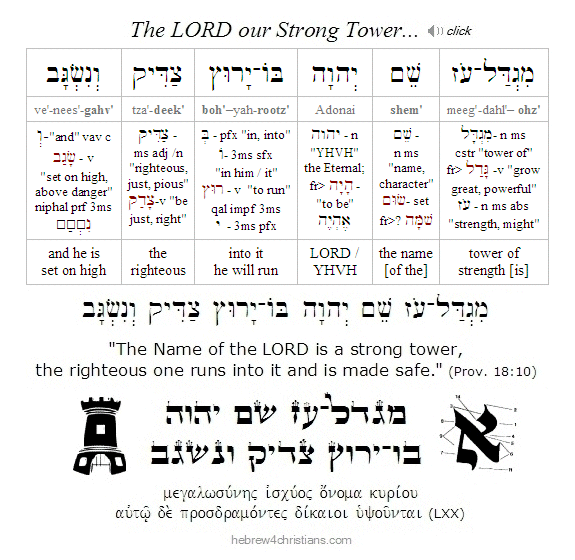 |
Stages of Judgment...
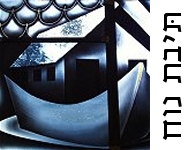
[ The following entry concerns this week's Torah reading, parashat Noach... ]
10.16.23 (Cheshvan 1, 5784) Some of the sages have noted that God's judgment comes in stages. The Great Flood was preceded by four successive generations of prophets that warned of the coming cataclysmic judgment: Enoch, Methuselah, Lamech, and finally Noah. It is fascinating to understand that Adam himself was alive when Noah's grandfather Methuselah was born, so the original message of teshuvah (repentance) was an echo that came from Eden itself; moreover, consider that Abraham personally knew of Noah (Abraham was 58 years old when Noah died), and undoubtedly Noah's son Shem told him of his grandfather Lamech, who had seen and spoken with Adam himself - the man who was directly created by God alone. Later, Abraham's son Isaac also came to know Shem, Noah's firstborn son, and the legacy of the "gospel of the garden" was thereby passed on...
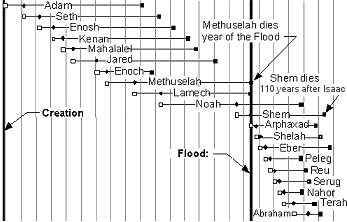 |
The first stage of judgment occurred when people disregarded the inherent dignity of others created in the image and likeness of God. This negation of the divine characteristics of people (i.e., the image of God) led to sexual promiscuity that became rampant upon the earth: "The sons of God saw the daughters of man that they were fair, and they took for themselves wives, whomsoever they chose" (one midrash claims that the Dor HaMabul, the generation of the flood, would regularly exchange marital partners). God then gave mankind 120 years to repent from his sexual corruption or be faced with apocalyptic destruction (Gen. 6:3). Despite Noah's 120 year public building project and the preaching of his grandfather Methuselah, God's patience finally ran out (1 Pet. 3:20). God then "saw that the wickedness of man was great in the earth and that every imagination of the thoughts of his heart was only evil continually" (Gen. 6:5). Mankind refused to repent and turn to God....
There is a tragic progression at work here. The practice of "casual" acts of lawlessness eventually led to the acceptance and practice of sexual promiscuity. This, in turn, resulted in the loss of mankind's sanctity (kedushah), since this comes from man's ability to subordinate his instinctual/emotional desires to his intellectual/spiritual life. Genuine sanctity refuses to exploit others as means to an end. Disregarding this truth cheapens and impairs the sense of self, causing disintegration of the spiritual life. As humanity became more and more fractured and stupefied, God's "like for like" judgment resulted in "giving them over" (paradidomi) to the lusts of their hearts (Rom. 1:26). (In our culture of unbridled pornographic expression and sexual immorality, we mirror such an antediluvian world view. Indeed, it is a mark of our age to be enamored with "degrading passions," with gender confusion and regularly practiced idolatry (i.e., fornication, adultery, homosexual relationships, and so on)). The final verdict of this practiced chamas (lawlessness) was the bestowal of a "depraved mind" (αδοκιμον νουν), a condition of being unable to reason properly at all. Since truth is essentially grounded in a sense of value, and value is a function of conscience, a depraved mind is literally insane from a spiritual perspective... People who are devoid of conscience are unable to reason along the lines of ethical truth at all. This promoted a cultural collusion to suppress the truth, to silence the truth-tellers, to kill the prophets, and to gag advocates for justice. Lawlessness squelches the inward voice of right and wrong within the human heart.
Hebrew Lesson:
Psalm 14:3 Hebrew reading (click):
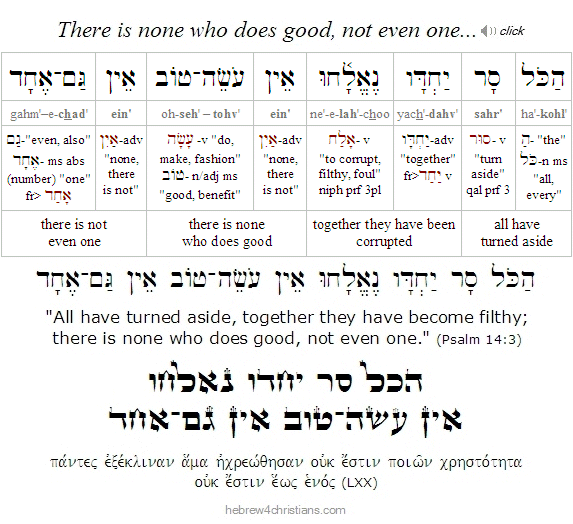 |
Timeline Note: Noach lived for 350 years after the flood, and died when he was 950 years old (Gen. 9:28-29). Based on Gen. 11, Noach was 602 when Shem begat Arphaxad (Gen. 11:10), and Terach begat Abram 290 years later (Gen. 11:12-26), so Noah would have been 892 years old at the time Abraham was born. Since Noach lived to be 950, he would have lived for 58 years after Abraham was born. On the other hand, if Terach was 130 (not 70) years old (from Gen. 11:32 compared with Gen. 12:4), then Noah would have died two years before Abraham was born (Terach and Abraham's older brothers, however, would have been contemporaries of Noah). The problem is that Gen. 11:25 is equivocal, so we cannot know for certain because of the apparent discrepancy in the genealogies.
Alongside the Fleeting...

[ "And now brothers, I will ask you a terrible question, and God knows I ask it also of myself. Is the truth beyond all truths, beyond the stars, just this: that to live without him is the real death, that to die with him the only life?" - Buechner ]
10.16.23 (Cheshvan 1, 5784) God's people are always "strangers" in this world; they are literally "e-stranged" -- living here, yet not here. We are outsiders and pilgrims, not at home in this world, and our faith therefore is both a type of "protest" against any interpretation of reality that excludes, suppresses, denies, or minimizes the Divine Presence as well as a longing for the place where we truly belong.... If you feel crazy in an insane situation, then you are really quite sane... The world will feel oppressive and strange once you have been awakened from its madness and refuse to be moved by the delusions of the crowd... Life in olam hazeh (this world) is a place of passing that leads to the world to come. Our faith affirms that underlying the surface appearance of life is a deeper reality that is ultimately real and abiding. It "sees what is invisible" (2 Cor. 4:18) and understands (i.e., accepts) that the "present form of this world is passing away" (1 Cor. 7:31).
The Apostle Paul taught that we to be "conformed" (σύμμορφος) to the Messiah (Rom. 8:29), but not "conformed" (συσχηματίζω) to the pattern of this fallen world (Rom. 12:2). The former word means to resemble or be made similar in form (μορφή), whereas the latter means to accept the world's scheme (σχῆμα) of understanding things, to passively go along with the world's lies, wishful thinking, fearmongering, propaganda, etc. Of course we need God's help to escape the "programming" of our age, and therefore the Holy Spirit helps us to become transfigured – "changed from the inside out" - by the renewal of our minds, enabling us to see things in light of the reality of our identity in the Messiah. So refuse to let the world system get you down, but focus on God and His great glory. Take heart, friends: being exiled by the world is an indication that you belong to the Kingdom of God...
Hebrew Lesson
1 Chron. 29:15 Hebrew reading:
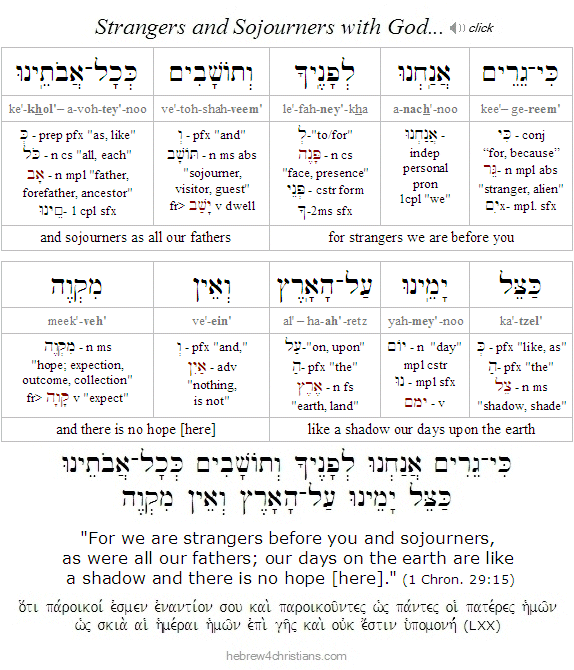 |
Seedbed of Creation...

10.16.23 (Cheshvan 1, 5784) The Scroll of Genesis (סֵפֶר בְּרֵאשִׁית) is truly the "beginning," the "root," and the "seedbed" of all the subsequent Scriptures - including the message of the gospel and the revelation of the New Testament. In Genesis we see the creation and ruin of man through sin, but we take hold of the promise of deliverance through the coming Seed of the woman; in the Book of Exodus (שְׁמוֹת) we see God's powerful redemption secured through the blood of the Lamb; in the Book of Leviticus (וַיִּקְרָא) we encounter communion and atonement in the holy sanctuary; in the Book of Numbers (בַּמִדְבַּר) we experience the leading of God through desert places, and in the Book of Deuteronomy (הַדְּבָרִים) we are renewed by God's faithfulness before we take hold of our inheritance. Ultimately, the concluding book of the Bible, the Book of Revelation, serves as a climactic "final chapter" of the story of Torah begun in Genesis, where the Tree of Life (עֵץ הַחַיִּים) is restored to the midst of the paradise of God, and the presence of sin and death have been forever eradicated....
Everything begins with the foundational truth that Almighty God is our personal Creator (הַבּוֹרֵא). This is the first principle and axiom of all rational thinking: "In the beginning (בְּרֵאשִׁית), God created the heavens and the earth" (Gen. 1:1). Notice that the word "beginning," i.e., bereshit, comes from the word reishit (רֵאשִׁית), meaning first or best (Psalm 111:10), which does not necessarily mean "the beginning" in a temporal sense (הַרִאשׁוֹן), but rather primacy or rulership over all that exists. Indeed, the word includes the root idea of "head" (ראשׁ), which suggests the "head of all things," that is, to the Messiah, the Creative Word of God who is the "head of all beginning and authority" and through Whom and for Whom all things were created (Col. 1:16; 2:10).
Many of the traditional sages state that "in the beginning" (בְּרֵאשִׁית) refers to the wisdom of the Torah. Quoting Proverbs 8:22, these sages actually say that God created the world for the sake of Torah, what they call "reshit darko" (רֵאשִׁית דַּרְכּוֹ). In other words, wisdom (i.e., chokhmah: חָכְמָה) is personified as the Torah, the Agency of Power that created the universe. In light of the New Testament, we understand the divine wisdom personified as Yeshua our Messiah - the expression of God's will in creation... the manifestation of the "strong arm" of the LORD and his mighty power that created the enormous complexity of the universe yesh ma'ayin, "out of nothing..." Indeed, Yeshua is the "Living Torah" (ha'Torah ha'chayim: התורה החיה) and the Lamb slain before the foundation of the world - the One revealed before creation as its source and end. As it says in the New Testament: בְּרֵאשִׁית הָיָה הַדָּבָר - "in the beginning was the Word," וֵאלהִים הָיָה הַדָּבָר - and God was the Word... הַכּל נִהְיָה עַל־יָדוֹ - All things were made by Him, and without Him was not anything made that was made (John 1:1,3). Followers of the Messiah Yeshua do not worship a book, though the LORD our God is indeed the faithful Lawgiver, the Source of all truth and therefore he can never contradict the perfections of his own inner nature. Only the LORD God Almighty receives the glory of creation forever and ever (Rev. 4:11).
God "emptied himself" by freely choosing to create the universe in order to share his wisdom, glory, and love with other beings he created... All this was for the sake of the Messiah, who built the world in chesed (חֶסֶד) and who forever reigns as the King of eternal life and love.
Hebrew Lesson
Prov. 8:22 Hebrew reading (click):
Parashat Noach (פרשת נח)

10.15.23 (Tishri 30, 5784) Last week's Torah portion (Bereshit) showed how the mutiny of Adam and Eve caused humanity to plunge into idolatrous chaos. The subsequent generations lost sight of the LORD and became progressively steeped in moral anarchy and bloodlust, so that "every intention of the thoughts of man's heart was only evil continually" (Gen. 6:5). After just nine generations, the LORD had grown so weary of humanity that he "regretted" (i.e., yinchem: יִּנָּחֶם) creating man and "his heart was grieved" (Gen. 6:6). However, God recognized Noach (from the godly line of Seth) as a tzaddik (צַדִּיק), a righteous man of faith, and graciously made provision to save him from the wrath to come....
Noah's father Lamech (לֶמֶךְ, "powerful one") regarded his son as a deliverer who would comfort humanity from the ravages of the original curse. Noach would give rest (נוּחַ) from the toil and vexation of life (Gen. 5:29). Symbolically Noah was a "type" of the Savior to come who would rebirth the world by giving lasting comfort and rest (for more on this, see the article "Noah and Jesus"). In like manner it was prophesied that Yeshua would give us everlasting rest: "His rest shall be glorious" (Isa. 11:10), just as He offers rest to the weary (Matt. 11:28, Heb. 4:9). His sacrifice on the Cross at Moriah undoes the kelalah (curse of work) over the children of Adam. Indeed, His life, sacrifice, and resurrection was like a "magic spell" that "spoke backwards" the sin of the "First Adam" - and by means of His deliverance the power of the curse is forever broken (see Gal. 3:13, John 3:14, 2 Tim.1:10; Heb. 2:14; Heb. 9:27-28; 1 John 3:8, Rev. 22:3). Yeshua is Adam ha-Sheni (האדם השני) - the "Second Adam" - the promised Son of Man. By means of His Spirit we are given an everlasting comfort (John 14:16).
Eschatologically, the "days of Noah" (יְמֵי נֹחַ) present a picture of the idolatrous conditions of the world that will prevail just before the calling up of the followers of Yeshua before the time of Great Tribulation upon the earth: "As were the days of Noah, so will be the coming of the Son of Man" (Matt. 24:37). The generation of the Flood was said to be "filled with violence" (i.e. chamas: חָמָס) caused by ignorance -- literally the "state of ignoring" moral and spiritual truth (see Gen. 6:13). Because people willingly disregarded God from their midst, they arrogated to themselves divine prerogatives: אִישׁ הַיָּשָׁר בְּעֵינָיו יַעֲשֶׂה - "every man did what was right in his own eyes." The resulting moral corruption and spiritual anarchy led to divine and catastrophic judgment: the world returned to its primordial state of tohu va'vohu v'choshekh: "confusion and emptiness and darkness" (Gen. 1:2). Notice, however, that despite the godlessness and lawlessness that prevailed, the "days of Noah" were not marked by great "tribulation," since people were eating and drinking, marrying and giving in marriage, until the day that Noah entered into the ark, "and they were unaware" (καὶ οὐκ ἔγνωσαν) until the flood came and swept them all away -- so will be the coming of the Son of Man (see Matt. 24:38-39). In other words, the "end of the world" judgment fell suddenly and took them by surprise...
The seven day warning given to Noah further suggests the seven year tribulation period to come (i.e., Daniel's 70th week), and also the supernatural gathering of the people of God who will be carried above the prophesied worldwide cataclysm. Just as God protected Israel during the time of judgment upon Egypt, so He will protect His people from the wrath of the "great Day of the LORD" (וֹם־יְהוָה הַגָּדוֹל). But please note that "the LORD shut him in" (Gen. 7:16). Noah's teivah (ark) had God Himself as its designer (Gen. 6:15), just as salvation in Messiah is exclusively by God's design (Jonah 2:9; Eph. 1:9, 1:11). It contained only one door (Gen. 6:16), just as Yeshua is the only door to salvation (John 10:9; 14:6). Noah's ark contained three levels (Gen. 6:16) and salvation has three own experiential levels (2 Cor. 1:10): past, present, and future. In the past (at Moriah) Yeshua delivered us from the penalty of sin; in the present, He is delivering us from the power of sin; and in the future He will deliver us from the very presence of sin. Baruch Hashem - may that day come soon!
Hebrew Lesson:
Genesis 6:9b Hebrew reading (click):
Note: Secular scholars often scoff at the story of Noah and the great flood (המבול הגדול), suggesting it is a myth, but several ancient documents reveal striking parallels to the account given in the Torah (the most famous of these is the Babylonian "Gilgamesh Epic"). Moreover, sea archaeologists have discovered numerous ancient "submerged cities" throughout the world that lend credibility to the description found in this parashah.
Moreover, the Torah describes the "floodgates of the deep" that broke and overwhelmed the surface of the earth -- the "fountains of the depths" (מַעְיְנֹת תְּהוֹם רַבָּה) from underground oceans (Gen. 7:11) that today have been confirmed to exist.
The Reason for Creation...
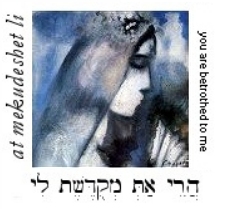
[ The following is related our Torah portion for this Shabbat, parashat Bereshit... ]
10.14.23 (Tishri 29, 5784) Why did God create the universe? What is its ultimate purpose and end? In the Scriptures we read: "The heavens declare the glory of God, and the firmament shows forth his handiwork" (Psalm 19:1). The vast expanse of the unending cosmos mirrors the greatness of the Creator; its innumerable wonders constantly proclaim the infinite glories of God. Indeed all of creation is filled with God's glory (Isa. 6:3). So the manifestation of the glory of God is "the meaning of life, the universe, and everything in it."
But there is something deeper still, namely, the glory of God as the Redeemer and Savior of lost humanity. "Fear not: for I have redeemed you; I have called you by your name; you are mine" (Isa. 43:1). "Bring my sons from afar and my daughters from the end of the earth, everyone who is called by my name, whom I created for my glory, whom I formed and made" (Isa. 43:6-7). We were created for God's glory, yet we became lost and in the darkness of exile. The highest manifestation of the glory of God is therefore revealed in Yeshua our Savior, the gracious healer and lover of our souls.
The Bible begins: "In the beginning God created the heavens and the earth" (Gen. 1:1). It then recounts how God created man by breathing a part of his own spirit into him: "Then the LORD God formed the man from the dust of the ground (adamah: אֲדָמָה) and breathed into his nostrils the breath of life (nishmat chayim: נִשְׁמַת חַיִּים), and the man became a living soul" (Gen. 2:7). The miracle of creation means that God imparted his own neshimah (נְשִׁימָה), his own "breath," to give life to the man, who was named "Adam."
When Adam first opened his eyes and human consciousness was born, he immediately understood that the LORD created all things, including himself. According to midrash, Adam's first words were, יהוה מֶלֶךְ עוֹלָם וָעֶד / Adonai malakh olam va'ed: "The LORD is King for ever and ever." God then said, "Now the whole world will know that I am King," and He was very pleased. This was the "tov me'od" (טוֹב מְאד) moment of creation, when God saw all that He had made "and found it very good" (Gen. 1:31). The whole universe was lit up with God's glory, from the furthest star to the dust used to form Adam's heart.
However it was not long afterward that God tested Adam, perhaps to prove his love for his Creator (John 12:15; Deut. 13:3). God wanted Adam and Eve to make up their minds by choosing whether they would honor his will or not. He commanded Adam not to eat from the forbidden tree, without any rational explanation, though he warned that disobedience to his commandment would result in death: "Of every tree of the garden you may freely eat; but of the tree of the knowledge of good and evil you shall not eat, for in the day that you eat of it you shall surely die" (Gen. 2:16-17).
Paradoxically, the LORD constrained Adam and Eve to make the decision one way or another. They were forced to be free! The forbidden tree was therefore encountered, and the nachash (devil) appeared questioning God's will for them: "Did God really say...?" (Gen. 3:1). Like the patriarch Job, the showdown between good and evil would be played out within the heart of man. And all of this was by divine design and counsel, of course. God created this tree to test the man's faith; He foresaw the transgression; and He graciously planned for its remedy in Yeshua, the "Lamb slain from the foundation of the world."
We know what happened, of course. Eve took fruit from the tree and gave some to Adam, and together they chose to disobey God. Because the transgression arose from the desire to act autonomously, the remedy was to be realized by its reversal - that is, by yielding in personal trust of God's sacrificial love. That was the primary message God gave to Adam and Eve when he covered them with the skin of a sacrificed lamb in the garden and promised them future redemption from the curse of death. Though Adam was first created to mirror God and serve as the steward of creation, his image was marred by unbelief and therefore he needed the miracle of regeneration to be perfected. This "new man," despite being plagued by various troubles and confusion, was destined to overcome the fallenness of the world by faith, and it was for such people that the LORD God created the world.
And so God created the world for the sake of the manifestation of his glory both as our Creator but also as our personal Redeemer and Savior. Yeshua is the revelation of the glory of God who reveals the divine heart of mercy and compassion. Yeshua is the "direct object" of creation; He is the central character of reality, the depth of all that is ultimately real.
"In the beginning was the Word" (John 1:1,14). Yeshua is the Source of all life in the universe: "All things were made by Him (John 1:3). The "Word made flesh" is the "image of the invisible God" and the "radiance of the glory of God and the exact imprint (χαρακτήρ, 'character') of his nature" (John 1:14, Col. 1:15). All of creation is being constantly upheld by the word of His power (Heb. 1:3): "All things were created by Him (i.e., Yeshua), and for Him" and in Him all things consist (συνεστηκεν, lit. "stick together") (Col. 1:16-17).
Creation begins and ends with the redemptive love of God as manifested in the Person of Yeshua our Messiah... He is the gravitational center of creation - it's beginning and end. As it is written: אָנכִי אָלֶף וְתָו רִאשׁוֹן וְאַחֲרוֹן ראשׁ וָסוֹף / "I am the 'Aleph' and the 'Tav,' the First and the Last, the Beginning and the End" (Rev. 22:13). Indeed, Yeshua is מֶלֶךְ מַלְכֵי הַמְּלָכִים / melech malchei ha'melachim: The "King of kings of kings." He is LORD of all possible worlds -- from the highest celestial glory to the dust of death upon a cross... יְהִי שֵׁם יהוה מְברָךְ / yehi shem Adonai mevorakh: "Let the Name of the LORD be blessed" forever (Psalm 113:2).
So why you were born into this world? What is your purpose, destiny, and end? The Torah states that you were personally created by Almighty God, who breathed out the breath of life (נִשְׁמַת חַיִּים) into you, and then redeemed your life so you could know the glory of God and spiritual reality. As it is written: "Worthy are you, our Lord and God, to receive glory and honor and power, for you created all things, and by your desire they existed and were created" (Rev. 4:11). God creates all things for his glory and purposes, which indeed is the first blessing recited over the bride and groom in a traditional Jewish wedding: בָּרוּךְ אַתָּה יְהוָה אֱלהֵינוּ מֶלֶךְ הָעוֹלם שֶׁהַכּל בָּרָא לִכְבוֹדו / "Blessed are you Lord our God king of the universe, who has created all things for his glory." The purpose of life is to know and to love God, to walk in His light and truth, and to glorify his compassion and grace forever...
At a traditional Jewish wedding the groom places the ring on his bride's finger and says: Harei, at mekudeshet li (הרי את מקודשׁת לי): "Behold, you are sacred to me." Love and holiness are interconnected, since the beloved is set apart as sacred and treasured. May God help us see the wonder of His love for our lives: "Do not be conformed to the passions of your former ignorance, but as he who called you is holy, you also be holy in all your conduct, since it is written, "You shall be sacred, for I am sacred" (1 Pet. 1:14-16).
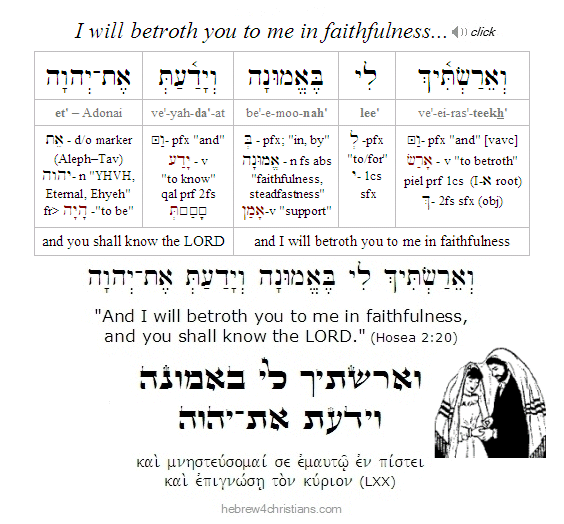 |
The Blessing of Divine Rest...
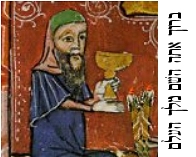
10.13.23 (Tishri 28, 5784) Our Torah reading for this week (Bereshit) includes the famous words recited every Friday night at the outset of the Kiddush ceremony: "Thus the heavens and the earth were finished, and all the host of them. And on the seventh day God completed his work which he had made; and he rested on the seventh day from all his work which he had done. And God blessed the seventh day, and called it holy, because on it God rested from all his work which He created and made" (Gen. 2:1-3).
The phrase "on the seventh day God completed his work" bothered the Torah commentator Rashi, since it says in another place that all the work of creation was completed during the first six days (Gen 1:31). Rashi then asks, "What was lacking at the end of the sixth day?" And he answers: menuchah (מְנוּחָה), a word that means "rest" (from a root [נוּחַ] that means to repose, comfort, etc.). In other words, God created rest as the consummation of the creative process. Rest is something more than the cessation of activity; it is a means of renewal and reconnecting with what is most important, namely, the goal, purpose, and reason for our lives. Instead of focusing on doing things ("work"), we focus on our being and what we mean before the eyes of heaven. And that is why we "sanctify" the Sabbath day -- to set it apart as a time we attune ourselves to God and to recover the meaning why he created us in this world.
The Sabbath is therefore not a time of passive rest but rather the climax of God's creation itself. It is a picture of heaven itself, the rest and blessing of eternal life. All creation is for the sake of Messiah, which is to say, is for the sake of our salvation and union with God given through him. When Yeshua cried out "It is finished!" he signified that the work for our salvation was complete. There is a therefore a "Sabbath rest" for the people of God, for those who have entered His rest have also ceased from their works as God did from His (Heb. 4:9-10). And that's the deeper principle of Sabbath, after all: to cease from our works and to be sustained by God's grace. Shabbat Shalom chaverim.
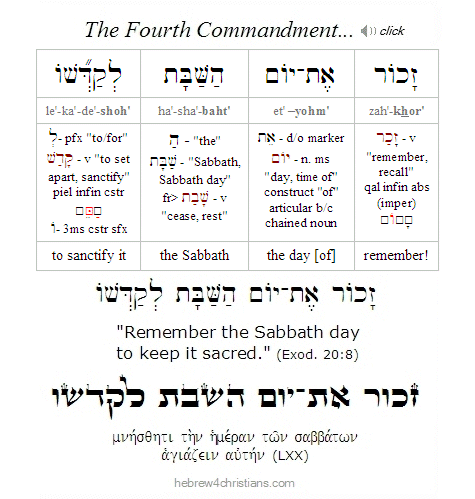 |
Beginning with Faith...

10.13.23 (Tishri 28, 5784) "In the beginning, God created the heavens and earth." We begin here, like a child listening to a story: "Once upon a time..." At the outset of revelation, then, we realize God speaks to the heart in simplicity. "Unless you turn and become as little children, you cannot enter the kingdom of heaven" (Matt. 18:3). We are not given engineering details about how God created, only that He did so "yesh me'ayin," that is, out of nothing - so that we do not rely on our own understanding but on the power and grace of the One who brought everything into being. This is the beginning of faith....
Shade on your right hand...

10.13.23 (Tishri 28, 5784) When we forget that God is in complete control of all things, we tend to grow anxious... Feeling worried comes from focusing on ourselves, a perspective that can make us feel alone, forgotten, and even victimized in this world. Worry moves us to defend ourselves, to seek refuge in our own devices, and to forfeit the will of God according to the dictates of lesser fears... The sages say it is not permitted to worry: "To worry is a sin; only one sort of worry is permissible; to worry because one worries." We should worry that we worry because this indicates our hardness of heart and our unbelief! God's name YHVH (יהוה) means "Presence," "Breath," "Life," and "Love." So why be anxious for "tomorrow"? As we live today, we really only have this moment, but this moment is entirely sufficient when we walk in the light of God and seek to know him in all our ways. Amen, so we are admonished: "Let the peace of God rule in you" (Col. 3:15).
Where it says, "The LORD is your protector; the LORD is your shade at your right hand" (Psalm 121:5), note that God's Presence is likened to the shadow (צֵל) cast by someone who walks closely beside you, holding your hand (Psalm 23:4). Your "right hand" (יְמִינֶךָ) refers to your decision to "see the unseen" by performing acts of righteousness in this world: the blessing of God is then cast upon all you do (Deut. 2:7; Psalm 1:3). Neither does God "slumber or sleep," for the LORD your Guardian (יְהוָה שׁמְרֶךָ) is fully awake, full of life, insuperable power, and divine action! Our help comes from the LORD, "oseh shamayim va'aretz" (עשֵׂה שָׁמַיִם וָאָרֶץ) - the Maker of heaven and earth.
יהוה שׁמרך
יהוה צלך על־יד ימינך
Adonai · shohm·re'·kha
Adonai · tzee·le·kha · ahl-yahd · ye·mee·ne'·kha

"The LORD is your Protector;
the LORD is your shade on your right hand."
(Psalm 121:5)

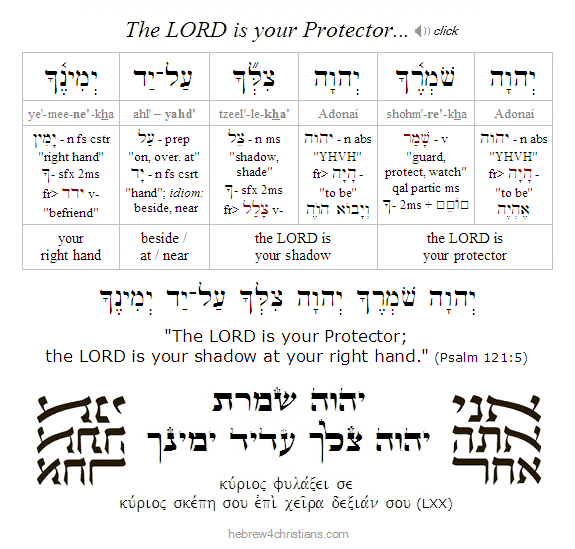
Just before God created Adam, he said: "Let us make man in our image and likeness" (בְּצַלְמֵנוּ כִּדְמוּתֵנוּ). Note that the Hebrew word for "image" (i.e., tzelem: צֶלֶם) comes from the word tzel (צֵל), meaning "shadow," thus suggesting that man was originally created to cleave to God as closely as a shadow follows its Substance. And just as a shadow resembles its originating substance, so man was to resemble the reality of the Divine Presence in this world. The New Testament reveals that essential purpose of the redeemed life is to become conformed (σύμμορφος) to the image and likeness of Yeshua (Rom. 8:29, 1 Pet. 2:21). "Just as we have borne the image of the man of dust, we shall also bear the image of the man of heaven" (1 Cor. 15:49). The work of the Spirit is "Messiah in you - the hope of glory" (Col. 1:27). The question therefore isn't, "do you accept Yeshua as your Savior" as much as it is, "Does Yeshua live inside your heart?"
Faith's Remembering...

[ We are in shock and horror over what has happened in Israel last Shabbat on Simchat Torah. Everyone is asking what to do? The answer is to remember the truth and to affirm that God is intimately in control. The answer is to pray. We must believe, yet we must not let hatred consume our hearts. We are in exile in this world. Come quickly, Lord Yeshua! ]
10.12.23 (Tishri 27, 5784) God's children are people of truth, people who trust in the LORD God of Israel (John 18:37). We share our hope with the great tzaddikim of the ages as we walk through the "valley of the shadow of death" that is this world. We believe in God's mercy and love given in the Messiah; we believe in the resurrection of Yeshua from the dead and hold fast to the promise of an unimaginably wonderful blessing reserved for us in the world to come. Meanwhile we walk by faith, further believing that no prayer we utter ever goes unanswered. We trust in our heavenly Father's care as we pour out of hearts to him for the healing of those who are still lost and in despair... We remember that time is a short and soon we will see our great King panim el-panim (פּנים אל־פּנים), "face to face."
At any given moment of the day, then, regardless of our present circumstances, we can turn to the secret reality of the Divine Presence and come "boldly before the Throne of Grace" (Heb. 4:16). As Yeshua said, "To you it has been given to know the secrets of the kingdom of heaven..." (Matt. 13:11). The Spirit of God always says, "Come, my people, enter your chambers, and shut your doors behind you" (Isa. 26:20). In the secret places of our heart - our "prayer closet" - we appeal to the Hidden Presence to be manifest in the midst of every circumstance of our lives. Our Heavenly Father sees in secret; he knows the groaning of our hearts (Matt. 6:6; 2 Cor. 5:4; Rom. 8:22-23).
Therefore may we never be ashamed; may we never grow bitter; may our sorrows lead us me'chayil el-chayil (מחיל אל־חיל), "from strength to strength"; and may the days of our sojourn yield to us greater wisdom, deeper compassion, and finally glorious reception into the accepting arms of our great God and Savior. By faith let us draw near and call upon the Name of the LORD. Amen.
Hebrew Lesson
Isaiah 40:29 reading (click):
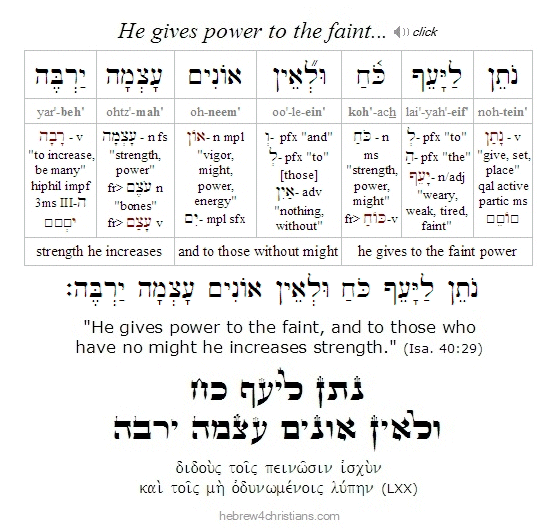 |
Creation and Faith...

[ "It is absurd for the Evolutionist to complain that it is unthinkable for an admittedly unthinkable God to make everything out of nothing and then pretend that it is more thinkable that nothing should turn itself into everything." - G. K. Chesterton ]
10.12.23 (Tishri 27, 5784) The idea that a personal God created the universe "out of nothing" (i.e., yesh me'ayin: יֵשׁ מֵאַיִן ) is a matter of special revelation that is not directly known through the operation of unaided natural reason. Of course human reason may (rightly) infer that since "every effect requires a cause," and since the universe itself is an effect, there must be a cause sufficient in power and greatness to effect the existence of the universe. Likewise, human reason may again (rightly) infer that the universe itself must have had a beginning, since it is impossible to traverse an infinite number of causes to arrive at a present effect, and therefore there must have been an immensely powerful and transcendental "First Cause" that started the chain of causation itself. (This "First Cause" answers the metaphysical question, "Why is there something [at all] rather than nothing?") However, human reason, by itself, can only take us so far, and something more is needed to apprehend the nature of reality.
In philosophical theology, an argument that God is the Cause of the universe is sometimes offered to invoke the possibility that the God of the Jewish Scriptures exists, though strictly speaking this inference is not warranted given the premises and logic of "cosmological" arguments alone. Indeed, the ancient Greek philosophers used this kind of reasoning to justify their own speculations about the cosmos (e.g., Plato's Form of the Good, Aristotle's Unmoved Mover, etc.), and yet their philosophical systems never connected the First Cause with a morally perfect personal Creator (אֱלהִים) who made mankind in His image and who therefore requires loving trust to know Him. The Greek conception of God (θεὸς) was abstract, impersonal, and essentially a theoretical construct employed to make sense of the physical cosmos. Nowhere in their speculations will you find the idea that the First Cause has revealed Himself as the author of all moral truth in the universe and who therefore functions as mankind's Eternal Judge. And nowhere in their thinking will you find the Covenant-Making God (יהוה) who redeems humanity from sin and judgment by means of the atoning sacrifice of Yeshua on the cross... Beyond the abstract awareness that the universe is the effect of an immensely powerful and transcendental First Cause, unaided human reason has precious little to say. As the French philosopher and mathematician Blaise Pascal once wrote, "The God of the philosophers is not the God of Abraham, Isaac, and Jacob."
To the Hebrew mind, reality is the handiwork of a single all-knowing, all-powerful, and morally perfect Creator who has personally revealed Himself to key individuals in the drama of human history. As such, reality is intensely, overwhelmingly, and even hauntingly personal... Truth therefore is a matter of trust -- not abstract knowledge -- whereas "knowledge" is primarily about practical ethics, moral obligation, and cult practices (i.e., Temple worship). For the Hebrew mind, truth is more akin to moral fidelity than it is to propositional correspondence; it is more a matter of the heart than of the head (see: "Theology and the Greek Mindset").
A Roman emperor once asked Rabbi Joshua if the universe had a ruler. The sage answered, indeed, the LORD is the Creator of all things, as it is written, "In the beginning, God created the heavens and the earth." The emperor then asked, "Why then is God not like the emperor of Rome, who is seen twice a year so that people may know and worship him?" Rabbi Joshua said that unlike human kings, the LORD was too powerful for people to see; as it is written in the Torah: "No person shall see Me and live." The emperor was skeptical, however, and insisted that unless he could physically see God, he would be unable to believe. Rabbi Joshua then pointed to the sun high in the sky: "Look into the sun and you will see God." The emperor tried to look into the sun, but was forced to cover his eyes to keep them from burning: "I cannot look into the sun," he said. Rabbi Joshua then replied: "Listen to yourself: If you cannot look into the sun which is but one of God's creations, how can you expect to look at God?" (adapted from Sefer HaAggadah)
The New Testament affirms that knowing that the First Cause of the universe is the personal God revealed in the Jewish Scriptures is the result of faith in God's direct revelation: "By faith (בָּאֱמוּנָה) we understand that the universe [lit. "worlds"] were created by the utterance of God (בִּדְבַר אֱלהִים), so that what is seen [i.e., the "effect" of the universe] did not come into being out of existing phenomena [i.e., was made yesh me'ayin - 'out of nothing']" (Heb. 11:3). Again, this is a matter of special revelation directly imparted by God's grace so that the soul may apprehend the Divine Light that preceded the creation of the worlds. Faith "looks not to the things that are seen but to the things that are unseen. For the things that are seen are transient, but the things that are unseen are eternal" (2 Cor. 4:18). This "collision" with the world of everydayness creates a restlessness or homesickness for our true home in heaven... (May God help each of us persevere.)
The very first phrase of the Scriptures, "In the beginning God created..." (Gen. 1:1), is therefore the starting point of all true and right thinking about the universe itself. Everything else follows from this revealed truth which natural (i.e., human) reason can merely approximate. God alone can create yesh me'ayin - "out of nothing" (the Hebrew verb bara (בָּרָא) is used exclusively to refer to God's power in this way), and therefore God stands exaltedly apart from the universe as its unique Creator and personal Master. This is the guiding thought that overshadows all that follows in the pages of Scripture. God is holy - separate - and entirely unique. He is the Personal God who loves, wills, speaks, intends, etc., and to whom human beings owe their allegiance and life. The God of Israel is not some indifferent deity that functions as a theoretical construct to explain the universe: He is the Source of all life, the personal Judge and Redeemer of all people. Bless His great name.
Hebrew Lesson
Genesis 1:1 Hebrew reading (click):
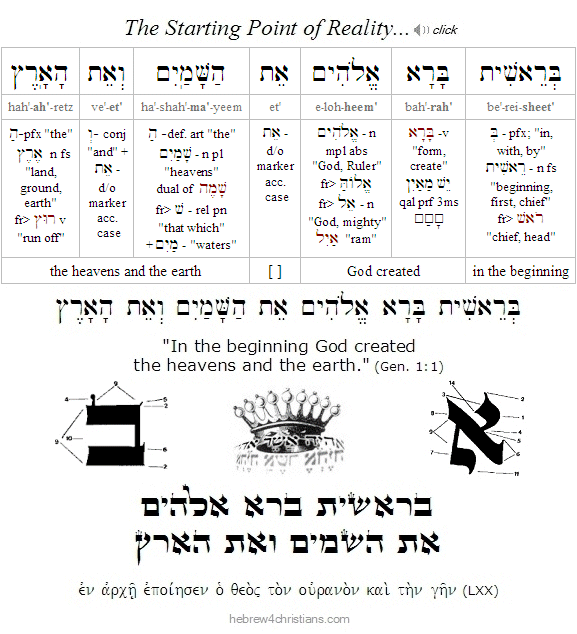 |
Spelling out "Bereshit"...
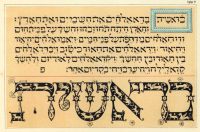
[ The following is related our Torah portion for this week, parashat Bereshit... ]
10.12.23 (Tishri 27, 5784) The 18th century Torah sage Vilna Gaon taught that the Hebrew word "bereshit" (בְּרֵאשִׁית), which is the very first word of the Bible, may be thought of as an acronym for meaningful spiritual life. The first letter, Bet (בּ), stands for bittachon (בִּטָּחוֹן), a word that means complete trust in God's love for your life; the next letter, Resh (ר), stands for ratzon (רָצוֹן), or the desire to live according to God's will; the central letter Aleph (א) stands for ahavah (אַהֲבָה), which is the love for God and for our fellow man (Deut. 6:5; Lev. 19:18); and the letter Shin (שׁ) is for shetikah (שְׁתִיקָה), or "keeping silent," which is the cardinal virtue of godly self-control and wisdom (James 1:26; 3:1-18; Psalm 34:13; Prov. 13:3, etc.). The letter Yod (י) is for yirah (יִרְאָה), or reverence for God's authority and dignity; and finally, the letter Tav (ת) is for Torah (תּוֹרָה), the study of which brings transformation and sanctity to your life (Psalm 19:7; 119:105; Prov. 6:23; Matt. 5:17-19; 2 Tim. 2:15-16).
Torah begins with the word 'bereshit' (בְּרֵאשִׁית), which may also be understood to say 'God created the world for the sake of the beginning.' All the Creator asks is that you make a beginning, that you turn in the right direction." Repent and believe -- what? Believe that you are loved, you need God's compassion and healing in your life... Indeed, we never really get past the first steps made in earnestness toward God. In that sense we are "always beginning," since we never get beyond the need of the heart to turn to God. We are all incomplete, awaiting the end for which we were created, and therefore we are always calling on the LORD, always abiding in Him, always seeking His face... We begin, we end, and in everything Yeshua is the Center of our hearts...
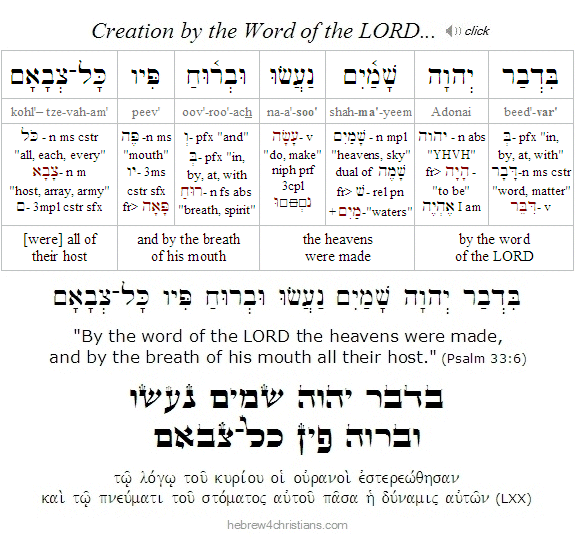 |
Alphabet and Creation...
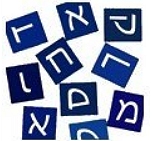
[ "A person has two eyes—one to see the greatness of G-d and the other to see his own smallness." - Menachem Mendel of Kotzk ]
10.11.23 (Tishri 26, 5784) The Torah begins with the letter Bet (בּ) rather than the letter Aleph (א) to denote God's humility. The letter Aleph is the first letter, the king of the alphabet, and the letter that begins "I AM" (i.e., אנכי) - the first word of the Ten Commandments. The letter Bet, on the other hand, is the second letter that means "house" or "home" (בּית). This suggests that the Torah begins with the focus not on the "I" but on creation, the household of God. And though God did not wish to be the center of attention, so to speak, Aleph and Bet together spell the word "father" (אב), that is, the One who oversees the household of the world in love. As it is written, "Every good gift and every perfect gift is from above, coming down from the Father of lights (אֲבִי הַמְּארוֹת) with whom there is no variation or shadow due to change" (James 1:17).
Aleph is a silent letter, representing God in His ineffable glory and life (אֶהְיֶה) that forever precedes all things (Isa. 44:6, cp. Rev. 22:13). Yeshua described Himself as the "Aleph and the Tav, the First and the Last" (הָאָלֶף וְהַתָּו הָראשׁ וְהַסּוֹף), the One who encompasses all Reality and gives out its strength (Aleph) before the house (Bet) of creation in sacrificial love.
Hebrew Lesson:
Psalm 100:5 Hebrew reading (click):
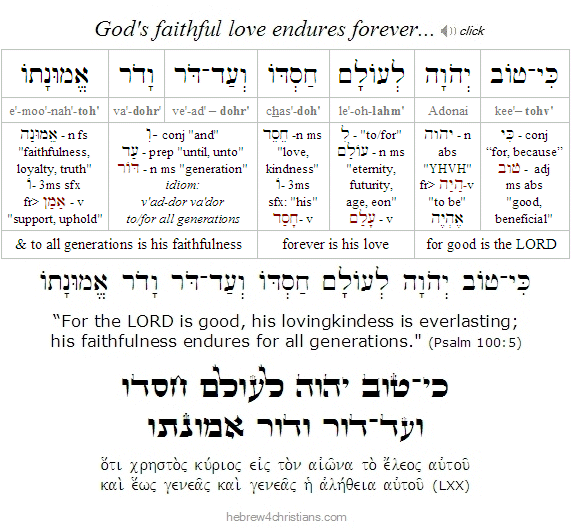 |
It may be wondered why we would say that God is humble... Well, it is certainly true that the LORD is self-effacing, self-forgetting, utterly unselfish, absolutely noble of heart, and so on. Moreover we are commanded to emulate God, who is merciful, gracious, slow to anger, abounding in steadfast love, etc. (Exod. 34:6-7). Most of all we are to follow the example of Yeshua, YHVH in the flesh, who willingly emptied Himself and took the role of a humble servant (Phil. 2:6-7). Yeshua himself said, "Take my yoke upon you, and learn from me, for I am gentle and lowly in heart, and you will find rest for your souls" (Matt. 11:29).
The Gospel in the Garden...
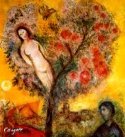
[ We always read parashat Bereshit on the Sabbath following the holiday of Simchat Torah, and therefore it begins the Torah reading sequence for the new Jewish year.... Right at the outset of the narrative of the Torah, then, we will read about the "proto-euangelion," or the "first gospel" message of God's redemption given through the Promised Seed of Eve... ]
10.11.23 (Tishri 26, 5784) The very first prophecy of the Torah concerns the promise of the coming "Seed of the woman" who would vanquish the serpent (nachash) that had originally tempted and deceived Eve (Gen. 3:15). This prophecy is sometimes called the proto-euangelion ("first gospel"), since it is the starting point of all subsequent prophecy and redemptive history revealed in the Scriptures. Indeed, since the mystery of the Incarnation of God the Son (the "Son of Man") is foreshadowed here, this prophecy is linked to the original woman, Eve. Just as Eve became a carrier of the corruption of human nature by heeding the voice of the tempter, so she would be the carrier of God Himself for the deliverance of mankind through the advent of the Redeemer. In the tragic aftermath of the transgression of the first man and woman, then, God first announced His unfailing redemptive love for the human race that would culminate in the birth, sacrifice, and resurrection of Yeshua our Savior and Deliverer - the One who was "born of a woman, born under the law" (Gal. 4:4).
Our restoration begins with God's love and passion. God's first question to Adam after he broke covenant was: "Where (אַיֶּכָּה) are you?" - the voice of a loving Father in search of his son (Gen. 3:9). Of course God knew exactly how his son was attempting to hide, though He almost acted as if He was unwilling to believe that he would betray his love by disobeying His commandment. Therefore God's poignant question was directed to Adam's heart: "Oh my son, how did you get to this place?" God was giving Adam an opportunity to turn back to Him, to confess the sin, to undergo teshuvah, to become reconciled... This is the necessary prelude to any honest relationship with God.
Recall that the original promise of the coming Savior was given within the context of the curse and judgment upon Satan: "I will put enmity between you and the woman, and between your seed and her seed; he shall crush your head, and you shall crush his heel" (Gen. 3:15). That God's promise was first directed to Satan is surely by design, since he "left his first estate" by becoming the "monster in the garden" and was therefore primarily responsible for the transgression of Adam and Eve in the first place (Ezek. 28:13-15,19). The promise delivered to Satan was therefore one of coming retribution and divine judgment: Evil would not have the last word in the matter of mankind, and therefore Satan's schemes would be avenged by God in the fullness of time (Gal. 4:4-5). Notice, however, that Adam and Eve were not yet judged for their sin when the LORD God gave the promise of the coming of the Redeemer. Before a word of judgment was directed toward them, God's love and light was already revealed. Indeed, immediately after their judgment was pronounced, "the LORD God made tunics of skin for Adam and his wife and clothed them" (Gen. 3:21) - a clear picture of being compassionately "robed in righteousness" imparted by an innocent sacrifice. The very first sacrifice recorded in the Torah - performed by God Himself - prefigured the coming redemption by the "seed of the woman" who would die as a substitutionary sacrifice for their sins, and therefore Yeshua is rightly called "the Lamb slain from the foundation (or beginning) of the world" (Rev. 13:8). This further explains why Eve's son (Abel) offered a blood sacrifice that was accepted by the LORD, whereas Cain's offering the "fruit of the earth" was rejected.
The very first prophecy of Torah therefore describes - in the most succinct form - the coming of the Savior and the great conflict of the ages. First, God declares that He would put enmity (אֵיבָה) between Satan and the woman. This enmity, or "hostile hatred," was based on the memory of Eve's misguided trust she evidenced in the garden. When Eve first sympathetically listened to the lies of the nachash (serpent), she immediately began her descent into exile and became a temptress herself. Her first step toward sin was a gullibility or openness that ultimately resulted in a lack of trust of God (which is part of the reason why we must be saved by trusting, as a "like-for-like" reversal of the original sin). At the very dawn of human history, then, we see that "truth" (אֱמֶת) apart from God (א) leads to death (מֵת). Eve was deceived because of Satan, but Adam deliberately chose to disobey God (2 Cor. 11:3; 1 Tim 2:14). In response to her teshuvah (repentance), God blessed Eve before He judged her by imparting to her a God-given hatred for Satan and his lies, as well as the promise that she would take part in the birth of the Savior of mankind. The first promise of the gospel, then, focused on the woman and her role in the coming redemption. Notice that Adam later renamed his wife Eve (i.e., Chavah: חַוָּה, the "mother of life") as an expression of his faith that the promised seed would come through her.
וְאֵיבָה אָשִׁית בֵּינְךָ וּבֵין הָאִשָּׁה
וּבֵין זַרְעֲךָ וּבֵין זַרְעָהּ
הוּא יְשׁוּפְךָ רֹאשׁ
וְאַתָּה תְּשׁוּפֶנּוּ עָקֵב
ve·ey·vah a·sheet be·ne·kha oo·vein ha·ee·shah
oo-vein zar·a·kha oo-vein zar-ah
hoo ye·shoof-kha rosh
ve·a·tah te·shoo·fen'·noo a·keiv

I will put enmity between you and the woman,
and between your offspring and her offspring;
he shall crush your head, and you shall crush his heel."
(Gen. 3:15)
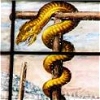
Hebrew Lesson:
Genesis 3:15b Hebrew reading (click):
Eve might have initially believed that her firstborn son Cain (קַיִן) was the promised Seed himself. After all, the miracle of birth surely came as a great shock to her, and Eve's faith in God's promise that through her seed would come the deliverer was doubtlessly upon her heart at this time. When Eve called her son "Cain" (wordplay from the verb kana (קָנָה), "to get"), she was expressing her faith in God's promise: קָנִיתִי אִישׁ אֶת־יהוה / kaniti ish et-Adonai, "I have gotten a man - namely, the LORD" (Gen. 4:1). Eve's faith was obscured by the translators, however, who rendered the Hebrew as "I have gotten a man with the help of the LORD" (i.e., they inserted the idea of "help" and translated the particle et (את) as "with" rather than as the direct object marker for the verb). The ancient Jewish targums, however, agree with the original Hebrew. For example, Targum Yonatan reads: "I have gotten a man - the Angel of YHVH." Surely Eve, the first mother of humanity, was endowed with great wisdom from God, especially after she turned to Him in repentance after her disobedience. The straightforward reading of her words, then, expressed her hope that the LORD Himself would be made a man...
Despite her hope that Cain was none other than the God-Man and promised Deliverer, Eve's hopes were dashed when it became clear that her son was of the seed of Satan (1 John 3:12). His younger brother Abel (הֶבֶל) was a shepherd who evidenced faith in the promise of the coming redeemer by offering blood sacrifice (Gen. 4:3-5). Abel was persecuted and finally murdered by his brother Cain "because his own deeds were evil and his brother's righteous." Their spiritual conflict is indicative of the ongoing warfare between the "sons of darkness" and the "sons of light."
The murder of Abel necessitated that the coming seed would descend through another child, and therefore the Torah describes the birth of Seth (שֵׁת, lit. "appointed"), the third son of Adam and Eve. The Scriptures further state that it was the descendants of Seth who "began to call upon the Name of the LORD" (לִקְרא בְּשֵׁם יהוה), indicating that they had faith in God (אֱלהִים) as the Compassionate Covenant Keeper (יהוה) who would redeem humanity by means of the coming seed. Seth called his firstborn son Enosh ("man"), perhaps in the hope that his child would be the promised Savior (interestingly, bar enosh (בַּר אֱנָשׁ), or "Son of Man," is the name for the Savior (Dan 7:13).
To continue reading see:
"The Gospel in the Garden: Further thoughts on parashat Bereshit."
Shavuah Tov Audio Podcast:
The Gospel in the Garden...
click for larger Sukkot 5784 photos:
|


























